Sites: news | india | latam | brasil | indonesia
Feeds: news | india | latam | brasil | indonesia
topic: Carbon Offsets
Social media activity version | Lean version
Multilateral development banks must prioritize clean & community-led energy projects (commentary)
- Multilateral Development Banks (MDBs), governments, and corporations across 160 countries consider or approve more than one investment per day in the energy sector.
- Despite commitments to tackle the climate crisis, many of these investments support the fossil fuel industry, while others invest in false clean energy solutions like hydropower which often cause harm to local communities.
- “To achieve a just energy transition, MDBs and governments must prioritize sustainable renewable energy models that empower communities and ensure inclusive energy access,” a new op-ed argues.
- This post is a commentary. The views expressed are those of the authors, not necessarily Mongabay.
Land tenure lesson from Laos for forest carbon projects (commentary)
- Laos has lost approximately 4.37 million hectares of tree cover since 2001, and some suggest forest carbon projects could be a solution.
- However, these haven’t had a good track record in the nation, in part due to its land tenure rules — land is owned by the state but largely used by local communities through customary tenure arrangements — leading to misunderstandings between companies, communities, and government agencies.
- “Forest carbon projects should continuously engage in capacity-building for local communities and authorities, thus creating an enabling environment for just benefit-sharing, securing land tenure, and the sustainability of these projects to reduce emissions over the long term,” a new op-ed argues.
- This post is a commentary. The views expressed are those of the authors, not necessarily Mongabay.
Are biodiversity credits just another business-as-usual finance scheme?
- There’s a new emerging innovative finance scheme to support biodiversity conservation: voluntary biodiversity credits. These are meant to be purely voluntary, “positive investment” in nature by the private sector and, in theory, should not be used to offset damage elsewhere.
- But several Indigenous and environmental groups and researchers worry that, like the voluntary carbon credit market, a voluntary biodiversity market could end up being used for offsets, allowing companies and governments to continue business as usual.
- Critics also say there is lack of a clear demand for such credits from the private sector, and a voluntary biodiversity credit market won’t be a sustainable solution at a global scale.
- Indigenous and local communities have the potential to financially benefit from these biodiversity credit projects, which are likely to target their lands. But experts point out the need to first fix several fundamental problems that have already emerged in the carbon credit market, from the lack of land rights among Indigenous communities to unscrupulous middlemen, unjust contracts and dilution of funds.
UN probes controversial forest carbon agreement in Malaysian Borneo
- The government of Sabah state in Malaysian Borneo will continue to move forward with an opaque nature conservation agreement despite concerns raised by the United Nations.
- In a letter, the U.N. calls in question the transparency of the agreement and the state’s approach to the human rights law principle of free, prior and informed consent.
- The agreement was signed by state officials and a representative of a Singaporean company in 2021. Shortly after news of the deal became public, some Indigenous groups in the state said they hadn’t been consulted or informed about the deal covering 2 million hectares (4.9 million acres) of the state’s forests.
- The U.N. letter was written by a group of “special procedures experts” with mandates established by the U.N. Human Rights Council, including the special rapporteurs on the rights of Indigenous peoples, on human rights and the environment, and on the right to development.
New report details rights abuses in Cambodia’s Southern Cardamom REDD+ project
- Human Rights Watch has detailed forced evictions, property destruction and violence against Indigenous communities living within a REDD+ carbon offset project area in southwest Cambodia.
- Trade of carbon credits from the Southern Cardamom REDD+ project were suspended last year amid similar allegations, and the project’s carbon certifier recently announced it’s expanding its ongoing investigation.
- Residents told Mongabay that Wildlife Alliance, the NGO that manages the project, has effectively outlawed their traditional methods of farming and livelihood, including restricting their access to sustainable forest products.
- Wildlife Alliance has denied the allegations, suggesting HRW has an agenda against carbon offsetting projects, but says it’s making improvements in response to the allegations.
Global conference to accelerate nature-based solutions: Q&A with Self Help Africa’s Patricia Wall
- This week, more than 150 conservation and community organizations, experts and policymakers are gathering in Zambia for the Accelerating Nature-based Solutions conference.
- Discussions will dive deep into critical issues and concerns regarding nature-based solutions and the roles of agroforestry, farmer-managed natural regeneration and wildlife conservation in NbS.
- The conference will also address the issue of carbon offsetting and greenhouse gas emissions, and the need to safeguard the rights of local communities or Indigenous communities when implementing nature-based solutions.
What principles should define natural climate solutions? A new study has some answers
- The increased popularity of natural climate solutions (NCS), which aim to protect and restore natural ecosystems to address climate change, has resulted in misunderstandings and confusion around what constitutes such a solution.
- Researchers distill five foundational principles of natural climate solutions and 15 operational principles to guide their implementation; among others, the principles include equity, emphasizing the need for practitioners to respect human rights and self-determination of Indigenous peoples.
- Researchers argue that natural climate solutions that adhere to these principles are durable and effective in tackling climate change in the long run, resulting in widespread adoption.
- While experts agree that the outlined principles reduce confusion and spur climate action, they call for tightening the definitions of some principles to strengthen the proposed framework.
Markets and forests: 7 takeaways from our series on the forest carbon trade
 This is the wrap-up article for our five-part series on forest carbon credits and the voluntary market. Read Part One, Part Two, Part Three, Part Four and Part Five. Mongabay recently published a five-part series on the carbon trade and its use as a tool to address climate change. The exchange of carbon credits, typically […]
This is the wrap-up article for our five-part series on forest carbon credits and the voluntary market. Read Part One, Part Two, Part Three, Part Four and Part Five. Mongabay recently published a five-part series on the carbon trade and its use as a tool to address climate change. The exchange of carbon credits, typically […]
The future of forest carbon credits and voluntary markets
- Observers predicted that 2023 would be a “make-or-break” year for voluntary carbon markets and “an inflection point” for their role in addressing climate change and global deforestation.
- Amid criticisms around carbon accounting, carbon neutrality claims, and issues with forest communities, governance bodies say they’ve worked to increase consistency and “integrity” for the voluntary carbon market and specifically the forest conservation strategy known as REDD+.
- Concerns remain from a variety of observers, including those who say the focus of credit-buying companies should be on eliminating their carbon emissions from across their entire suite of operations.
- But proponents of markets say that while decarbonizing is absolutely necessary to minimize the rise in global temperatures, the carbon trade allows for the mitigation of pesky residual emissions that it’s either impossible or too expensive to get rid of at this point.
Leveraging the hypothetical: The uncertain world of carbon credit calculations
- Criticisms of the voluntary carbon trade and forest conservation strategies like REDD+ have centered largely on the carbon accounting methods used to calculate credits.
- Each credit traded on voluntary markets is supposed to represent the reduction, avoidance or removal of 1 metric ton of carbon dioxide from the atmosphere.
- But recent science has raised questions about how REDD+ and other types of project figure out the number of tons of emissions saved.
- The process relies on establishing a baseline rate of deforestation against which a project’s emissions-reducing or -removing success is measured. But critics say the process can be faulty and that the conflicts of interest of the parties involved in setting the baseline have not been addressed until recently.
‘Cowboys’ and intermediaries thrive in Wild West of the carbon market
- A host of different players have crowded into the voluntary carbon trade as its value has grown.
- Motivated by the potential for profit, a concern for climate change or some combination of the two, these companies and organizations link the credits generated by projects, such as those that fit in the forest conservation scheme known as REDD+, with buyers, often companies and individuals in the Global North looking to compensate for their climate impacts.
- Some groups say they help shoulder the burden of tasks like marketing so that the communities and project staff on the ground can focus on the “change-making work.”
- But others, sometimes called “carbon cowboys,” seem interested in the money to be made from trading carbon. Some have faced allegations that they don’t bring the necessary expertise to their work, or that they don’t adequately inform local communities about the intended projects and the potential pitfalls.
How will we know when local communities benefit from carbon offset schemes? (commentary)
- Carbon credit schemes face a crisis of legitimacy and often struggle to demonstrate the support of communities who must forgo land uses not compatible with the production and retention of carbon.
- At the very least, such projects should not negatively impact affected communities, but community support is also not a simple matter of just obtaining free prior and informed consent (FPIC), but rather it is a matter of building relationships and assessing impacts on communities over the life of such projects, which can span generations.
- “We have proposed a framework for measuring, assessing, and improving community benefits and impacts from carbon projects [which] includes a subjective data collection survey instrument that measures holistic well-being as a critical measure of community well-being in climate projects,” the authors of a new op-ed write.
- This post is a commentary. The views expressed are those of the authors, not necessarily Mongabay.
Do carbon credits really help communities that keep forests standing?
- Communities play a critical role in REDD+, a forest conservation strategy that aims to reduce emissions that can be sold as credits to raise money for forest protection.
- REDD+ projects often include components for the benefit of the communities, such as a focus on alternative livelihoods and provision of health care and education.
- But reports that REDD+ communities have faced abuses and rights violations have emerged recently in connection with high-profile REDD+ projects.
- Several Indigenous-led organizations have voiced their support for REDD+ because, they say, it provides an avenue to fund their climate-related conservation work, while other groups say it’s not the answer.
False claims of U.N. backing see Indigenous groups cede forest rights for sketchy finance
- Several companies registered in Latin American countries claiming to have U.N. endorsement have persuaded Indigenous communities to hand over the economic rights to their forests for decades to come, a Mongabay investigation has found. The companies share commercial interests across various jurisdictions, and have not been able to demonstrate experience in sustainable finance projects.
- Indigenous communities in Peru, Bolivia and Panama were promised jobs and local development projects in exchange for putting on the market more than 9.5 million hectares (23.5 million acres) of forests. According to community sources, the claims of U.N. backing were the main selling point for agreeing to put their forests on the market. All three U.N. entities cited by the companies have rejected any involvement.
- Mongabay has found that the methodology employed for valuing natural capital has not been used before; there are no public details regarding its scientific and technical basis; and the company that created the methodology refused to share information about it.
- Experts have raised concerns that a lack of regulation in the fast-growing sustainable finance industry is allowing abuses against communities that act as guardians for critical ecosystems.
Forest carbon credits and the voluntary market: A solution or a distraction?
- Voluntary carbon markets and forest carbon credits have faced widespread criticism that reached a zenith in 2023.
- Media reports detailed concerns about their dubious climate benefits, respect for communities and land rights, and their use by Global North companies to avoid the difficult task of decarbonizing their operations.
- Supporters of forest conservation strategies like REDD+ say that they can and should play a role, as healthy forests can absorb a significant amount of atmospheric carbon. They also say REDD+ brings much-needed funding to protect and restore forests, not only for their carbon, but because of the biodiversity and communities they support.
- As 2023 draws to a close, and with it the U.N. climate conference in Dubai (COP28), proponents of the voluntary carbon trade are working to increase the “integrity” of markets in ways they hope make them a viable tool to deal with climate change.
Indigenous-led coalition calls for moratorium on terrestrial carbon trade
- The Pathways Alliance for Change and Transformation (PACT), a coalition of Indigenous, community and nonprofit organizations, published a paper in September 2023 calling for a moratorium on the forest carbon trade out of concern for the rights of Indigenous peoples and local communities.
- PACT says a pause in selling carbon credits is needed until protections for the land rights of these communities are laid out “explicitly, proactively, and comprehensively.”
- In December at the U.N. climate conference in Dubai, carbon markets experienced a setback after negotiators failed to agree on texts to articles in the 2015 Paris climate agreement meant to guide the carbon trade.
The year in rainforests: 2023
- The following is Mongabay’s annual recap of major tropical rainforest storylines.
- While the data is still preliminary, it appears that deforestation declined across the tropics as a whole in 2023 due to developments in the Amazon, which has more than half the world’s remaining primary tropical forests.
- Some of the other big storylines for the year: Lula prioritizes the Amazon; droughts in the Amazon and Indonsia; Indonesia holds the line on deforestation despite el Niño; regulation on imports of forest-risk commodities; an eventful year in the forest carbon market; rainforests and Indigenous peoples; and rampant illegality.
New dams in Cambodia pit ‘green’ hydropower against REDD+ project
- The recent approval of two hydropower dams in Cambodia’s Cardamom Mountains could undermine a REDD+ carbon project in the area.
- The Southern Cardamom REDD+ Project relies on keeping the forests in this region standing — a goal researchers say is “completely incompatible” with the forest clearing and flooding necessitated by the new dams.
- The lack of transparency inherent in both the carbon market and the Cambodian government means that the fate of the Cardamoms remains unclear for now.
COP28 ‘breakthrough’ elevates litigation as vital route to climate action
- In the past three decades, the United Nations has sponsored 28 annual climate summits. But that process has failed to provide a legally binding path to significant carbon emission reductions or to the phaseout of fossil fuels responsible for the climate crisis.
- The just concluded COP28 summit, held in Dubai and largely controlled by fossil fuel interests, has pledged “transitioning away from fossil fuels” but that deal is also voluntary. Now, with the world on track for catastrophic global warming, litigation is increasingly being used to force governments to regulate fossil fuels and enforce existing laws.
- Thousands of climate-related lawsuits are underway to reduce emissions, stop drilling or gain compensation for the Indigenous and traditional peoples who are the most vulnerable to climate impacts.
- But despite some court wins for the environment, the litigation process is slow and unlikely to achieve major results in time to staunch fast-moving warming. Even when lawyers do win climate suits, there is no guarantee governments or corporations will obey judicial decisions.
At COP28 & beyond, fair carbon markets must be part of the climate finance solution (commentary)
- As COP28 gets underway, carbon markets and credits are under fire due to claims about corporate greenwashing and convoluted carbon accounting metrics.
- At the same time, political will and climate finance remain in short supply, hindering progress toward reaching global climate goals.
- A new op-ed argues that fair carbon pricing and equitable, transparent carbon markets represent part but not all of the climate finance solution: governments, NGOs, local communities and the corporate sector must work together in good faith toward reaching emission reduction targets.
- This post is a commentary. The views expressed are those of the authors, not necessarily of Mongabay.
How Indigenous peoples and local communities can make the voluntary carbon market work for them (commentary)
- The voluntary carbon market has the potential to address $4.1 trillion in nature financing gap by 2050 and support Indigenous peoples and local communities — when done right, argue a cohort of Indigenous leaders in a new commentary.
- The voluntary carbon market can work for and support Indigenous peoples and local communities (IPs and LCs), and them for it, but these communities have not been adequately engaged or consulted to participate in this carbon market.
- The Indigenous leaders announce the new IPs and LCs Voluntary Carbon Market Engagement Forum that is taking shape and will try to address these IPs and LCs’ priorities. The Forum is now coordinating open calls for Governing Board members and Forum partners.
- This post is a commentary. The views expressed are those of the author, not necessarily Mongabay.
U.N. carbon trading scheme holds promise and peril for tropical forests
- Suriname is one of the first countries to announce it aims to use emissions reduction results through a forest conservation scheme known as REDD+ to trade almost 5 million carbon credits underArticle 6 of the Paris Agreement.
- Article 6 of the agreement establishes a framework for emissions trading through market and non-market mechanisms, which are poised to play a central role in delivering the pledged emissions cuts of many countries.
- Around 85% of countries that signed the 2015 Paris Agreement have indicated their intent to use international carbon markets to achieve their updated or new emissions reduction targets.
- While some experts see Article 6 as a valid way to channel finance into REDD+, others are wary that it could compromise the integrity of the system.
Can impermanent carbon credits really offset forever emissions?
- A team of researchers has put forth a method that they say makes it possible to compare credits for carbon from forests projects against more permanent storage solutions.
- The carbon emissions that these credits are meant to offset can last for hundreds, if not thousands, of years in the atmosphere. Forests, by comparison, are subject to fires, disease and deforestation, meaning that their climate benefits can be more temporary than longer-term solutions, such as direct air carbon capture.
- By “discounting” the credits from forest carbon projects based on conservative upfront estimates of how long a forest will safeguard or sequester carbon, the authors say that “like-for-like” comparisons would be possible.
- The team published their work Oct. 30 in the journal Nature Climate Change.
Jurisdictional REDD+ ready to fund forest-positive, socially-inclusive development in the Amazon and beyond (commentary)
- Jurisdictional REDD+ (JREDD) is designed to fund regional transitions to forest-positive, socially-inclusive rural development. It is fundamentally different than private forest carbon projects, which have come under scrutiny for overstating their climate benefits.
- JREDD rewards forest carbon emissions reductions already achieved across entire jurisdictions–states and nations–and provides a platform for the full participation of Indigenous peoples, local communities and farmers; it features a leadership role for governments that are becoming more transparent and inclusive in the process.
- The steep decline in deforestation in the Brazilian Amazon means that several states are poised to issue a large volume of high-integrity, verified JREDD credits from 2024 onward. If the demand for these credits is sufficient, sales revenues could help states tame extensive forest frontiers with transparency and accountability, inspiring other regions to do the same.
- This post is a commentary. The views expressed are those of the author, not necessarily Mongabay.
Control of Africa’s forests must not be sold to carbon offset companies (commentary)
- A forest carbon deal between Blue Carbon and the nation of Liberia would give the company exclusive rights to control 10% of the nation’s land mass for 30 years.
- Blue Carbon has also signed MOUs for similar deals with Tanzania and Zambia (and others) and combined with the Liberia deal, the land controlled by the company in these three African nations represents an area the size of the whole of the United Kingdom.
- “Carbon colonialism is a false solution to the climate crisis,” a new op-ed states. “The only real answer is to end our fossil fuel addiction by dramatically reducing our emissions, while financially supporting countries and local communities to protect their forests, rather than wrest control of them.”
- This post is a commentary. The views expressed are those of the author, not necessarily Mongabay.
Carbon counting without the guesswork: Q&A with FCL proponent Jerry Toth
- REDD+ projects aim to incentivize efforts that maintain standing forests, rather than cutting them down, by providing payments based on the carbon emissions kept out of the atmosphere.
- But REDD+, which is short for “reducing deforestation and forest degradation in developing countries,” has been widely criticized lately, in part because skeptics say that the accounting methods are open to manipulation by developers aiming to sell more credits — credits that many not represent a verifiable climate benefit.
- One alternative is the forest carbon ledger (FCL). FCL seeks to value the total amount of carbon in a forest and would provide payments based on how well that storage is maintained over time.
- Mongabay spoke with Jerry Toth, co-founder of a conservation group working to protect and restore the last remaining remnants of the Pacific Forest of Ecuador called the Third Millennium Alliance (TMA). Toth said FCL may provide a more robust alternative to REDD+ carbon accounting.
Is ocean iron fertilization back from the dead as a CO₂ removal tool?
- After a hiatus of more than 10 years, a new round of research into ocean iron fertilization is set to begin, with scientists saying the controversial geoengineering approach has the potential to remove “gigatons per year” of carbon dioxide from Earth’s atmosphere.
- The idea behind ocean iron fertilization is that dumping iron into parts of the ocean where it’s scarce could spark massive blooms of phytoplankton, which, when they die, can sink to the bottom of the sea, carrying the CO₂ absorbed during photosynthesis to be sequestered in the seabed for decades to millennia.
- So far, proof that this could work as a climate-change solution has remained elusive, while questions abound over its potential ecological impacts.
- Scientists with the Woods Hole Oceanographic Institution in Massachusetts, U.S., recently received $2 million in funding from the U.S. government that will enable computer modeling research that could pave the way for eventual in-ocean testing, effectively reviving research into ocean iron fertilization.
Forests hold massive carbon storage potential — if we cut emissions
- A new study finds forests could potentially store 226 billion metric tons of carbon if protected and restored, or about one-third of excess emissions since industrialization.
- Nearly two-thirds of this potential lies in conserving and letting existing forests mature.
- The authors say that restoring deforested areas through community-driven approaches such as agroforestry and payments for ecosystem services is essential.
- Planting trees can’t replace cutting fossil fuel emissions, as climate change threatens forests’ carbon uptake.
Can carbon markets solve Africa’s climate finance woes?
- The African Carbon Markets Initiative, a consortium of Global North donors, corporate representatives, conservation groups and energy lobbyists, is pushing to expand carbon markets on the continent.
- The effort has gained the vocal support of Kenyan President William Ruto, along with a number of other African heads of state, who see carbon markets as a way to generate badly needed climate finance.
- But African environmental groups have sharply criticized carbon markets, saying they represent a “false solution” to the climate crisis and will mostly enrich bankers and traders based outside the continent.
- The drive to scale up carbon markets in Africa and elsewhere is set to be a major agenda item at this month’s COP28 climate summit in Dubai.
Critical questions remain as carbon credit deal in Sabah presses forward
- Details around a secretive “nature conservation agreement” signed in 2021 between a Singaporean company and the government of Sabah, a Malaysian state on the island of Borneo, remain elusive.
- Several internationally known companies that work in climate mitigation have said they’re not affiliated with the agreement, despite implications by Jeffrey Kitingan, a deputy chief minister and the deal’s primary backer, that they are involved.
- Kitingan also revealed that Hoch Standard, the Singaporean company, is controlled by a single director through another company registered in the British Virgin Islands.
- Kitingan said the project is moving forward, leading to renewed calls from civil society, Indigenous and research organizations for the release of more details about the agreement.
New Paraguay law aims to improve carbon credit market
- A new law in Paraguay creates a more organized, transparent carbon credit system but might also complicate the way credits are bought and sold.
- The law creates a registry for carbon credit projects and ensures land isn’t being assigned more than once.
- The Gran Chaco, South America’s second-largest forest, has been of particular interest to the carbon credit market, as there are concerns about deforestation in the area.
As companies buy ‘plastic credits,’ are they reducing waste or greenwashing?
- Companies and other entities are buying “plastic credits” allowing them to offset every ton of plastic they make with an equivalent amount of plastic waste collected and taken out of the environment elsewhere — often in poor nations lacking waste management programs. Several organizations now offer credits and will certify plastic collection and reuse.
- No worldwide standards or regulations govern the use of these plastic credits or assure their reliability, nor what gets done with the collected waste. Verra, which runs the world’s largest carbon credit verification system, but has come under fire for that system’s poor verification record, recently launched its own plastic credits verification system.
- Skeptics warn the plastic credit systems being created by various organizations, rather than recycling significant plastic waste, merely amount to greenwashing and allow companies to continue to make and use polluting materials, while running PR campaigns to make themselves look environmentally responsible.
- The credit system at best only deals with waste already manufactured and thrown out; it doesn’t address the need to ban the most toxic plastics, reduce production of others, or replace disposable single-use plastic with eco-friendly or reusable materials. Verra is urging that plastic credits become part of the U.N. global plastics treaty currently under negotiation.
Indonesia opens carbon trading market to both skepticism and hope
- Environmentalists have criticized Indonesia’s carbon trading mechanism, which had its first day of trading Sept. 26.
- The government touts the mechanism as a way to curb emissions and attract climate funding, but critics call carbon trading a false solution to climate change and a greenwashing attempt.
- Environmentalists say carbon trading could discourage companies from outright reducing emissions, enabling a “business as usual” attitude in which people and companies could buy carbon credits to continue polluting instead of changing their behaviors.
- A recent analysis by The Guardian and researchers from Corporate Accountability found that most of the top 50 emission offset projects — those that have sold the most carbon credits in the global market — were likely junk or worthless.
Beyond ‘no,’ more positive visions for conservation need communication (commentary)
- “I have become increasingly concerned that [environmentalists’] ongoing failures stem at least partially from really bad messaging,” a new op-ed states.
- “We are so focused on being against things that we keep missing an opportunity to be for something…We desperately need new climate-friendly visions for our economies and governance systems that we can all get behind, not just a laundry list of what not to do,” the Cambridge scholar continues.
- Some environmentalists are starting to push more positive communications and the development of transformative visions for conservation, such as developing “socio-bioeconomies” to replace existing economic models.
- This post is a commentary. The views expressed are those of the author, not necessarily of Mongabay.
How nonprofit journalism revealed many problems with the UN’s climate neutrality claims
- Despite claiming to be 95% “climate neutral,” the United Nations — a long-standing and vocal proponent of climate action — isn’t, a new report has found.
- Mongabay teamed up with reporters at The New Humanitarian in a yearlong investigation spanning multiple countries to investigate the U.N.’s claims.
- The investigation found that many projects that issue carbon credits to the U.N. were linked to environmental damage or displacement, and 2.7 million out of 6.6 million credits were linked to wind or hydropower — which experts say don’t represent true emissions reductions.
- Investigative reporter Jacob Goldberg from The New Humanitarian joins the podcast to explain how the team arrived at these surprising findings.
World owes it to Tanzania to keep Eastern Arc forests standing, study shows
- Tanzania’s Eastern Arc’s evergreen forests provide carbon sequestration that the world benefits, yet it’s local communities alone who shoulder the costs of keeping the forests standing.
- The authors of a new study recommend that international investments in conservation within the Eastern Arc worth $2 billion need to be made over the next 20 years.
- Without this, the authors say, the mountains’ forests and their extraordinary levels of biodiversity will be lost or degraded as local communities convert them to agricultural land or harvest timber from them.
Revealed: Why the UN is not climate neutral
- The UN has long championed the need for urgent climate solutions. It has claimed to be at least 95% “climate neutral” every year since 2018, largely through the use of carbon credits.
- The New Humanitarian teamed up with Mongabay to investigate the UN’s claims of climate neutrality. In an investigation that took a year and spanned multiple countries, reporters obtained details about carbon credits purchased by 33 UN entities, representing more than 75% of its reported offset portfolio since 2012.
- More than a dozen of the projects that issued the UN’s carbon credits were linked to reports of environmental damage, displacement, or health concerns. Others were deemed worthless by a number of leading climate experts.
Brazil cap-and-trade carbon framework in sight, but agriculture gets a pass
- Brazil’s Senate is expected to vote this month on a bill introducing a cap-and-trade carbon market aimed at regulating industry emissions.
- Thousands of companies across most sectors would have their carbon emissions capped at 25,000 metric tons per year; notably, however, this doesn’t include the agricultural sector, Brazil’s leading cause of deforestation and emissions.
- The bill also aims to combat unethical carbon credit practices by giving Indigenous and traditional communities the right to generate and sell credits on their territories.
- The bill is widely regarded as the best yet for a regulated carbon market; however, experts say it’s overly focused on carbon credit generation and fails to encourage the discontinuation of fossil fuel use, while also potentially putting “tremendous pressure” on Indigenous territories.
Cambodia approves, then suspends, marble mine in Keo Seima REDD+ project
- The Cambodian government has suspended a planned marble mine inside a wildlife sanctuary that it had approved just months earlier.
- It’s not clear why this commercial extractive concession inside a protected area was approved in the first place, or why it’s now been suspended (but not canceled).
- The mine would have threatened an important REDD+ project in Keo Seima Wildlife Sanctuary that benefits both local communities and the area’s biodiversity.
- The REDD+ project is also a bulwark against deforestation; satellite data show it suffers far less forest loss than other parts of the wider wildlife sanctuary and surrounding areas that overlap with concessions.
What would it cost to protect the Congo Rainforest?
- The Congo Basin holds the world’s second-largest rainforest — the majority of which is in the Democratic Republic of Congo (DRC) — playing a vital role in carbon storage and ecological services that millions of people and species rely upon.
- However, the DRC is a nation with the second-highest rate of tropical deforestation behind Brazil. Meanwhile, Gabon says it has acted to protect its forests but hasn’t reaped the promised rewards.
- International commitments to protect the Congo Rainforest are historically meager compared with what experts say is actually needed, and many of these commitments go unfulfilled.
- On this episode of Mongabay Explores the Congo Basin, we speak with experts about what’s needed to overcome hurdles to financing forest protection to benefit conservation, climate and communities: Paolo Cerutti, senior scientist and DRC unit head at the Center for International Forestry Research (CIFOR-ICRAF); Chadrack Kafuti at Ghent University; Wahida Patwa Patwa-Shah, senior regional technical specialist, UNDP Climate Hub; and Lee White, minister of water, forests, the sea and environment in Gabon.
REDD+ projects falling far short of claimed carbon cuts, study finds
- New research reveals that forest carbon credits are not offsetting the vast majority of emissions that providers claim.
- A team of scientists looked at 26 REDD+ deforestation-prevention project sites on three continents, leading to questions about how the developers calculate the impact of their projects.
- The researchers found that about 94% of the credits from these projects don’t represent real reductions in carbon emissions.
- Verra, the world’s largest carbon credit certifier, said the methods the team used to arrive at that conclusion were flawed, but also added it was in the process of overhauling its own REDD+ standards.
Macron touts forest conservation while promoting gas project on PNG visit
- During a recent visit to Papua New Guinea, French President Emmanuel Macron spent time with both fossil fuel executives and conservationists.
- Macron attended a presentation on the Managalas Conservation Area, which is supported by France as well as other European countries, and praised Indigenous peoples’ protection of the forest.
- During Macron’s visit, French firm TotalEnergies voted to undertake construction of a $10 billion liquefied natural gas project that will release an estimated 220 million metric tons of carbon dioxide.
Massive carbon offset deal with Dubai-based firm draws fire in Liberia
- According to a draft contract seen by Mongabay, Liberia may sign away the rights to nearly 10% of its total land mass to a United Arab Emirates-based firm for carbon offset development.
- The firm is owned by Ahmed Dalmook Al Maktoum, the youngest member of Dubai’s royal family and an investor in energy projects across Africa and the Middle East.
- Environmental groups in Liberia say the deal could violate multiple laws, including those meant to protect community land rights.
- The deal comes as the UAE prepares to host the COP28 climate conference, where rulemaking around carbon markets will be a hot agenda item.
In Sabah, natural capital agreement surfaces again, despite critics
- In October 2021, an agreement signed without public knowledge by members of the Sabah state government, a Singaporean firm and an Australian consultancy committed 2 million hectares (4.9 million acres) of land in the Bornean state to a 100-year carbon deal.
- Since Mongabay surfaced news of the agreement in November 2021, the project has stalled in the face of a wave of criticism about its origins and planned implementation.
- In recent weeks, the proponents of the deal, including Sabah’s Deputy Chief Minister Jeffrey Kitingan, have publicly resumed efforts to bring the agreement into force.
- Civil society groups opposed to the project say that concerns remain over Indigenous rights and lack of transparency or details about the planned project.
Forest campaign group renews charge that carbon credit verification schemes are flawed
- A new assessment conducted by Rainforest Foundation UK raises fresh concerns about the validity of carbon offsetting schemes.
- The campaign group claims that all the leading carbon credit verification schemes have allowed millions of credits to enter the voluntary carbon market which do not accurately represent reductions in greenhouse gas emissions.
- RFUK is calling for a shift in emphasis to measures like global carbon levies and debt relief for poor countries, which it says would address root causes of emissions.
- Verra and several REDD+ project managers told Mongabay RFUK’s analysis is ideologically motivated, insisting that while verifying credits is not perfect, it is producing genuine, positive results.
Genetically engineered trees stoke climate hope — and environmental fears
- U.S. climate technology startup Living Carbon has been developing genetically engineered poplar trees that it says can absorb more carbon – a potential tool in the climate crisis.
- Some experts say the company lacks long-term field data and is rushing to commercialize its “supertrees,” potentially putting other species at risk.
- Despite such concerns, Living Carbon is going ahead and planting mixed forests that include its GE trees, funded by carbon offsets.
Blue carbon deserves a green light for the climate fight (commentary)
- Marine habitats like mangrove forests, seagrass meadows, salt marshes, and kelp forests cover just 0.2% of the ocean surface and provide shelter & food for myriad life forms while containing 50% of the carbon sequestered in marine sediments.
- Yet at a time when the world needs to keep carbon sequestered to mitigate the effects of climate change, about 35% of the world’s mangroves and 30% of all seagrass meadows have been lost or degraded.
- A new op-ed argues that the world should be moving to reverse these trends: “We are currently throwing away a golden opportunity to tackle the climate crisis, bolster sustainable fisheries and allow wildlife to thrive.”
- This article is a commentary. The views expressed are those of the author, not necessarily of Mongabay.
As one Brazilian state takes up carbon trading, others may fall for the ‘illusion’
- A recent agreement will allow the Brazilian state of Tocantins to sell carbon credits to Swiss oil-trading company Mercuria.
- Proponents see the deal as an opportunity for Tocantins to obtain financial resources that will support the state’s environmental policies.
- However, carbon offsets are hotly debated and many experts say the carbon market does more harm than good for the environment and global greenhouse gas emissions.
- The deal is likely to have a ripple effect on surrounding Amazonian states, experts say, leading to future carbon offset deals and prolonging the global use of fossil fuels.
Microbes play leading role in soil carbon capture, study shows
- Soil is a significant carbon reservoir, storing more carbon than all plants, animals and the atmosphere combined, making it crucial for addressing the climate crisis.
- Microbes, such as bacteria and fungi, are the primary drivers of carbon storage in soil, surpassing other soil processes by a factor of four, according to a new study in Nature.
- The efficiency of microbial metabolism plays a vital role in determining the amount of organic carbon stored in soils worldwide, according to the research, which also calls for improved soil carbon models for effective policies and climate solutions.
- Enhancing microbial efficiency can lead to increased carbon storage in soils, but further research is needed to understand how to achieve this.
Mycorrhizal fungi hold CO2 equivalent to a third of global fossil fuel emissions
- A recent study estimates that more than 13 billion metric tons of CO2 from terrestrial plants are passed on to mycorrhizal fungi each year, equivalent to about 36% of global fossil fuel emissions.
- The study highlights the overlooked role of mycorrhizal fungi in storing and transporting carbon underground through their extensive fungal networks
- Researchers analyzed nearly 200 data sets from various studies that traced carbon flow and found that plants allocate between 1% and 13% of their carbon to mycorrhizal fungi.
- Understanding the role of mycorrhizal fungi is essential for conservation and restoration efforts, as soil degradation and the disruption of soil communities pose significant threats to ecosystems and plant productivity.
We must center gender and community rights for climate action (commentary)
- The latest UN climate treaty talks continue in Bonn, Germany, from June 5-15.
- Two campaigners argue in a new op-ed that inclusion of diverse voices in the negotiations is crucial to reducing human rights violations, gender inequalities, and biodiversity loss.
- This article is a commentary. The views expressed are those of the authors, not necessarily of Mongabay.
Head of Verra, top carbon credit certifier, to leave in June
- David Antonioli is the founding CEO of Verra, the world’s most prominent carbon credit standards organization.
- Antonioli will leave the post in June amid increasing scrutiny of carbon markets and credits, as well as the methodologies by which they are certified to ensure they provide climate benefits that do not come at the expense of communities.
- Indigenous groups and forest communities are often key participants in restoration and protection efforts to boost carbon sequestration.
- But they say that little of the financing for climate mitigation flows directly to them, and they also want a more prominent role in the discussions about climate change mitigation projects and the future of mechanisms like carbon credits and markets.
Overlooked and underfoot, mosses play a mighty role for climate and soil
- Mosses cover a China-size area of the globe and have a significant impact on ecosystems and climate change, according to a new study.
- Researchers conducted the most comprehensive global field study of mosses to date to quantify how soil moss influences soil and ecosystem services in different environments on all seven continents.
- Soil mosses can potentially add 6.43 billion metric tons of carbon to the soil globally, an amount equivalent to the annual emissions of 2.68 billion cars.
- Moss-covered soil offers several other benefits, including cycling of essential nutrients, facilitating faster decomposition, and reducing harmful plant pathogens.
Indigenous groups voice support for REDD+, despite flaws
- A letter published May 9 and signed by a group of Indigenous-led organizations backs a mechanism for providing compensation in return for forest protection efforts known as REDD+, which is short for “reducing emissions from deforestation and forest degradation.”
- The aim of REDD+ is to provide results-based funding for economic development tied to those protection efforts, with financing coming from credits sold to companies and individuals to account for their carbon emissions.
- But critics question how carbon credits are calculated, and others have concerns about the lack of consent and participation by Indigenous and local communities most affected by REDD+ work.
- The letter argues that REDD+, in despite its shortcomings, is one of the few direct funding flows to communities for climate-related work, and they call for greater inclusion in the broader conversation about REDD+ and carbon credits and offsets.
Maasai conservationist strives to protect Indigenous rights because ‘land is life’ (commentary)
- “As a member of the Maasai community in Tanzania, I am all too aware of how for thousands of years, Indigenous communities have been the caretakers of the environment, protecting their lands and respecting wildlife,” a new op-ed says.
- Dismas Partala argues that Indigenous communities can offer a more sustainable solution to advancing conservation, and at a lower cost through the biodiversity protection roles they play.
- A conservation program his organization developed for Indigenous-led conservation secures a communal land title deed known as ‘Certificate of Customary Right of Occupancy,’ which has resulted in elephants, cheetahs and wild dogs being spotted with greater frequency.
- This post is a commentary. The views expressed are those of the author, not necessarily of Mongabay.
Newly published carbon market standards aim to increase integrity, confidence
- The Integrity Council for the Voluntary Carbon Market (ICVCM), an independent governance body, released a set of core carbon principles (CCPs) intended to provide a “threshold standard” for quality in the global carbon market.
- To earn the CCP label, projects must address governance issues such as verification and transparency, ensure that the emissions reductions and removals of carbon actually happen at claimed levels above what would have been accomplished under the business-as-usual scenario, and adhere to strict guidelines intended to ensure that projects don’t harm communities or the environment, according to the ICVCM’s statement.
- The global voluntary carbon market sits at a pivotal crossroads, as several investigations have raised concerns about how much the projects supported by the purchase of carbon credits actually protect or restore forests as a climate change-mitigation strategy.
Tropical forest regeneration offsets 26% of carbon emissions from deforestation
- A new study published in the journal Nature analyzed satellite images from three major regions of tropical forest on Earth — Amazon, Central Africa and Borneo — and showed recovering forests offset just 26% of carbon emissions from new tropical deforestation and forest degradation in the past three decades.
- Secondary forests have a good potential to absorb carbon dioxide from the atmosphere and could be an ally in addressing the climate crisis, but emissions generated from deforestation and forests lost or damaged due to human activity currently far outpace regrowth.
- The study provides information to guide debates and decisions around the recovery of secondary forests and degraded areas of the Brazilian Amazon — around 17% of the ecosystem is in various stages of degradation and another 17% is already deforested.
- Since Brazil’s new President Luiz Inácio Lula da Silva took office, projects to curb deforestation are in place, but plans to protect recovering areas remain unclear.
Carbon credits from award-winning Kenyan offset suspended by Verra
- The carbon offset certifier Verra told Mongabay it had initiated a “quality control review” of the Northern Kenya Grassland Carbon Project, which claims to store carbon by managing Indigenous livestock grazing routes.
- The project has been a darling of carbon market supporters, winning a series of awards at COP27 last year, where it was described as “exemplary” by Kenyan President William Ruto.
- A new report by the advocacy group Survival International said the offset was altering long-standing Indigenous herding practices and couldn’t accurately account for how much carbon it was removing from the atmosphere.
- Purchasers of carbon credits generated by the product include Netflix, Meta and NatWest.
Companies eye ‘carbon insetting’ as winning climate solution, but critics are wary
- A tool that wields the techniques of carbon offsets is surging among companies claiming that it reduces their carbon footprints. The tool, known by some as “insetting,” had simmered for more than a decade on the fringes of climate action among brands that rely on agriculture, but is now expanding to other sectors.
- Insetting is defined as company projects to reduce or remove emissions within their own internal supply chains. Proponents say it is valuable for agriculture-based firms struggling to address indirect emissions from land that has already been deforested. Like offsets, insetting can bring social and economic benefits to communities.
- Some oppose the tool outright, saying it is subject to the same problems as offsets (including lack of permanence and enforceable standards), but can also be worse as it can lead to double-counting climate benefits and can have weaker oversight.
- Having now become popular with major corporations such as Nestlé and PepsiCo, insetting as a climate tool is poised to see increased scrutiny as companies and researchers figure out its place in corporate action and reckon with the urgency to reduce emissions from agriculture.
Mobilizing Amazon societies to reduce forest carbon emissions and unlock the carbon market (commentary)
- Brazil could generate $10 billion or more from the global voluntary carbon market over the next four years through the sale of credits from Amazon states’ jurisdictional REDD+ programs; some states are already finalizing long-term purchase agreements.
- This funding would flow to those who are protecting the forest – Indigenous peoples and traditional communities, farmers, businesses, and government agencies – and the prospect of this funding could mobilize collective action to reduce emissions from illegal deforestation and degradation.
- Rapid progress in reducing emissions from Amazon deforestation and forest degradation – which represent half of Brazil’s nation-wide emissions – would also position Brazil to capture significant international funding for its national decarbonization process through the regulated carbon market that is under development through the UN Paris Agreement.
- This post is a commentary. The views expressed are those of the authors, not necessarily of Mongabay.
Carbon market intermediaries act with little transparency, according to report
- A new report reveals that few of the brokers, resellers and cryptocurrency vendors that act as intermediaries in the voluntary carbon market reveal the commissions and markups on the credits they buy and sell.
- This lack of transparency makes it difficult, if not impossible, to accurately assess how much money from these purchases is finding its way to climate mitigation efforts.
- The report calls on intermediaries to disclose their fees and on supporting organizations to share more information about these transactions, with the goal of illuminating the true potential impact of the voluntary carbon market on climate change.
Updated guide gives practical advice for buyers of tropical forest carbon credits
- An updated guide written by eight conservation and Indigenous organizations offers a detailed path forward for companies that want to compensate for their carbon emissions in addition to decarbonizing their supply chains.
- Though the carbon market faces criticism over the true value it brings to climate change mitigation, proponents say it can complement earnest efforts to decarbonize supply chains if used properly.
- The updated Tropical Forest Credit Integrity guide calls for due diligence on the part of companies to ensure the credits they purchase will result in climate gains.
- The authors of the guide also stress the importance of including Indigenous peoples and local communities in decisions about offset efforts.
Forest carbon offsets are a tool, not a silver bullet (commentary)
- The Guardian recently published an article questioning the effectiveness of forest carbon offsets, immediately followed by another in Die Zeit about ‘phantom offsets.’
- These criticisms are not without precedent: carbon offsetting is often presented either as a panacea or as corporate greenwashing that distracts from the difficult task of reducing actual greenhouse gas emissions.
- But as two leaders from CIFOR-ICRAF argue in a new commentary, “It is neither one nor the other. It is a tool. No particular policy instrument stands out as a ‘silver bullet,’ but improving the coherence and complementarity of the policy mix across government levels can enhance the effectiveness of policies.”
- This post is a commentary. The views expressed are those of the authors, not necessarily of Mongabay.
Carbon markets entice, but confuse, corporations: Report
- A new report from the environmental nonprofit Conservation International and the We Mean Business Coalition, a partnership of climate NGOs, found that many corporations are interested in using carbon markets to address their emissions.
- The report, released Jan. 12, drew from the responses of 502 managers in charge of sustainability at companies in the U.S., U.K. and Europe.
- Carbon markets, which allow businesses and individuals to offset their emissions by supporting projects aimed at, say, reducing tropical deforestation, are seen by some as a necessary step to reducing carbon emissions globally.
- However, others see carbon markets and the credits they sell as a tool that allows companies to continue releasing carbon with little benefit to the overall climate.
Amazon-produced cacao offers climate solutions
- Cacao plantations in the Brazilian state of Pará have helped to recover about 150,000 hectares (370,660 acres) of degraded land in the last 25 years.
- The Brazilian government has supported agroforestry within key commercial crops, such as cacao, to fight rampant deforestation in the Amazon and offset carbon.
- By 2030, another 250,000 cacao trees are expected to be planted in the region, according to some sources, increasing cacao’s currently cultivated area by 25%.
- One hectare of cacao plantation under an agroforestry system can remove 165 tons of carbon from the atmosphere, Brazilian research shows, which could make carbon markets an attractive opportunity for farmers in the Amazon.
Sri Lanka university aims to be the country’s first to go carbon neutral
- The University of Sri Jayewardenepura (USJ) in Sri Lanka has assessed its carbon footprint under ISO standards and has now become the country’s first university to be carbon audited.
- USJ recently assessed its carbon footprint under the ISO 14064-1 standard, a process that proved to be more difficult than calculating the footprint of an industrial establishment such as a factory, which has more easily quantifiable carbon emissions than a university.
- The university intends to reach carbon-neutral status mainly through energy efficiency projects and reforestation of three forest patches managed by the university in order to offset its carbon emissions.
COP27 boosts carbon trading and ‘non-market’ conservation: But can they save forests?
- For the first time ever at a climate summit, the final text of this month’s COP27 included a “forests” section and a reference to “nature-based solutions,” — recognizing the important role nature can play in curbing human-caused climate change. But it’s too early to declare a victory for forests.
- By referencing REDD+, the text could breathe new life into this UN framework, which has so far failed to be a game-changer in the fight against deforestation as many hoped it would be.
- COP27 also took a step toward implementing Article 6.4 of the Paris agreement, a mechanism that some see as a valid market-based climate solution, though others judge it as just another “bogus” carbon trading scheme.
- Many activists are pinning their hopes instead on Article 6.8, which aims to finance the protection of ecosystems through “non-market approaches” like grants, rather than with carbon credits.
With climate reparations finally on the table at COP27, what now?
- The question of who should pay damages for climate change-induced losses is finally on the table at the COP27 climate summit in Sharm el-Sheikh, Egypt.
- While mitigation and adaptation goals aim to curb carbon emissions and prepare for future impacts, loss and damage is concerned with harm already wrought by climatic disruptions or locked in by current emission levels — and with who should foot the bill.
- Emerging research on climate-related damages shows that the U.S. could face the biggest claims for reparations, even though drawing direct causal links between carbon emissions arising in one country and damaging climatic events in another country is complicated.
- “Is there a scientific basis for loss and damage and climate liability? The answer is yes,” says Justin Mankin, a climate scientist at Dartmouth College in the U.S. and co-author of a recent study on calculating climate damages.
Carbon offsets: A key tool for climate action, or a license to emit?
- The carbon offset market has existed for 25 years, and experts say there are still fundamental problems in its structure. Some question the underlying concepts, and refuse to consider it a tool for climate action.
- Part of the issue is that transparency is low. Buyers and sellers of carbon offsets often never meet and are separated by numerous intermediaries with their own profit incentives: registries, verifiers, and brokers. It’s not clear who buys offsets or which emissions are offset.
- Most experts say the offset market is not meant to contribute meaningful change to emissions, but rather to be an extra tool to channel funds toward sustainable development when companies are failing to transition from fossil fuels.
There is not enough land to meet many of the world’s climate pledges, says new study
- National climate pledges would collectively require 1.2 billion hectares (about 3 billion acres) of land, researchers have found in a new study, The Land Gap Report.
- More than half of this land is already currently used for something else. This demand for land will put pressure on ecosystems, Indigenous lands, smallholder farmers and food security.
- Protecting existing forests and securing Indigenous and community land rights are more effective than carbon capture plans requiring land-use change, including reforestation.
- Indigenous leaders are calling for updates and transparency at the upcoming U.N. climate conference, COP27, concerning funding pledges at last year’s conference.
Australian oil and gas firm Invictus awarded carbon offset project in Zimbabwe
- The REDD+ project covers three national forest reserves near Hwange National Park and comes as Invictus has begun to drill for oil and gas in the north of the country
- Invictus says based on estimates still to be verified, the offset project could sequester 1 million metric tons of carbon per year, making its oil and gas drilling carbon neutral.
- Conservationists question the logic behind leveraging state forest reserves for REDD+ projects, saying they favor instead a “wildlife economy approach” to restoring landscapes.
Can we build a carbon market that values nature and rewards local stewardship? (commentary)
- A new form of conservation finance fuses community, wildlife, and nature with the voluntary carbon market, which funnels “global north” money into “global south” projects in exchange for avoided emissions of greenhouse gas emissions.
- “Nature-based solutions” (NbS) could be a successful part of such a market, but only if they are of high quality and are additional to what would have occurred anyway.
- The authors of a new op-ed see enormous potential for NbS carbon credits to help achieve the Paris Agreement goals, support natural ecosystems, and secure the rights and livelihoods of Indigenous peoples and local communities.
- This post is a commentary. The views expressed are those of the authors, not necessarily of Mongabay.
Even without human-driven deforestation, climate change threatens some forests
- In a study published in Science, researchers analyzed a set of climate and ecosystem models to predict the risks that climate change poses to forests.
- The models displayed consistent risks to forests in western North America, drier tropical forests like the southeastern Amazon, and northern boreal forests.
- Researchers say their findings speak to the need to be careful when evaluating the role trees can play as a climate solution.
Australian miner threatens lawsuit against PNG for scrapping carbon scheme
- Australian mining and energy firm Mayur Resources announced in July that it would scrap plans to build a planned coal-fired power plant in Papua New Guinea, instead focusing on carbon offset projects in the country.
- Soon after, PNG authorities issued a public notice saying Mayur’s carbon offset project was canceled because of breaches of the country’s forestry laws.
- Mayur is now threatening to sue the PNG government for canceling the carbon scheme.
In Congo, a carbon sink like no other risks being carved up for oil
- New research has revealed that the peatlands of the Congo Basin are 15% larger than originally thought.
- This area of swampy forest holds an estimated 29 billion metric tons of carbon, which is the amount emitted globally through the burning of fossil fuels in three years.
- Beginning July 28, the government of the Democratic Republic of Congo, where two-thirds of these peatlands lie, will auction off the rights to explore for oil in 27 blocks across the country.
- Scientists and conservationists have criticized the move, which the government says is necessary to fund its operations. Opponents say the blocks overlap with parts of the peatlands, mature rainforest, protected areas, and a UNESCO World Heritage site.
BP exploited Mexican communities hoping to benefit from carbon credits: report
- A report published this month in Bloomberg Green said oil and gas company BP has been buying carbon credits from Mexican villages below market value, raising questions about the carbon credit market’s viability as a tool for transitioning companies to green practices.
- BP purchased carbon credits from residents across 59 villages for just $4 per ton of avoided emissions. The true market price is often more than double that.
- Groups involved in conservation efforts, such as the World Resources Institute and Pronatura, were also involved in the creation of the controversial carbon credit program.
For companies shopping for quality carbon credits, a new guide offers help
- The newly published Tropical Forest Credit Integrity (TFCI) guide aims to help companies looking to make smarter purchases of tropical forest credits, one strategy for lowering greenhouse gas emissions.
- Tropical forests carbon credits allow companies to offset their carbon emissions by paying for the conservation of forests.
- The guide says companies should make sure they’re purchasing high-quality credits that contribute to real-world reductions of deforestation in tropical forests.
- It also urges them to be transparent about carbon credit purchases and establish a good-faith relationship with local and Indigenous communities.
“Indigenous people are fighting to protect a natural equilibrium”: Q&A with Patricia Gualinga
- Increase in legal and illegal mining in the Ecuadorian Amazon, along with the emergence of carbon credit system that bypass Indigenous people, are posing a challenge to Amazonian communities.
- Patricia Gualinga is a Kichwa leader in Ecuador and member of Amazonian Women (Mujeres Amazónicas), a coalition of women environmental and land defenders.
- In an interview with Mongabay, Patricia Gualinga talks about Indigenous resistance in the face of extractive threats and the popularity of carbon credits in the Amazon rainforest.
PNG suspends new carbon deals, scrambles to write rules for the schemes
- Papua New Guinea’s government is working to create new regulations governing voluntary carbon schemes, which are arrangements negotiated directly between developers and resource owners.
- While the new laws are developed, the country’s environment ministry has imposed a moratorium on new voluntary carbon deals in the country.
- The moratorium, and development of a stronger legal framework, comes after “significant red flags” were raised over a proposed carbon credit deal in the country’s Oro province.
Indonesia’s gasification plans could be costly for budget and environment
- Indonesia has broken ground on a $2.1 billion coal gasification plant, and plans to build 10 more.
- In supporting coal gasification, Indonesian officials aim to bolster coal production even if export demand diminishes.
- A new analysis by the Institute for Energy Economics and Financial Analysis concludes that coal gasification will require massive government subsidies to be commercially viable in Indonesia.
- Advocates for renewable energy say any funds that might be used to support coal gasification would be better spent on supporting renewable energy projects.
NGOs alert U.N. to furtive 2-million-hectare carbon deal in Malaysian Borneo
- Civil society organizations have complained to the United Nations about an opaque “natural capital” agreement in the Malaysian state of Sabah on the island of Borneo.
- The agreement, signed behind closed doors in October 2021, involved representatives from the state government and Hoch Standard Pte. Ltd., a Singaporean firm. But it did not involve substantive input from the state’s numerous Indigenous communities, many of whom live in or near forests.
- The terms ostensibly give Hoch Standard the right to monetize carbon and other natural capital from Sabah’s forests for 100 years.
- Along with the recent letter to the U.N., the state’s attorney general has questioned whether the agreement is enforceable without changes to key provisions. An Indigenous leader is also suing the state over the agreement, and Hoch Standard may be investigated by the Singaporean government after rival political party leaders in Sabah reported the company to Singapore’s ambassador in Malaysia.
Podcast: Are ‘nature based solutions’ the best fix for climate change?
- On today’s episode of the Mongabay Newscast, we discuss mangrove restoration and other nature based solutions to climate change.
- We speak with Alfredo Quarto, co-founder and program and policy director of the Mangrove Action Project, who tells us about the ongoing destruction of mangrove forests around the world, why it’s so important to restore these coastal ecosystems, and what makes for successful mangrove restoration projects.
- We also speak with Norah Berk, a policy advisor on climate change and forests at the Rainforest Foundation UK, who tells us that nature based solutions have, in many cases, been co-opted by corporations that are using them as part of carbon offset schemes, and discusses why she thinks land titling for Indigenous and local communities is the solution to climate change that we should be focusing on.
Indigenous-led report warns against ‘simplistic take on conservation’
- To deal with climate change and biodiversity loss effectively and equitably, conservation needs to adopt a human rights-based approach, according to a new report co-authored by Indigenous and community organizations across Asia.
- Unlike spatial conservation targets such as “30 by 30,” a rights-based approach would recognize the ways in which Indigenous people lead local conservation efforts, and prioritize their tenure rights in measuring conservation success.
- Without tenure rights, strict spatial conservation targets could lead to human rights abuses, widespread evictions of Indigenous communities across Asia, and high resettlement costs, the report warned.
- Also without tenure rights, the inflow of money into nature-based solutions such as carbon offsets and REDD+ projects could also result in massive land grabs instead of benefiting local communities.
Revealed: Timber giant quietly converts Congo logging sites to carbon schemes
- An investigation by El País/Planeta Futuro has found evidence of irregularities in the allocation of “conservation concessions” and carbon-trading schemes in the Democratic Republic of Congo.
- The investigation uncovered allegations that concessions covering millions of hectares were illegally reassigned in 2020 and converted to carbon credit projects without public oversight. The Portuguese-owned titles overlap with a protected area and Indigenous lands.
- The boom in opaque “conservation” titles controlled by foreign investors raises concerns over the potential for future carbon offset abuses.
- Mongabay has partnered with El País/Planeta Futuro to publish this investigation in English. This story was produced with the support of the Rainforest Journalism Investigations Network (RIN) of the Pulitzer Center.
Malaysian officials dampen prospects for giant, secret carbon deal in Sabah
- The attorney general of the Malaysian state of Sabah has said that a contentious deal for the right to sell credits for carbon and other natural capital will not come into force unless certain provisions are met.
- Mongabay first reported that the 100-year agreement, which involves the protection of some 2 million hectares (4.9 million acres) from activities such as logging, was signed in October 2021 between the state and a Singapore-based firm called Hoch Standard.
- Several leaders in the state, including the attorney general, have called for more due diligence on the companies involved in the transaction.
- Civil society representatives say that a technical review of the agreement is necessary to vet claims about its financial value to the state and its feasibility.
Podcast: ‘Carbon cowboys’ and illegal logging
- Papua New Guinea has been the world’s largest tropical timber exporter since 2014. More than 70% of the timber produced in the country is considered illegal.
- Despite two government inquiries finding the majority of land leases on which logging occurs to be illegal, these land leases still remain in force today.
- While carbon trading has been touted as a solution, activists, journalists and even a provincial governor have expressed concerns over its economic benefits and the continued loss of customary land rights.
- For this episode of Mongabay Explores we interview Gary Juffa, governor of Oro province in Papua New Guinea, and investigative journalist, Rachel Donald.
At a plantation in Central Africa, Big Oil tries to go net-zero
- In March 2021, French oil giant TotalEnergies announced that it would be developing a 40,000-hectare (99.000-acre) forest in the Republic of Congo that will sequester 500,000 tons of carbon per year.
- The project is part of a renewed global push for governments and corporations to hit their emissions targets partially by the use of carbon credits, also known as offsets.
- But advocates say what TotalEnergies describes as a “forest” is a commercial acacia plantation that will produce timber for sale, with little detail on who stands to profit or lose access to land.
As its end looms, Cerrado tracker records 6-year deforestation high
- The satellite-based deforestation-monitoring program focused on Brazil’s vast Cerrado savanna may end in April because of lack of funding, with some members of the team reportedly already laid off.
- Unlike the monitoring program for the Amazon, the one for the Cerrado isn’t included in the government budget and relies on external financing, which dried up in August 2020; since then, the program team has had to scrounge for funding from other projects and institutions.
- Sharing the scientists’ concerns is the agribusiness sector, which relies on the data to prove that its commodity is deforestation-free, and which has blasted the government’s “blurred” vision with regard to failing to fund the monitoring program.
- News of the impending closure of the monitoring program comes a week after its latest data release showed an area six times the size of the city of São Paulo was cleared between August 2020 and July 2021 — the highest deforestation rate in the Cerrado since 2015.
Indigenous leader sues over Borneo natural capital deal
- An Indigenous leader in Sabah is suing the Malaysian state on the island of Borneo over an agreement signing away the rights to monetize the natural capital coming from the state’s forests to a foreign company.
- Civil society and Indigenous organizations say local communities were not consulted or asked to provide input prior to the agreement’s signing on Oct. 28.
- Further questions have arisen about whether the company, Hoch Standard, that secured the rights under the agreement has the required experience or expertise necessary to implement the terms of the agreement.
The past, present and future of the Congo peatlands: 10 takeaways from our series
 This is the wrap-up article for our four-part series “The Congo Basin peatlands.” Read Part One, Part Two, Part Three and Part Four. In the first half of December, Mongabay published a four-part series on the peatlands of the Congo Basin. Only in 2017 did a team of Congolese and British scientists discover that a […]
This is the wrap-up article for our four-part series “The Congo Basin peatlands.” Read Part One, Part Two, Part Three and Part Four. In the first half of December, Mongabay published a four-part series on the peatlands of the Congo Basin. Only in 2017 did a team of Congolese and British scientists discover that a […]
Carbon and communities: The future of the Congo Basin peatlands
- Scientific mapping in 2017 revealed that the peatlands of the Cuvette Centrale in the Congo Basin are the largest and most intact in the world’s tropics.
- That initial work, first published in the journal Nature, was just the first step, scientists say, as work continues to understand how the peatlands formed, what threats they face from the climate and industrial uses like agriculture and logging, and how the communities of the region appear to be coexisting sustainably.
- Researchers say investing in studying and protecting the peatlands will benefit the global community as well as people living in the region because the Cuvette Centrale holds a vast repository of carbon.
- Congolese researchers and leaders say they are eager to safeguard the peatlands for the benefit of everyone, but they also say they need support from abroad to do so.
Mongabay Explains: Do carbon offset markets really work?
- Companies with high carbon footprints around the world have made pledges to reduce carbon emissions, aiming to become carbon neutral and even carbon negative.
- The solution they are turning to is ‘carbon offset trading,’ which allows them to invest in environmental projects as a counterweight to their carbon-emitting industrial activities.
- But carbon offset markets’ increasing popularity has met with controversy about corporations absolving themselves without contributing to an overall reduction in emissions, and questions about how they can ensure the schemes’ success without physically visiting the projects.
- In this video, Mongabay explains if carbon offset markets really do work.
Holding agriculture and logging at bay in the Congo peatlands
- The peatlands of the Congo Basin are perhaps the most intact in the tropics, but threats from logging, agriculture and extractive industries could cause their rapid degradation, scientists say.
- In 2021, the government of the Democratic Republic of Congo (DRC) announced that it was planning to end a moratorium on the issuance of logging concessions that had been in place for nearly two decades.
- The move raised concerns among conservation groups, who say the moratorium should remain in place to protect the DRC’s portion of the world’s second-largest rainforest.
- Today, timber concession boundaries overlap with the peatlands, and though some companies say they won’t cut trees growing on peat, environmental advocates say that any further issuance of logging concessions in the DRC would be irresponsible.
Layers of carbon: The Congo Basin peatlands and oil
- The peatlands of the Congo Basin may be sitting on top of a pool of oil, though exploration has yet to confirm just how big it may be.
- Conservationists and scientists argue that the carbon contained in this England-size area of peat, the largest in the tropics, makes keeping them intact more valuable, not to mention the habitat and resources they provide for the region’s wildlife and people.
- Researchers calculate that the peatlands contain 30 billion metric tons of carbon, or about the amount humans produce in three years.
- As the governments of the Republic of Congo and the Democratic Republic of Congo work to develop their economies, they, along with many policymakers worldwide, argue that the global community has a responsibility to help fund the protection of the peatlands to keep that climate-warming carbon locked away.
The ‘idea’: Uncovering the peatlands of the Congo Basin
- In 2017, a team of scientists from the U.K. and the Republic of Congo announced the discovery of a massive peatland the size of England in the Congo Basin.
- Sometimes called the Cuvette Centrale, this peatland covers 145,529 square kilometers (56,189 square miles) in the northern Republic of Congo and the Democratic Republic of Congo, and holds about 20 times as much carbon as the U.S. releases from burning fossil fuels in a year.
- Today, the Congo Basin peatlands are relatively intact while supporting nearby human communities and a variety of wildlife species, but threats in the form of agriculture, oil and gas exploration and logging loom on the horizon.
- That has led scientists, conservationists and governments to look for ways to protect and better understand the peatlands for the benefit of the people and animals they support and the future of the global climate.
Fighting climate change is a dirty job, but soils can do it | Problem Solved
- The Earth’s soil stores nearly three times as much carbon as all plants, animals and the atmosphere combined, researchers say.
- However, unchecked deforestation, modern industrialized agriculture, the failure to recognize Indigenous land rights, and the continued extraction and burning of fossil fuels are all putting our crucial carbon sinks in the tropics and subarctic permafrost at risk of releasing much of that carbon.
- Experts agree that protecting soil is key to mitigating climate change, and to avoid breaching delicate planetary boundaries that are necessary to sustain human life on the planet.
- Doing so means fundamental shifts in how we grow our food, conserve and restore forests, and swiftly reduce our use of fossil fuels.
Bornean communities locked into 2-million-hectare carbon deal they don’t know about
- Leaders in Sabah, a Malaysian state on the island of Borneo, signed a nature conservation agreement on Oct. 28 with a group of foreign companies — apparently without the meaningful participation of Indigenous communities.
- The agreement, with the consultancy Tierra Australia and a private equity-backed funder from Singapore, calls for the marketing of carbon and other ecosystem services to companies looking, for example, to buy credits to offset their emissions.
- The deal involves more than 2 million hectares (4.9 million acres) of forest, which would be restored and protected from mining, logging and industrial agriculture for the next 100-200 years.
- But land rights experts have raised concerns about the lack of consultation with communities living in and around these forests in the negotiations to this point.
As fossil fuel use surges, will COP26 protect forests to slow climate change?
- Despite the world’s commitment in Paris in 2015 to hold back the tide of global warming, carbon emissions continue rising, while impacts are rapidly escalating as heat waves, drought and extreme storms stalk the world’s poorest and richest nations — bringing intensified human misery and massive economic impacts.
- Once viewed optimistically, nature-based climate solutions enshrined in Article 5 of the Paris Agreement (calling for protections of carbon-storing forests, peat bogs, wetlands, savannas and other ecosystems) is now threatened by politics as usual, and by the unabated expansion of agribusiness and extraction industries.
- As world leaders gather in Scotland for the COP26 climate summit, scientists and advocates are urging negotiators to at last finalize comprehensive effective rules for Article 5, which will help assure “action to conserve and enhance, as appropriate, sinks and reservoirs of greenhouse gases … including forests.”
- Over the first two weeks in November at COP26, the vision and rules set at Paris are to be settled on and fully implemented; John Kerry, co-architect of the Paris accord and President Joe Biden’s climate envoy, calls this vital COP the world’s “last best chance” to finally move beyond mostly empty political promises into climate action.
Indigenous Land in the Brazilian Amazon is a brake on deforestation and may start generating carbon credits
- A study says that Brazil’s Puyanawa Indigenous people will prevent around 6,400 tons of carbon dioxide emissions per year by 2025, equivalent to about $38,000 annually.
- Practices such as putting agricultural activities in previously degraded areas, forest restoration and agroforestry have prevented deforestation in their western Amazon reserve, which has dropped by half in recent years.
- The latest survey from Brazilian mapping project Mapbiomas shows that the country’s forests and native vegetation are best preserved in Indigenous territories.
Soil and its promise as a climate solution: A primer
- We know that soil feeds plants, but do we know how it got there in the first place? Soil forms via the interaction of five factors: parent material, climate, living beings, a land’s topography, and a “cooking” time that occurs on a geologic scale. Variations in these 5 factors make the world’s soils unique and extremely diverse.
- Soil acts as a carbon sink in the global carbon cycle because it locks away decomposed organic matter. But deforestation, various agricultural practices, and a changing climate are releasing it back into the atmosphere and oceans as carbon dioxide, resulting in an imbalance in global carbon budgets
- Tropical soils and permafrost hold the most soil carbon out of other biomes, making them conservation and research priorities in soil-centered climate solutions.
- Reforestation of previously forested lands is a viable solution to return carbon belowground, but it is not a fix-all. Changing industrial agricultural practices and giving high-carbon storage areas conservation status are key steps toward harnessing the soil’s carbon storage power.
Old and new solutions pave way to net-zero emissions farming, studies show
- Agriculture and food account for one-third of global greenhouse gas emissions, making these sectors critical in efforts to address our current overshoot of the climate planetary boundary. They are also having profound impacts on freshwater, biodiversity and biogeochemical cycles.
- New and emerging technologies could pave the way to net-zero emissions agriculture in the next two decades, using robotics, electric vehicles, improved crop varieties and distributed monitoring, according to a new study. Precision agriculture could cut emissions by 71% and help build soil carbon stores.
- A second study reports that microbial protein cultivation powered by solar panels could achieve up to 10 times higher protein yield per unit of land than staple crops like soybeans, reducing greenhouse gas emissions from land conversion and synthetic fertilizers.
- A third report shows that Europe could feed a projected population of 600 million by 2050 with organic farming alone, by reducing consumption of animal products to around 30% of our diet, implementing crop rotations, and reconnecting livestock and cropping systems via use of manure.
Hartree Partners to channel $2 billion toward new carbon credits
- Global energy and commodities trading house Hartree Partners has pledged to channel more than $2 billion of private sector investments toward creating new carbon credits.
- Companies can purchase carbon credits from sources that are protecting or restoring natural carbon sinks to offset their carbon emissions. However, as more companies move toward voluntary carbon markets, the demand for carbon credits is expected to outpace the supply.
- Hartree Partners will be working with Wildlife Works, an established conservation organization, to create 20 million voluntary carbon credits a year, beginning in 2023 — representing a 40% increase in the availability of verified, avoided-deforestation projects.
- The voluntary carbon market has been the subject of much criticism and debate, with advocates arguing that it is a means to reduce emissions through safeguarding nature. Critics say the market is hard to regulate and may allow companies to avoid the equally crucial work of reducing emissions.
Brazil’s Amazon is now a carbon source, unprecedented study reveals
- According to a study published July 14 in Nature, the Brazilian Amazon is emitting more carbon than it captures.
- This study is the first to use direct atmospheric measurements, across a wide geographic region, collected over nearly a decade that account for background concentrations of atmospheric gases.
- Eastern Amazonia is emitting more carbon than western Amazonia, and southern Amazonia is a net carbon source; Southeastern Amazonia, in particular, switched from being a carbon sink to a carbon source during the study period. The reason: a disruption in the balance of growth and decay and emissions from fires.
- These results have important implications for policy initiatives such as REDD+ that rely on forests to offset carbon emissions: Because different regions of the Amazon differ in their ability to absorb carbon, schemes that use one value for the carbon-capturing ability of the whole Amazon need to be reexamined, scientists say.
‘We guard the forest’: Carbon markets without community recognition not viable
- Researchers looked at 31 countries in Africa, Asia and Latin America that hold almost 70% of the world’s tropical forests and 62% of the total feasible natural climate solution potential, and found that most of the tropical forested countries looking to benefit from carbon markets still need to define community carbon rights.
- There is significant public and private interest to use carbon markets to fight climate change and work toward the goals of the Paris Agreement, with the global LEAF coalition pushing to mobilize at least $1 billion to tackle deforestation and forest degradation.
- While carbon markets appear to be a win-win for protecting the forests and promoting developing economies, if implemented without meaningfully including communities, they could worsen risks faces by these communities including increasing land grabs and efforts to capture associated rents, and increasing threats of human rights violations, criminalization and conflicts.
- Studies increasingly show that Indigenous peoples and local communities are the best stewards of tropical forests, and that granting them land rights is a highly cost-effective way to reduce carbon emissions.
The key to averting environmental catastrophe is right beneath our feet
- Billions of years ago, the first soils served as a cradle for terrestrial life. Today, the land beneath our feet underpins a multitrillion-dollar, global agricultural industry and provides food for nearly 8 billion humans, along with countless wild and domestic species. But soils are in global crisis.
- We are now living in the “danger zone” for four of the nine planetary boundaries: climate change, biodiversity, land-use change, and biogeochemical flows. All four are intimately linked to soil health. Soils hold 80% of all the carbon stored on land.
- Deteriorating soil health is already gravely impacting lives and livelihoods. Land degradation due to human activities costs around 10% of global gross product. When combined with climate change effects, soil degradation could reduce crop yields by 10% globally by 2050.
- There is an inevitable delay between recognizing global problems and enacting solutions, and seeing the resulting boost to ecosystem services. That’s why we must act now if we are to leverage soil ecosystems in the fight against disastrous global environmental change.
As COP26 looms and tropical deforestation soars, REDD+ debate roars on
- The United Nations REDD+ program (reduced emissions from deforestation and forest degradation) has been operating for more than 13 years as a multipurpose initiative, intended to curb deforestation in tropical nations, sequester forest carbon, combat climate change, protect biodiversity, and aid poor rural communities.
- The REDD+ mechanism is largely paid for by wealthy industrialized countries contributing funds to less developed tropical nations, including those in the Amazon, Congo Basin and Indonesia.
- Some 600 REDD+ projects have been initiated to date (with some 400 still active), mostly implemented by socioenvironmental NGOs or for-profit project developers, and financed by more than $10 billion in donor funds in more than 65 countries. But evidence of avoided deforestation and reduced carbon emissions is controversial.
- With the COP26 Glasgow climate summit looming in November, Mongabay invited experts to weigh in on the global initiative’s successes and failings, with some supporting expansion of REDD+ via revised program rules and funding, while others support major reforms, or even the initiative’s replacement.
Government inaction prompts voluntary REDD+ carbon credit boom in Brazil
- With the Bolsonaro government largely indifferent to participating in a carbon credit market, and amid intensifying pressure from clients and investors, a voluntary carbon credit market is booming in Brazil. The country, however, still doesn’t have any regulation about how and by whom credits can be issued.
- REDD+ projects that issue carbon credits for reforesting or avoiding deforestation have caught the attention of financial market players. Amid the new carbon credit trading firms, such as financial technology company Moss, and other initiatives, Brazilian projects offer both examples of success and failure in forest preservation.
- REDD+ supporters argue Brazil’s voluntary carbon credit market is allowing small-scale farmers and Indigenous and traditional people to get in the game, benefiting them financially, and helping conserve forests and protect the Earth’s climate.
- But critics say it’s difficult to ensure that forest conservation promises made today can be kept in the future, especially in a nation notorious for illegal deforestation and record forest fires. Also, protecting one area can simply drive the deforestation to another area.
Reforestation projects should include tree diversity targets, too (commentary)
- Trees can rapidly remove carbon from the atmosphere, so climate change mitigation efforts often center on reforestation efforts.
- This should not invite the planting of monocultures, but rather a diversity of native trees adapted to the areas being reforested, which support biodiversity.
- Native tree reforestation can also support local communities: “People can be employed to play the role of the spider monkey, the tapir, and the toucan,” in replanting forests, says botanist Ruthmery Pillco Huarcaya who is currently working to propagate the critically endangered rainforest species, Pleodendron costaricense.
- This article is a commentary. The views expressed are those of the author, not necessarily Mongabay.
Without planting more trees in the tropics, we can’t fix the climate (commentary)
- Planting ‘the right tree in the right place’ is key to restoring forests and halting climate change.
- To be effective though, planting should largely be done in the tropics, where they can grow with maximum rapidity vs northern regions (where tree planting can also add to the albedo effect, canceling out some carbon sequestration benefit).
- Other benefits of focusing on the tropics
are those that accrue to developing nations, where tree planting can improve both local environments and economies, through projects like agroforestry.
- This article is a commentary, the views expressed are those of the author, not necessarily of Mongabay.
Tourism has crashed: Are carbon credits the future for funding conservation in Africa?
- Protected areas in Africa are grossly underfunded, leaving them exposed to degradation.
- Tanzania’s Yaeda Valley REDD+ project demonstrates how carbon credits can provide communities and governments economic incentives to protect valuable habitat.
- Real potential to replicate the model elsewhere — and ensure conserving carbon stocks leads to conserving wildlife — remains uncertain.
Investing in Amazon Rainforest Conservation: A Foreigner’s Perspective (commentary)
- Deforestation in the Brazilian Amazon has been trending upward since 2012, with a sharp acceleration since January 2019.
- Jonah Wittkamper, President of the Global Governance Philanthropy Network and co-founder of NEXUS, reviews the current situation and provides a perspective on how it might be possible to slow or reverse deforestation by investing in Amazon rainforest conservation.
- Wittkamper wrote this report to help guide investors and philanthropists on their learning journeys on the issue.
- This post is a commentary and does not necessarily reflect the views of Mongabay.
Vietnam’s new conservation plan prioritizes trees and people. Emissions? Not so much
- Under Vietnam’s proposed carbon for forest ecosystems services (C-PFES) program, the country’s 100 largest emitters, primarily cement manufacturers and coal-fired power plants, would pay forest communities and landowners to protect and expand forests.
- C-PFES, which appears to be the first national plan that puts a price on carbon and funnels those dollars specifically to forest conservation, is modeled on Vietnam’s existing PFES program, under which hundreds of hydropower plants, as well as some municipal water and ecotourism companies, have paid more than $500 million to thousands of rural households since 2011.
- Under C-PFES, cement manufacturers would pay $1.35 per ton of CO2, and coal plants would pay $2 per ton, well below the price called for by the Intergovernmental Panel on Climate Change of $40 to $80 per ton by the end of this year.
- Coal continues to provide nearly 40% of Vietnam’s energy generation. Under current plans, the country ranks third in the world, behind only China and India, in scheduled additional capacity.
Success of Microsoft’s ‘moonshot’ climate pledge hinges on forest conservation
- One mechanism by which the 2015 Paris Climate Agreement incentivizes greenhouse gas reductions is via carbon offsets, payments that compensate nations, states and private landowners who agree to keep forests intact in order to preserve carbon storage capacity and biodiversity.
- But problems exist with forest carbon offset initiatives: corrupt landowners, lack of carbon accounting transparency, and low carbon pricing have caused wariness among investors, and failed to spur forest preservation.
- Now, in a landmark move, Microsoft has pledged to go “carbon negative” by 2030, and erase all the company’s greenhouse gas emissions back to its founding in 1975 by 2050. A big part of achieving that goal will come via the carbon storage provided by verified global forest conservation and reforestation projects around the globe.
- To achieve its goal, Microsoft has teamed with Pachama, a Silicon Valley startup, that seeks to accurately track forest carbon stocks in projects in the Brazilian and Peruvian Amazon, the U.S. and elsewhere using groundbreaking advanced remote-sensing technology including LiDAR, artificial intelligence and satellite imaging.
Hopes dim as COP25 delegates dicker over Article 6 and world burns: critics
- Even as half a million protesters demonstrate outside, UN climate summit negotiators inside Madrid’s COP25 seem blind to the urgency of the climate crisis. In fact, instead of making effective progress, the rules they’re shaping to carry out the Paris Agreement’s Article 6 could worsen carbon emissions, not staunch them.
- For example, Article 6 doesn’t include rules to protect native forests. Instead it could promote turning forests into monoculture tree plantations — providing minimal carbon sequestration and no ecosystem services, while devastating biodiversity. Some critics think the policy may have been shaped by logging interests.
- The so-called biomass carbon accounting loophole is also not up for discussion. Its continuance will allow the burning of biomass wood pellets at power plants, energy production classified by the UN as carbon neutral. However, establised science has found that industrial biomass burning will add significantly to carbon emissions.
- According to activists at COP25, delegates are working to hide emissions and allow UN carbon accounting loopholes. One key aspect of Article 6 found in the original Paris Agreement which guaranteed “the protection of human rights” was deleted from a revised draft Saturday night, as was verbiage assuring civil society and indigenous consultations.
COP25 may put climate at greater risk by failing to address forests
- COP25, originally slated for Brazil, then Chile, but starting today in Madrid comes as global temperatures, sea level rise, wildfires, coral bleaching, extreme drought and storms break new planetary records.
- But delegates have set a relatively low bar for the summit, with COP25’s primary goal to determine rules under Article 6 of the 2015 Paris Climate Agreement for creating carbon markets among nations, cities and corporations as a means of incentivizing emission-reduction strategies.
- Policy experts warn that global forest conservation is not yet being actively incentivized as part of carbon market discussions, a possible lapse apparently backed by Brazil and the government of Jair Bolsonaro which has declared its plan to develop the Amazon basin — the world’s largest remaining rainforest and vital to sequestering carbon to curb climate change.
- COP25 also seems unlikely to address the UN biomass carbon accounting loophole, which allows nations to convert obsolete coal plants to burn wood pellets to produce energy, with the carbon emitted counted as “zero emissions” equivalent to solar and wind. Scientists warn that biomass burning, far from being carbon neutral, is actually worse than burning coal.
$65 million deal to protect Congo’s forests raises concerns
- The Central African Forest Initiative negotiated a deal with the Republic of Congo for $65 million in funding.
- The aim of the initiative is to protect forest while encouraging economic development.
- But environmental organizations criticized the timing and the wording of the agreement, which they argue still allows for oil drilling and exploration that could harm peatlands and forest.
- Two companies in the Republic of Congo recently found oil beneath the peatlands that could nearly triple the Central African country’s daily production.
Is REDD ready for its closeup? Reports vary
- As the world’s governments look to curb global warming, protecting what’s left of Earth’s tropical forests is crucial. That means REDD+ could have a huge role to play — but debate is currently raging as to whether or not REDD-based projects can actually deliver the level of emissions reductions necessary to avert runaway global climate change.
- Many REDD+ projects are built around the idea of carbon offsetting. In a recent investigative article, ProPublica’s Lisa Song writes that, despite their enormous appeal, carbon offsetting programs don’t always lead to the emissions reductions they’re meant to produce.
- In “case after case,” Song writes, she found “carbon credits hadn’t offset the amount of pollution they were supposed to, or they had brought gains that were quickly reversed or that couldn’t be accurately measured to begin with.”
- However, the ProPublica report has been criticized by advocates of carbon credit schemes who say that Song has failed to tell the whole story.
COP24: Green groups warn of pitfalls in ‘forests for climate’ deal
- A declaration to protect and use forests as a tool to combat climate change has been lambasted by environmentalists.
- The declaration, initiated by the Polish government during the COP24 climate summit, could promote the burning of wood pellets for bioenergy, the environmentalists warn.
- Wood-based biomass is a controversial and hotly debated topic in climate discussions, with scientists finding it emits up to 50 percent more CO2 than coal. But its proponents, including the U.S. EPA, champion it as a “carbon neutral” source of energy.
World’s first indigenous carbon offset project suspended due to illegal mining
- In 2009, the Paiter-Suruí of Brazil became the first indigenous group in the world to design and implement a major forest conservation and carbon storage and offset project, a set of initiatives financed by selling carbon-offset credits..
- On Monday, the Paiter-Suruí announced the project is being suspended indefinitely due to an onslaught of diamond and gold miners and loggers which has caused a dramatic surge in deforestation within their 248,147 hectare (958 square mile) territory.
- In its early years, the project – designed to prevent at least five million tons of carbon emissions in 30 years – was incredibly successful. Illegal logging in the indigenous territory dropped to almost zero from 2009 to 2012, a period during which surrounding regions saw deforestation rates more than double.
- Analysts cite multiple reasons for the project suspension: the intrusion of external, powerful, self-interested actors; the lack of law enforcement in the indigenous territory; and the lack of state investment in indigenous education, health, and livelihood programs that could have alleviated individual economic and social pressures to secure short-term financial gain.
Aligning forces for tropical forests as a climate change solution (commentary)
- Tropical forest governments need help to achieve their commitments to slow deforestation and are not getting it fast enough; companies could deliver some of that help through strategic partnerships, especially if environmental advocacy strategies evolve to favor these partnerships. Aspiring governments also need a mechanism for registering and disseminating their commitments and for finding potential partners.
- Climate finance is reaching most jurisdictions, but not at the speed or scale that is needed. Tropical forest governments need help making their jurisdictions easier to do business in and more bankable; they are beginning to develop innovative ways to use verified emissions reductions, to create industries and institutions for low-carbon development, and to establish efficient, transparent mechanisms for companies to deliver finance for technical assistance to farmers.
- Partnerships between indigenous peoples and subnational governments have emerged as a promising new approach for both improving representation of forest communities in subnational governance and delivering greater support, unlocking climate finance in the process.
- This post is a commentary. The views expressed are those of the author, not necessarily Mongabay.
Record-high supply and demand on voluntary carbon markets in 2017: report
- According to a new report released by Ecosystem Marketplace, an initiative of the NGO Forest Trends, the supply of carbon credits on voluntary markets hit an all-time-high in 2017 of 62.7 million metric tons of carbon dioxide equivalent (MtCO2e), while 42.8-MtCO2e-worth of offsets were purchased and retired — also a record.
- The number of offsets that have been generated is generally considered to be the best way to estimate the environmental impact of voluntary carbon markets. According to the report: “Since 2005, projects have helped to reduce, sequester, or avoid over 437.1 MtCO2e. That is more than all of Australia’s energy-related emissions in 2016.”
- But Kelley Hamrick, lead author of the report, warns that much of the future growth of the world’s voluntary carbon markets depends on the degree to which compliance markets recognize offsets generated under voluntary systems.
Forest communities pay the price for conservation in Madagascar
- In a two-year investigation of a REDD+ pilot project, a team of researchers spoke with more than 450 households affected by the establishment of a large protected area called the Ankeniheny-Zahamena Corridor, a 3,820-square-kilometer (1,475-square-mile) tract of rainforest in eastern Madagascar.
- The REDD+ project, supported by Conservation International and the World Bank, was aimed at supporting communities by providing support for alternative livelihoods to those communities near the Ankeniheny-Zahamena Corridor protected area.
- They found that the REDD+ project’s preliminary studies identified less than half of those negatively affected by the Corridor’s designation.
- The team also discovered that the value of the one-off compensation, in the form of support to pursue other livelihoods, fell far short of the opportunity costs that the communities are likely to face as a result of losing access to the forest in the coming decades.
Report finds projects in DRC ‘REDD+ laboratory’ fall short of development, conservation goals
- The Rights and Resources Initiative (RRI) released a new report that found that 20 REDD+ projects in a province in DRC aren’t set to address forest conservation and economic development — the primary goals of the strategy.
- The Paris Agreement explicitly mentions the role of REDD+ projects, which channel funds from wealthy countries to heavily forested ones, in keeping the global temperature rise below 2 degrees Celsius this century.
- RRI is asking REDD+ donors to pause funding of projects in DRC until coordinators develop a more participatory approach that includes communities and indigenous groups.
Successful Colombian rainforest project exposes problems with carbon emissions trading
- The Chocó-Darién Conservation Corridor, as the community’s REDD+ project is called, is the first REDD+ project to be certified in Colombia. In 2012 it was the first REDD+ project operating on community land in the world.
- COCOMASUR, an organization representing 2,600 Afro-Colombians, utilizes a team of forest rangers to monitor the tropical rainforest.
- Despite their success, now the community is struggling to get compensated due to a carbon trading market that has “bottomed out.”
Indigenous peoples in Colombia play crucial role in the fight against climate change
- Research shows that the rights of the numerous indigenous groups in the Amazon are crucial to help curb global warming.
- Trading in CO2 emissions prevented by protecting forests instead of cutting them down has been possible since 2008 under a UN mechanism called REDD (reducing emissions from deforestation and forest degradation in developing countries), but there are complications.
- Marked by lackluster regulation for years, since the CO2 market under REDD+ (or its predecessor REDD) was introduced, “carbon cowboys” have popped up in the remotest corners of the tropics, trying to profit from the growing trade in CO2 emissions.
Morocco plants millions of trees along roads to fight climate change
- Through the program, which is headed by Morocco’s Highway Authority, more than three million trees have been planted with another 800,000 in the works by 2017.
- The country’s Department of Agriculture is partnering in the project, which conservationists say paints a stark contrast to many other countries where similar departments pose obstacles to reforestation and afforestation programs.
- The project is funded domestically, but a government representative told Mongabay they may be interested in receiving support from international forest conservation programs.
- Those affiliated with the project hope it can be used as a model for other African nations.
Nearly $1 billion in forest carbon finance committed in 2015
- Those funds will remove the equivalent of 87.9 million metric tons of CO2 from the atmosphere, roughly equal to the annual emissions of Chile, according to the Washington, D.C.-based NGO Forest Trends.
- Some $173 million in new forest finance flowed through the world’s carbon markets in 2015, a new Forest Trends report states, including $88 million on the international voluntary market as well as $10 million and $63 million brought in by the compliance markets in New Zealand and California, respectively.
- Governments and multilateral institutions committed another $126 million in non-market payments contingent on verifiable results through another approach known as “payments for performance” — but forest carbon finance is still falling short of what’s needed.
Climate deal struck to curb ‘super greenhouse gases’
- Under the terms of the Kigali Amendment, the participating countries will collectively slash HFC levels in the atmosphere by 80 to 85 percent by midcentury.
- Experts say that the reduction could spare the planet as much a half a degree Celsius in warming.
- The HFC cutbacks will begin in developed countries first, giving more time to emerging economies and the warmest countries in most need of cooling solutions to scale back.
Going green with the aviation industry (commentary)
- The UN International Civil Aviation Organization intends to achieve “carbon neutral” growth from 2020, largely through carbon offsets.
- The authors argue in favor of the aviation industry’s plans, described as “an opportunity to massively scale up funding to protect the world’s forests.”
- This post is a commentary — the views expressed are those of the authors.
PHOTOS: Panama begins “test-flooding” dam over indigenous protests
- Panama’s Ngäbe and Buglé indigenous groups have long opposed the nearly complete Barro Blanco dam near their territory, alleging that the dam’s owner failed to consult them or conduct proper environmental and social impact assessments.
- The dam has spurred countless demonstrations, prompted outcry from national and international NGOs, and caused violent clashes between protestors and national security forces, including one in late August.
- The Panamanian government has allowed “test-flooding” of the nearly complete dam’s reservoir to proceed, despite the fact that an agreement between it and the indigenous authorities allowing the dam to go forward has yet to be finalized.
Dam opponents claim criminalization by Ecuadorian government
- Hidrotambo dam opponent Manuel Trujillo was recently exonerated from terrorism charges for allegedly destroying dam company property, but still faces more than two-dozen other legal cases related to his opposition to the dam.
- Human-rights groups claim the Ecuadorean government has criminalized Trujillo and other local leaders for organizing against the dam as part of a larger pattern in which the administration of Rafael Correa has gone after over 100 community leaders and activists for protesting development projects across the country.
- Activists have taken their case against the Hidrotambo dam to international courts.
PHOTOS: Panama revives stalled dam over strong indigenous opposition
- The 28-megawatt Barro Blanco dam in western Panama is nearly complete, but construction has been stalled since February due to opposition by local indigenous communities.
- A ceremony on Monday meant to mark a deal to complete the project between the Panamanian government and leaders of the indigenous Ngäbe community was disrupted by Ngäbe protesters, highlighting a strong division within the indigenous community.
- In a demonstration that erupted into violence, Ngäbe protesters temporarily shut down the ceremony.
- However, the dam will move forward under the signed agreement, which details new economic and oversight concessions for the communities and the ouster of the dam’s controversial owner.
10 conservation “fads”: how have they worked in Latin America?
- A 2013 editorial in the journal Conservation Biology described 10 conservation methods that emerged since the late 1970’s as fads, “approaches that are embraced enthusiastically and then abandoned.”
- The fads on the list were: the marketing of natural products from rain forests, biological diversity hotspots, integrated conservation and development projects, ecotourism, ecocertification, community-based conservation, payment for ecosystem or environmental services, REDD+, conservation concessions, and so-called integrated landscapes.
- Mongabay consulted seven conservation experts on how the 10 fads played out in Latin America, a region that is not only a hotbed of biodiversity but also of conservation activity.
Some Indigenous groups wary of REDD+ following Paris Climate Agreement
- REDD+ is a United Nations program, and part of the Paris Climate Agreement, that allows industrial nations to fund forest protection in tropical developing countries as a greenhouse gas emissions mitigation strategy.
- Some indigenous groups resisted REDD+ inclusion in Paris, expressing concerns that it could result in their claims to traditional lands being negated by governments and corporations. Some feel that REDD+ safeguards against such land grabs are weak, and that indigenous groups will be left out of REDD+ project planning by national governments.
- The Wapichan indigenous group has spent years petitioning Guyana’s government to recognize their traditional land claims, and now worry that a REDD+ project known as the Low Carbon Development Strategy (LCDS) could deprive them of control of their lands. A recent breakthrough announcing formal government/Wapichan land talks could bode well for REDD+ in Guyana and around the world.
‘Maybe that’s why there’s so many fires’: Was a peat swamp illegitimately stripped of protected status in Indonesia?
- An oil palm company’s concession in Central Kalimantan is said to lie on a stretch of deep peat that was removed from Indonesia’s forestry moratorium based on an erroneous government survey.
- The concession is now full of fires, fueling the haze crisis that is contaminating the air in Indonesia, Malaysia and Singapore.
- A presidential unit on development oversight was investigating the concession last year until it was disbanded by the new president in December.
Damming Dissent: Community leaders behind bars in Guatemala after opposing hydro projects
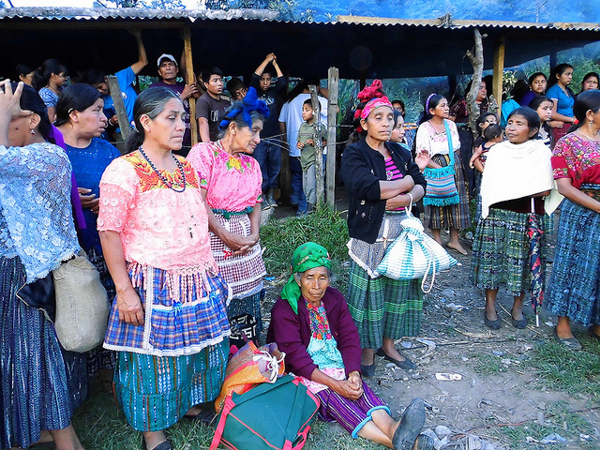 Mayan women protest hydroelectric dam projects in Santa Cruz Barillas in western Guatemala on March 16, 2014. Local opposition to the construction of dams and other natural resource projects in the area has resulted in a government crackdown on activists. Photo credit: Luis Miranda Brugos / Alba Sud Fotografia. Thursdays are one of two visiting […]
Mayan women protest hydroelectric dam projects in Santa Cruz Barillas in western Guatemala on March 16, 2014. Local opposition to the construction of dams and other natural resource projects in the area has resulted in a government crackdown on activists. Photo credit: Luis Miranda Brugos / Alba Sud Fotografia. Thursdays are one of two visiting […]
$4.5 Billion Spent On Voluntary Carbon Offsets Over Past Decade: Report
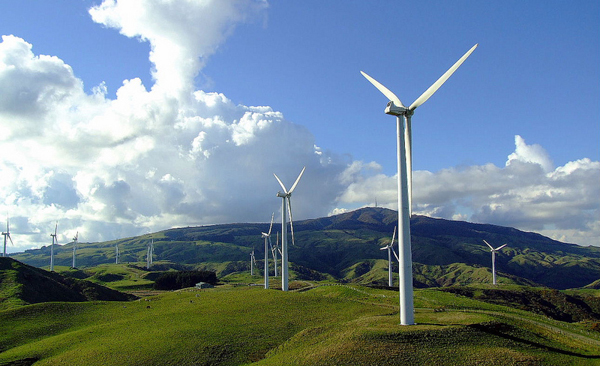 The Te Apiti wind farm in New Zealand was granted tradeable carbon offset credits when it was built in 2003/2004. Wind energy projects were popular in voluntary carbon markets in 2014. Photo credit: Jondaar_1. Nearly one billion carbon offset credits were voluntarily purchased over the past decade, which netted conservation and clean energy projects almost […]
The Te Apiti wind farm in New Zealand was granted tradeable carbon offset credits when it was built in 2003/2004. Wind energy projects were popular in voluntary carbon markets in 2014. Photo credit: Jondaar_1. Nearly one billion carbon offset credits were voluntarily purchased over the past decade, which netted conservation and clean energy projects almost […]
EU proposes 40% emissions reduction target for 2030
The European Commission has proposed setting a binding greenhouse gas emissions reduction target of 40 percent below 1990 levels for 2030, reports Thomson Reuters Point Carbon. The target, which aims to boost sagging carbon offset prices while maintain Europe’s leadership on climate policy, is at the higher end of expectations, according to the analysis group. […]
California’s next innovation: performance-based rainforest conservation (Commentary)
 Often misunderstood, REDD+ forest carbon offsets are a “must have” for any realistic climate-change mitigation strategy. Californians are known as innovation leaders, and once again, we are on the verge of demonstrating critical leadership. Only this time it isn’t about the Internet, social networking, reality television, venture capital or electric cars. It is about stopping […]
Often misunderstood, REDD+ forest carbon offsets are a “must have” for any realistic climate-change mitigation strategy. Californians are known as innovation leaders, and once again, we are on the verge of demonstrating critical leadership. Only this time it isn’t about the Internet, social networking, reality television, venture capital or electric cars. It is about stopping […]
Panel lays out best practices for REDD+ credits in California’s carbon market
 A panel of scientific experts has released a final report outlining how carbon credits generated from tropical forest conservation could be used under California’s cap-and-trade system while minimizing risks to forest-dependent communities and wildlife. The report comes after the working group spent three years gathering data and comments at public hearings and workshops in the […]
A panel of scientific experts has released a final report outlining how carbon credits generated from tropical forest conservation could be used under California’s cap-and-trade system while minimizing risks to forest-dependent communities and wildlife. The report comes after the working group spent three years gathering data and comments at public hearings and workshops in the […]
Market for REDD+ carbon credits declines 8% in 2012
 The market for carbon credits generated from projects that reduce deforestation and forest degradation — a climate change mitigation approach known as REDD+ — dipped eight percent in 2012 according to an annual assessment of the global voluntary carbon market. The report, published by Ecosystem Marketplace and Bloomberg New Energy Finance and slated to be […]
The market for carbon credits generated from projects that reduce deforestation and forest degradation — a climate change mitigation approach known as REDD+ — dipped eight percent in 2012 according to an annual assessment of the global voluntary carbon market. The report, published by Ecosystem Marketplace and Bloomberg New Energy Finance and slated to be […]
Commentary: Protecting the people, not the polluters, says Greenpeace
 This is a response from Greenpeace to Dr. Daniel Nepstad’s critique of Greenpeace’s recent report on a carbon finance program being advanced by California and other subnational entities. His op-ed can be found at Commentary: Greenpeace report threatens climate change mitigation and tropical forests. Greenpeace is dedicated to ending deforestation and preventing catastrophic climate change. […]
This is a response from Greenpeace to Dr. Daniel Nepstad’s critique of Greenpeace’s recent report on a carbon finance program being advanced by California and other subnational entities. His op-ed can be found at Commentary: Greenpeace report threatens climate change mitigation and tropical forests. Greenpeace is dedicated to ending deforestation and preventing catastrophic climate change. […]
Greenpeace targets forest carbon offsets in California’s cap-and-trade
 California’s forest conservation-based carbon offsets in its climate change legislation may not lead to net reductions in greenhouse gas emissions and could exacerbate social conflict in places like southern Mexico, argues a report released Monday by Greenpeace. But the activist group faced sharp criticism from backers of California’s initiative. The report, titled Outsourcing Hot Air, […]
California’s forest conservation-based carbon offsets in its climate change legislation may not lead to net reductions in greenhouse gas emissions and could exacerbate social conflict in places like southern Mexico, argues a report released Monday by Greenpeace. But the activist group faced sharp criticism from backers of California’s initiative. The report, titled Outsourcing Hot Air, […]
Madagascar gets biggest protected area
 Leaf-tailed gecko in Madagascar. Photo by Rhett A. Butler Madagascar officially designated its largest protected area in a region renowned for its tropical rainforests and rich diversity of wildlife, including 20 species of lemurs, reports the Wildlife Conservation Society (WCS), a group that was instrumental in establishing the park. Makira Natural Park covers some 372,470 […]
Leaf-tailed gecko in Madagascar. Photo by Rhett A. Butler Madagascar officially designated its largest protected area in a region renowned for its tropical rainforests and rich diversity of wildlife, including 20 species of lemurs, reports the Wildlife Conservation Society (WCS), a group that was instrumental in establishing the park. Makira Natural Park covers some 372,470 […]
Voluntary carbon market reaches $576 m in 2011
 Sumatran elephant in South Sumatra, Indonesia. Photo by Rhett A. Butler The voluntary carbon offset market reached a three-year high in 2011, according to the State of the Voluntary Carbon Markets report released this week. Volume hit $576 million in 2011, trailing only 2008 when $776 million in voluntary carbon credits where traded. Two-thirds of […]
Sumatran elephant in South Sumatra, Indonesia. Photo by Rhett A. Butler The voluntary carbon offset market reached a three-year high in 2011, according to the State of the Voluntary Carbon Markets report released this week. Volume hit $576 million in 2011, trailing only 2008 when $776 million in voluntary carbon credits where traded. Two-thirds of […]
Featured video: How to save the Amazon
The past ten years have seen unprecedented progress in fighting deforestation in the Amazon. Indigenous rights, payments for ecosystem services, government enforcement, satellite imagery, and a spirit of cooperation amongst old foes has resulted in a decline of 80 percent in Brazil’s deforestation rates. A new video Hanging in the Balance by the Skoll Foundation […]
For Earth Day, 17 celebrated scientists on how to make a better world
 Observations of planet Earth from the Moderate Resolution Imaging Spectroradiometer (MODIS) on July 11, 2005. Photo by: NASA. Seventeen top scientists and four acclaimed conservation organizations have called for radical action to create a better world for this and future generations. Compiled by 21 past winners of the prestigious Blue Planet Prize, a new paper […]
Observations of planet Earth from the Moderate Resolution Imaging Spectroradiometer (MODIS) on July 11, 2005. Photo by: NASA. Seventeen top scientists and four acclaimed conservation organizations have called for radical action to create a better world for this and future generations. Compiled by 21 past winners of the prestigious Blue Planet Prize, a new paper […]
Brazil’s indigenous affairs ministry: $32B carbon deal not valid
An apparent carbon deal between an Irish carbon trading company and an indigenous tribe that sparked outrage in Brazil is “invalid” according to the president of FUNAI, Brazil’s indigenous affairs agency. In a press conference held March 14th, Márcio Meira responded to an investigation by Pública looked into a carbon deal signed between Celestial Green […]
California cap-and-trade law spurs U.S. forest carbon projects
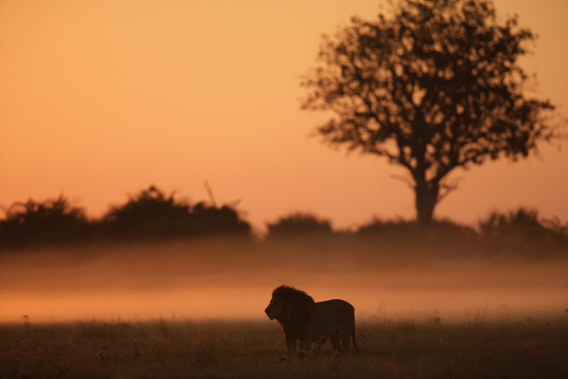 Male lion in the Okavango Delta. © National Geographic Entertainment. Photo by: Rhett A. Butler. Now that California’s carbon market has arrived, an Australian-based company that specializes in forest carbon offsets has jump started two forest projects with private landowners in the western U.S. The new company, Forest Carbon Partners, will make the projects available […]
Male lion in the Okavango Delta. © National Geographic Entertainment. Photo by: Rhett A. Butler. Now that California’s carbon market has arrived, an Australian-based company that specializes in forest carbon offsets has jump started two forest projects with private landowners in the western U.S. The new company, Forest Carbon Partners, will make the projects available […]
Deforestation could be stopped by 2020
 Deforested peatlands in Indonesian Borneo. Indonesia has one of the world’s highest rates of deforestation currently. Photo by: Rhett A. Butler . If governments commit to an international program to save forests known as REDD+, deforestation could be nearly zero in less than a decade, argues the Living Forests Report from the World Wide Fund […]
Deforested peatlands in Indonesian Borneo. Indonesia has one of the world’s highest rates of deforestation currently. Photo by: Rhett A. Butler . If governments commit to an international program to save forests known as REDD+, deforestation could be nearly zero in less than a decade, argues the Living Forests Report from the World Wide Fund […]
Australia passes national carbon trading scheme for agriculture, forestry
Australia’s parliament passed the world’s first national carbon trading scheme for credits generated from farming and forestry, reports Reuters. The program, dubbed the Carbon Farming Initiative (CFI), allows farmers to generate tradeable carbon offsets from projects that reduce emissions from agriculture and forestry, sectors that account for 23 percent of Australia’s greenhouse gas emissions. CFI […]
U.S. tribes to explore forest carbon opportunities
Tribes in Washington state will participate in a pilot project to test the feasibility of developing forest carbon projects on tribal lands, reports EcoAnalytics, a carbon advisory firm involved in the deal. The $2.45 million project aims to “develop protocols that overcome the legal and technical barriers faced by tribes in entering carbon credit trading […]
Ahead of meeting, Forest Stewardship Council (FSC) loses another supporter
 The forest organization, FERN, has pulled its support from the Forest Stewardship Council (FSC), reports FSC-Watch. FERN has quit the increasingly troubled organization due to FSC pursuing carbon credits through forestry. The FSC loses FERN just weeks before its 6th General Assembly, in which FSC partners—including private corporations and some environmental groups—will meet to debate […]
The forest organization, FERN, has pulled its support from the Forest Stewardship Council (FSC), reports FSC-Watch. FERN has quit the increasingly troubled organization due to FSC pursuing carbon credits through forestry. The FSC loses FERN just weeks before its 6th General Assembly, in which FSC partners—including private corporations and some environmental groups—will meet to debate […]
How do we save Africa’s forests?
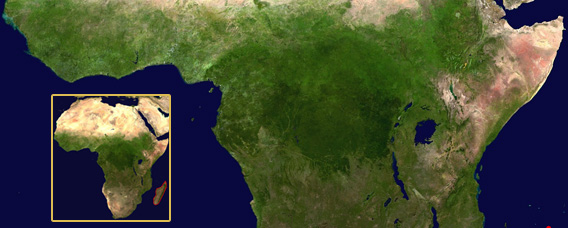 Africa’s forests are fast diminishing to the detriment of climate, biodiversity, and millions of people of dependent on forest resources for their well-being. But is the full conservation of Africa’s forests necessary to mitigate global climate change and ensure environmental stability in Africa? A new report by The Forest Philanthropy Action Network (FPAN), a non-profit […]
Africa’s forests are fast diminishing to the detriment of climate, biodiversity, and millions of people of dependent on forest resources for their well-being. But is the full conservation of Africa’s forests necessary to mitigate global climate change and ensure environmental stability in Africa? A new report by The Forest Philanthropy Action Network (FPAN), a non-profit […]
Environment versus economy: local communities find economic benefits from living next to conservation areas
 Forest temple in protected area in Thailand. Photo by: Katharine Sims. While few would question that conserving a certain percentage of land or water is good for society overall, it has long been believed that protected areas economically impoverish, rather than enrich, communities living adjacent to them. Many communities worldwide have protested against the establishment […]
Forest temple in protected area in Thailand. Photo by: Katharine Sims. While few would question that conserving a certain percentage of land or water is good for society overall, it has long been believed that protected areas economically impoverish, rather than enrich, communities living adjacent to them. Many communities worldwide have protested against the establishment […]
PUMA goes carbon neutral by protecting lions in Kenya
PUMA, the sporting goods brand, and its parent company PPR will offset their 2010 carbon dioxide emissions by purchasing carbon credits generated through conservation of wildlife habitat in Kenya. The deal, announced Tuesday, means that PPR is the first luxury products company to offset emissions by buying Reducing Emissions from Deforestation and Degradation (REDD) credits […]
Open source forest accounting methodology for REDD projects developed
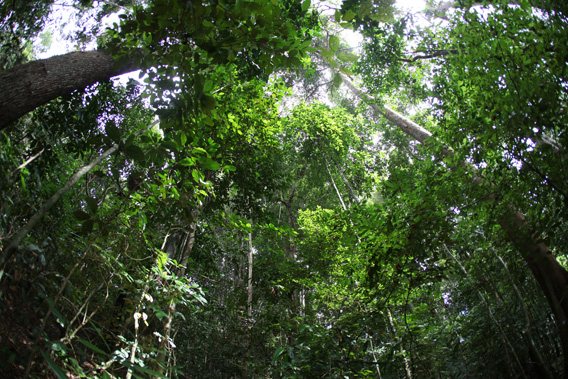 Rainforest in West Kalimantan, Indonesia Avoided Deforestation Partners, a forest conservation group, has coordinated the development of an “open source” forest carbon accounting methodology that could help speed projects aiming to reduce greenhouse gas emissions from deforestation and degradation. The group says the new protocols could substantially reduce the cost of establishing forest carbon conservation […]
Rainforest in West Kalimantan, Indonesia Avoided Deforestation Partners, a forest conservation group, has coordinated the development of an “open source” forest carbon accounting methodology that could help speed projects aiming to reduce greenhouse gas emissions from deforestation and degradation. The group says the new protocols could substantially reduce the cost of establishing forest carbon conservation […]
Carbon criminals make off with $38 million in carbon credits heist
Cyberthieves who hacked the Czech carbon registry on Tuesday had intimate knowledge of different registries. They acted just days before a key security upgrade would have made the heist impossible, then sold the credits immediately – keeping the cash and letting the credits bounce around the system. Participants are now bracing for a fight over […]
Carbon credits ‘stolen’
 The European Union temporarily shut down its carbon market after a security breach, reports Point Carbon. The European Commission suspended most of its Emissions Trading Scheme following the disclosure of a theft of 475,000 E.U. carbon dioxide emissions allowances (EUAs) from the Czech Republic’s carbon registry. The EUAs, worth around 7 million euros, were transferred […]
The European Union temporarily shut down its carbon market after a security breach, reports Point Carbon. The European Commission suspended most of its Emissions Trading Scheme following the disclosure of a theft of 475,000 E.U. carbon dioxide emissions allowances (EUAs) from the Czech Republic’s carbon registry. The EUAs, worth around 7 million euros, were transferred […]
Will Indonesia’s big REDD rainforest deal work?
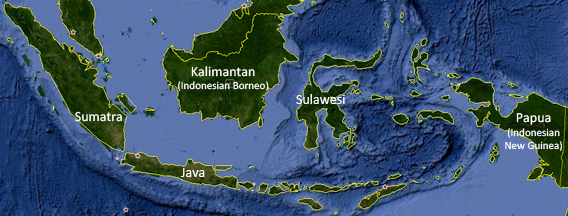 A shorter version of this article appears on Yale e360 as Indonesia’s Corruption Legacy Clouds a Forest Protection Plan. The version that appears below was last revised on October 31, 2010. Flying in a plane over the Indonesian half of the island of New Guinea, rainforest stretches like a sea of green, broken only by […]
A shorter version of this article appears on Yale e360 as Indonesia’s Corruption Legacy Clouds a Forest Protection Plan. The version that appears below was last revised on October 31, 2010. Flying in a plane over the Indonesian half of the island of New Guinea, rainforest stretches like a sea of green, broken only by […]
California approves cap-and-trade under global warming law
 The California Air Resources Board voted 9-1 to adopt cap and trade regulations for AB32, California’s 2006 climate law. The move, which establishes the first compliance carbon trading system in the United States, opens the door for carbon offsets generated via forest conservation projects. The new rules will allow polluting industries to buy and sell […]
The California Air Resources Board voted 9-1 to adopt cap and trade regulations for AB32, California’s 2006 climate law. The move, which establishes the first compliance carbon trading system in the United States, opens the door for carbon offsets generated via forest conservation projects. The new rules will allow polluting industries to buy and sell […]
Guyana: where’s the money pledged for saving rainforests?
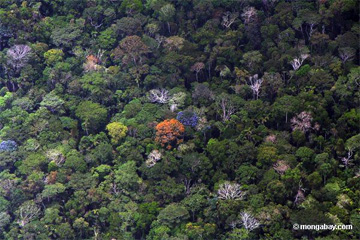 Funds ostensibly set aside to reward tropical countries for protecting their rainforests are being held up, threatening to exhaust the political capital needed to advance the proposed reducing emissions from deforestation and degradation (REDD) mechanism before it even gets off the ground, warned the president of Guyana during a lively panel organized by Avoided Deforestation […]
Funds ostensibly set aside to reward tropical countries for protecting their rainforests are being held up, threatening to exhaust the political capital needed to advance the proposed reducing emissions from deforestation and degradation (REDD) mechanism before it even gets off the ground, warned the president of Guyana during a lively panel organized by Avoided Deforestation […]
Can RED Hot California Heat Up A Sedated Cancun?
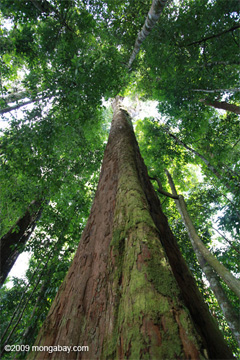 In his concession speech after the 2010 mid-term elections, President Obama said that prospects for meaningful U.S. climate change legislation are doubtful and will be for years. With the US and the international community unable to take even modest steps to combat global warming, the State of California has stepped up in a big, big […]
In his concession speech after the 2010 mid-term elections, President Obama said that prospects for meaningful U.S. climate change legislation are doubtful and will be for years. With the US and the international community unable to take even modest steps to combat global warming, the State of California has stepped up in a big, big […]
Stymied by lack of global climate deal, states develop own low carbon accord
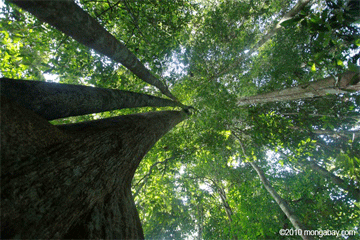 California and other states launched an international initiative that will work toward reducing greenhouse gas emissions and transitioning toward a low carbon economy in the absence of a global climate deal. Meeting at the University of California, Davis, near Sacramento, leaders of states across several countries agreed to fast-track “the development of clean technologies, climate […]
California and other states launched an international initiative that will work toward reducing greenhouse gas emissions and transitioning toward a low carbon economy in the absence of a global climate deal. Meeting at the University of California, Davis, near Sacramento, leaders of states across several countries agreed to fast-track “the development of clean technologies, climate […]
Oil palm plantations on peatlands won’t get carbon credits under CDM
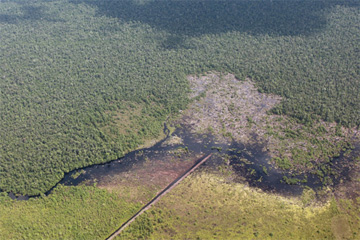 Plantations on peatlands will no longer be supported by the Clean Development Mechanism (CDM), a framework for industrialized countries to reduce their emissions via projects in developing countries, reports Wetlands International. The decision, which came last Friday during the executive board meeting, will bar biofuel plantations established on peatlands from earning carbon credits that could […]
Plantations on peatlands will no longer be supported by the Clean Development Mechanism (CDM), a framework for industrialized countries to reduce their emissions via projects in developing countries, reports Wetlands International. The decision, which came last Friday during the executive board meeting, will bar biofuel plantations established on peatlands from earning carbon credits that could […]
Gazprom, Shell dan Clinton Foundation Dukung Kesepakatan Karbon Hutan Hujan di Borneo
 Proyek konservasi hutan yang didukung oleh Shell, Gazprom Market and Trading dan Clinton Foundation di Pulau Borneo telah memenangkan persetujuan di bawah standar perhitungan karbon, menurut laporan Reuters. Proyek Rimba Raya, yang mencakup hampir 100.000 ha (250.000 akre) hutan gambut di propinsi Kalimantan Tengah Indonesia, dapat mengurangi emisi yang diperkirakan hingga 75 juta ton metrik […]
Proyek konservasi hutan yang didukung oleh Shell, Gazprom Market and Trading dan Clinton Foundation di Pulau Borneo telah memenangkan persetujuan di bawah standar perhitungan karbon, menurut laporan Reuters. Proyek Rimba Raya, yang mencakup hampir 100.000 ha (250.000 akre) hutan gambut di propinsi Kalimantan Tengah Indonesia, dapat mengurangi emisi yang diperkirakan hingga 75 juta ton metrik […]
Gazprom, Shell and Clinton Foundation back rainforest carbon deal in Borneo
 A forest conservation project backed by Shell, Gazprom Market and Trading and the Clinton Foundation on the island of Borneo has won approval under a carbon accounting standard, reports Reuters. The Rimba Raya project, which covers nearly 100,000 ha (250,000 acres) of peat forest in Indonesia’s Central Kalimantan province, could reduce projected emissions by 75 […]
A forest conservation project backed by Shell, Gazprom Market and Trading and the Clinton Foundation on the island of Borneo has won approval under a carbon accounting standard, reports Reuters. The Rimba Raya project, which covers nearly 100,000 ha (250,000 acres) of peat forest in Indonesia’s Central Kalimantan province, could reduce projected emissions by 75 […]
Reforestation of rainforests sequesters more carbon than plantations
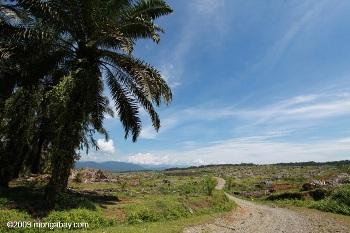 A new study in Ecological Management & Restoration has found that reforesting rainforest captures more carbon than monoculture plantation and even mixed species plantations. The research tested three projects in north-eastern Australia: a rainforest reforesting project using a variety of native trees, a mixed species plantation, and a monoculture plantation of conifers. “Compared to the […]
A new study in Ecological Management & Restoration has found that reforesting rainforest captures more carbon than monoculture plantation and even mixed species plantations. The research tested three projects in north-eastern Australia: a rainforest reforesting project using a variety of native trees, a mixed species plantation, and a monoculture plantation of conifers. “Compared to the […]
Scientists sound warning on forest carbon payment scheme
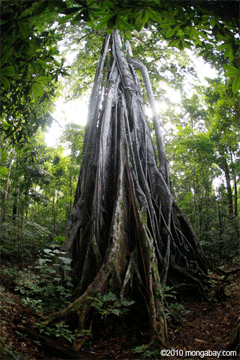 Scientists convening in Bali expressed a range of concerns over a proposed mechanism for mitigating climate change through forest conservation, but some remained hopeful the idea could deliver long-term protection to forests, ease the transition to a low-carbon economy, and generate benefits to forest-dependent people. Presenting at the annual Association for Tropical Biology and Conservation, […]
Scientists convening in Bali expressed a range of concerns over a proposed mechanism for mitigating climate change through forest conservation, but some remained hopeful the idea could deliver long-term protection to forests, ease the transition to a low-carbon economy, and generate benefits to forest-dependent people. Presenting at the annual Association for Tropical Biology and Conservation, […]
U.S. farms and forests report draws ire in Brazil; cutting down the Amazon does not mean lower food prices
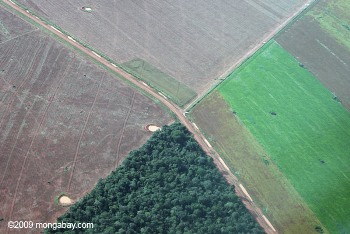 Not surprisingly, a US report released last week which argued that saving forests abroad will help US agricultural producers by reducing international competition has raised hackles in tropical forest counties. The report, commissioned by Avoided Deforestation Partners, a US group pushing for including tropical forest conservation in US climate policy, and the National Farmers Union, […]
Not surprisingly, a US report released last week which argued that saving forests abroad will help US agricultural producers by reducing international competition has raised hackles in tropical forest counties. The report, commissioned by Avoided Deforestation Partners, a US group pushing for including tropical forest conservation in US climate policy, and the National Farmers Union, […]
Saving tropical forests helps protects U.S. agriculture, argues campaign
- Reducing deforestation abroad helps protect the U.S. agricultural sector by ensuring higher prices for commodities and reducing the cost of compliance with expected climate regulations, argues a new report issued by Avoided Deforestation Partners and the National Farmers Union, a farming lobby group.
Rencana Indonesia untuk selamatkan hutan hujannya
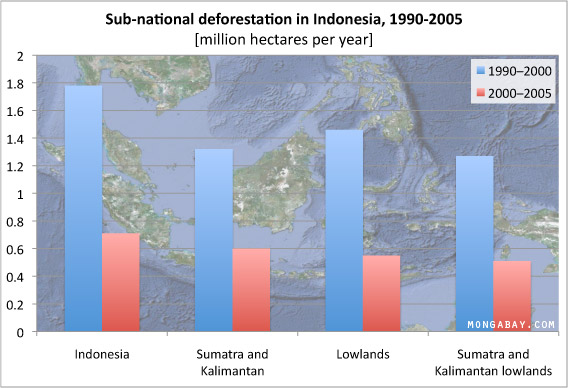 Wawancara dengan Agus Purnomo dan Yani Saloh, Asisten Khusus Presiden Republik Indonesia untuk Perubahan Iklim. Akhir tahun lalu, Indonesia membuat berita di dunia dengan janji yang berani untuk mengurangi penggundulan hutan, yang menghabiskan hampir 28 juta hektar (108 mil persegi) hutan antara tahun 1990 dan 2005 dan merupakan sumber sekitar 80 persen dari emisi gas […]
Wawancara dengan Agus Purnomo dan Yani Saloh, Asisten Khusus Presiden Republik Indonesia untuk Perubahan Iklim. Akhir tahun lalu, Indonesia membuat berita di dunia dengan janji yang berani untuk mengurangi penggundulan hutan, yang menghabiskan hampir 28 juta hektar (108 mil persegi) hutan antara tahun 1990 dan 2005 dan merupakan sumber sekitar 80 persen dari emisi gas […]
Voluntary carbon markets plunge in 2009
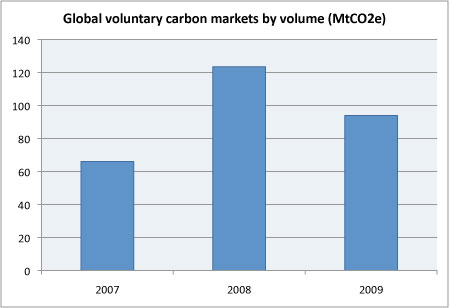 Battered by a faltering world economy and lack of progress on U.S. climate legislation, voluntary carbon markets declined by nearly every measure in 2009, according to the fourth annual State of the Voluntary Carbon Market Report issued today by Ecosystem Marketplace and Bloomberg New Energy Finance. The report recorded a 26 percent drop in transactions […]
Battered by a faltering world economy and lack of progress on U.S. climate legislation, voluntary carbon markets declined by nearly every measure in 2009, according to the fourth annual State of the Voluntary Carbon Market Report issued today by Ecosystem Marketplace and Bloomberg New Energy Finance. The report recorded a 26 percent drop in transactions […]
Indonesia’s plan to save its rainforests
 An interview with Agus Purnomo and Yani Saloh, Special Assistants to the President of the Republic of Indonesia for Climate Change. Late last year Indonesia made global headlines with a bold pledge to reduce deforestation, which claimed nearly 28 million hectares (108,000 square miles) of forest between 1990 and 2005 and is the source of […]
An interview with Agus Purnomo and Yani Saloh, Special Assistants to the President of the Republic of Indonesia for Climate Change. Late last year Indonesia made global headlines with a bold pledge to reduce deforestation, which claimed nearly 28 million hectares (108,000 square miles) of forest between 1990 and 2005 and is the source of […]
Indonesia identifikasi wilayah-wilayah yang memungkinkan untuk proyek pertama pelestarian hutan
Pemerintah Indonesia telah menyebutkan empat hutan yang bisa digunakan sebagai proyek pertama untuk kesepakatan pelestarian mereka dengan Norwegia, menurut Jakarta Post. Kesepakatan tersebut, melibatkan milyaran dolar Amerika dari Norwegia, diharapkan dapat membantu Indonesia mencegah dengan keras penggundulan hutan di seluruh pelosok negara, yang dulunya menyebabkan Indonesia menjadi penghasil emisi gas rumah kaca tertinggi ketiga di […]
Massive forest carbon scam alleged in Liberia
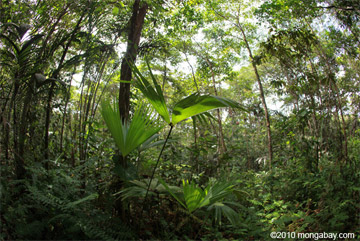 Liberian President Ellen Johnson Sirleaf established a commission investigate a proposed forest carbon credit deal between the West African nation’s Forest Development Authority (FDA) and UK-based Carbon Harvesting Corporation, reports Global Witness, an NGO that originally raised concerns about the scheme, which aimed to secure around a fifth of Liberia’s total forest area — 400,000 […]
Liberian President Ellen Johnson Sirleaf established a commission investigate a proposed forest carbon credit deal between the West African nation’s Forest Development Authority (FDA) and UK-based Carbon Harvesting Corporation, reports Global Witness, an NGO that originally raised concerns about the scheme, which aimed to secure around a fifth of Liberia’s total forest area — 400,000 […]
Indonesia identifies possible sites for forest conservation pilot project
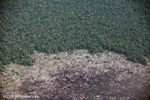 The government of Indonesia has named four forests which could serve as pilot projects for its conservation deal with Norway, according to the Jakarta Post. The deal, including a billion US dollar donation from Norway, is meant to help Indonesia stem rampant deforestation throughout the nation, which has pushed Indonesia to become the world’s third […]
The government of Indonesia has named four forests which could serve as pilot projects for its conservation deal with Norway, according to the Jakarta Post. The deal, including a billion US dollar donation from Norway, is meant to help Indonesia stem rampant deforestation throughout the nation, which has pushed Indonesia to become the world’s third […]
Indonesia umumkan penundaan dalam pemberian konsesi hutan baru
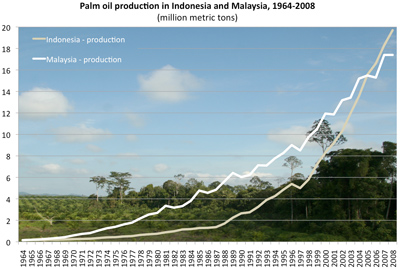 Sebagai pemilik salah satu tingkat tertinggi penggundulan hutan di dunia, emisi ketiga terbesar di dunia sebagian besar karena hilangnya hutan, dan kekayaan keragaman hayati yang berjuang untuk bertahan hidup di tengah-tengah hilangnya habitat skala besar, Indonesia hari ini mengumumkan perjanjian yang mungkin saja menjadi awal dari penghentian hilangnya hutan di negata Asia Tenggara. Indonesia mengumumkan […]
Sebagai pemilik salah satu tingkat tertinggi penggundulan hutan di dunia, emisi ketiga terbesar di dunia sebagian besar karena hilangnya hutan, dan kekayaan keragaman hayati yang berjuang untuk bertahan hidup di tengah-tengah hilangnya habitat skala besar, Indonesia hari ini mengumumkan perjanjian yang mungkin saja menjadi awal dari penghentian hilangnya hutan di negata Asia Tenggara. Indonesia mengumumkan […]
A total ban on primary forest logging needed to save the world, an interview with activist Glen Barry
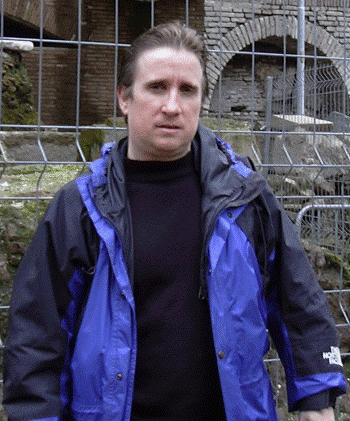 Radical, controversial, ahead-of-his-time, brilliant, or extremist: call Dr. Glen Barry, the head of Ecological Internet, what you will, but there is no question that his environmental advocacy group has achieved major successes in the past years, even if many of these are below the radar of big conservation groups and mainstream media. “We tend to […]
Radical, controversial, ahead-of-his-time, brilliant, or extremist: call Dr. Glen Barry, the head of Ecological Internet, what you will, but there is no question that his environmental advocacy group has achieved major successes in the past years, even if many of these are below the radar of big conservation groups and mainstream media. “We tend to […]
Apakah kita di sedang berada di tepian penyelamatan hutan hujan?
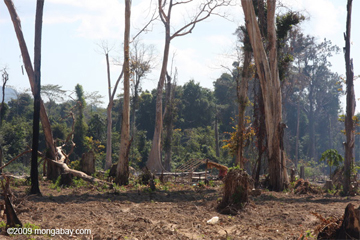 Hingga saat ini, menyelamatkan hutan hujan seperti sebuah misi yang mustahil. Namun saat ini dunia telah mulai menerima ide bahwa solusi yang ditawarkan untuk membantu menghadapi perubahan iklim dapat memberikan tawaran cara baru dengan memunculkan nilai hutan tanpa menebanginya. CATATAN: Lihat Bigg REDDuntuk membaca konsep dengan lebih ringkas. Jauh di dalam Amazon Brazil, anggota suku […]
Hingga saat ini, menyelamatkan hutan hujan seperti sebuah misi yang mustahil. Namun saat ini dunia telah mulai menerima ide bahwa solusi yang ditawarkan untuk membantu menghadapi perubahan iklim dapat memberikan tawaran cara baru dengan memunculkan nilai hutan tanpa menebanginya. CATATAN: Lihat Bigg REDDuntuk membaca konsep dengan lebih ringkas. Jauh di dalam Amazon Brazil, anggota suku […]
Indonesia announces moratorium on granting new forest concessions
 With one of the highest rates of deforestation in the world, the world’s third largest greenhouse gas emissions due mostly to forest loss, and with a rich biodiversity that is fighting to survive amid large-scale habitat loss, Indonesia today announced a deal that may be the beginning of stopping forest loss in the Southeast Asian […]
With one of the highest rates of deforestation in the world, the world’s third largest greenhouse gas emissions due mostly to forest loss, and with a rich biodiversity that is fighting to survive amid large-scale habitat loss, Indonesia today announced a deal that may be the beginning of stopping forest loss in the Southeast Asian […]
Can markets protect nature?
 An interview with Michael Jenkins, President and CEO of Forest Trends Over the past 30 years billions of dollars has been committed to global conservation efforts, yet forests continue to fall, largely a consequence of economic drivers, including surging global demand for food and fuel. With consumption expected to far outstrip population growth due to […]
An interview with Michael Jenkins, President and CEO of Forest Trends Over the past 30 years billions of dollars has been committed to global conservation efforts, yet forests continue to fall, largely a consequence of economic drivers, including surging global demand for food and fuel. With consumption expected to far outstrip population growth due to […]
Guyana bans gold mining in the ‘Land of the Giants’
 Guyana has banned gold dredging in the Rewa Head region of the South American country after pressure from Amerindian communities. A recent expedition to Rewa Head turned up unspoiled wilderness and mind-boggling biodiversity. The researchers, in just six weeks, stumbled on the world’s largest snake (anaconda), spider (the aptly named goliath bird-eating spider), armadillo (the […]
Guyana has banned gold dredging in the Rewa Head region of the South American country after pressure from Amerindian communities. A recent expedition to Rewa Head turned up unspoiled wilderness and mind-boggling biodiversity. The researchers, in just six weeks, stumbled on the world’s largest snake (anaconda), spider (the aptly named goliath bird-eating spider), armadillo (the […]
James Hansen says Copenhagen approach “fundamentally wrong” would be better to “reassess”
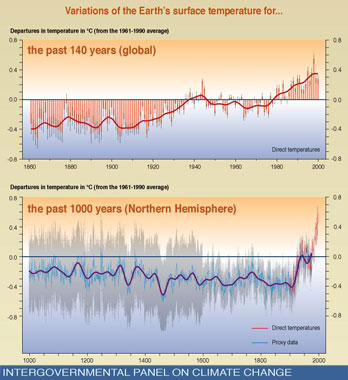 James Hansen, one of the world’s foremost climatologists, told the Guardian today that he believes the Copenhagen talks are flawed to the point where failure of the talks may be the best way forward. “The approach that is being talked about is so fundamentally wrong that it would be better to reassess,” Hansen said. Hansen […]
James Hansen, one of the world’s foremost climatologists, told the Guardian today that he believes the Copenhagen talks are flawed to the point where failure of the talks may be the best way forward. “The approach that is being talked about is so fundamentally wrong that it would be better to reassess,” Hansen said. Hansen […]
Deforestation emissions should be shared between producer and consumer, argues study
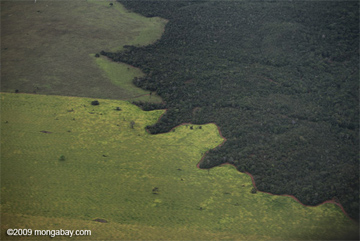 Study focuses on beef and soybean production at the expense of the Amazon rainforest. Under the Kyoto Protocol the nation that produces carbon emission takes responsibility for them, but what about when the country is producing carbon-intensive goods for consumer demand beyond its borders? For example while China is now the world’s highest carbon emitter, […]
Study focuses on beef and soybean production at the expense of the Amazon rainforest. Under the Kyoto Protocol the nation that produces carbon emission takes responsibility for them, but what about when the country is producing carbon-intensive goods for consumer demand beyond its borders? For example while China is now the world’s highest carbon emitter, […]
New report: boreal forests contain more carbon than tropical forest per hectare
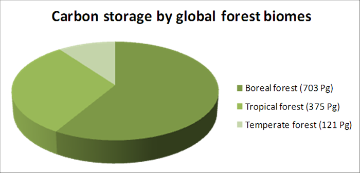 A new report states that boreal forests store nearly twice as much carbon as tropical forests per hectare: a fact which researchers say should make the conservation of boreal forests as important as tropical in climate change negotiations. The report from the Canadian Boreal Initiative and the Boreal Songbird Initiative, entitled “The Carbon the World […]
A new report states that boreal forests store nearly twice as much carbon as tropical forests per hectare: a fact which researchers say should make the conservation of boreal forests as important as tropical in climate change negotiations. The report from the Canadian Boreal Initiative and the Boreal Songbird Initiative, entitled “The Carbon the World […]
Disney commits $4 million to rainforest conservation in the Amazon, Congo
The Walt Disney Company will invest $7 million in forest conservation projects in the U.S., the Congo Basin, and the Amazon in an effort to reduce its greenhouse gas emissions. Disney’s investment is being made in partnership with three conservation groups: Conservation International, The Nature Conservancy and The Conservation Fund. Working with Conservation International, Disney […]
Will Ecuador’s plan to raise money for not drilling oil in the Amazon succeed?
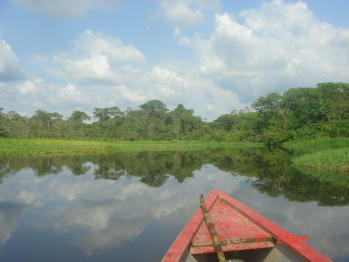 Ecuador’s Yasuni National Park is full of wealth: it is one of the richest places on earth in terms of biodiversity; it is home to the indigenous Waorani people, as well as several uncontacted tribes; and the park’s forest and soil provides a massive carbon sink. However, Yasuni National Park also sits on wealth of […]
Ecuador’s Yasuni National Park is full of wealth: it is one of the richest places on earth in terms of biodiversity; it is home to the indigenous Waorani people, as well as several uncontacted tribes; and the park’s forest and soil provides a massive carbon sink. However, Yasuni National Park also sits on wealth of […]
Logged forests support biodiversity after 15 years of rehabilitation, but not if turned into plantations
 With the world facing global warming and a biodiversity crisis, a new study in Conservation Biology shows that within 15 years logged forests—considered by many to be ‘degraded’—can be managed in order to successfully fight both climate change and extinction. Studying regenerating forests in northeast Borneo, Dr. David Edwards from the University of Leeds, surveyed […]
With the world facing global warming and a biodiversity crisis, a new study in Conservation Biology shows that within 15 years logged forests—considered by many to be ‘degraded’—can be managed in order to successfully fight both climate change and extinction. Studying regenerating forests in northeast Borneo, Dr. David Edwards from the University of Leeds, surveyed […]
Curtailing tropical deforestation vital to U.S. interests
 Curtailing tropical deforestation is vital to U.S. national interests as a cost-effective means to slow climate change, argues a new report issued by the bipartisan Commission on Climate and Tropical Forests. Deforestation accounts for more than a sixth of global carbon dioxide emissions, more than the entire transportation sector. The report, titled “Protecting the Climate […]
Curtailing tropical deforestation is vital to U.S. national interests as a cost-effective means to slow climate change, argues a new report issued by the bipartisan Commission on Climate and Tropical Forests. Deforestation accounts for more than a sixth of global carbon dioxide emissions, more than the entire transportation sector. The report, titled “Protecting the Climate […]
Private U.S. landowners may qualify for carbon payments under proposed legislation
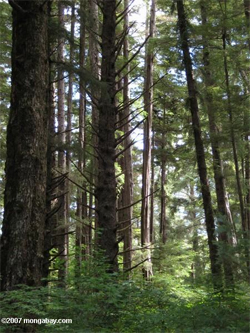 U.S. Starts Small in Developing Domestic Forestry Have you ever found yourself wondering what your backyard is worth in carbon? It may seem like a silly question – especially when deforestation in rainforest nations with millions of acres of tropical forest are spewing more CO2 into the atmosphere than any single industry – but small-scale […]
U.S. Starts Small in Developing Domestic Forestry Have you ever found yourself wondering what your backyard is worth in carbon? It may seem like a silly question – especially when deforestation in rainforest nations with millions of acres of tropical forest are spewing more CO2 into the atmosphere than any single industry – but small-scale […]
Voluntary Carbon Standard tops assessment of forestry carbon standards
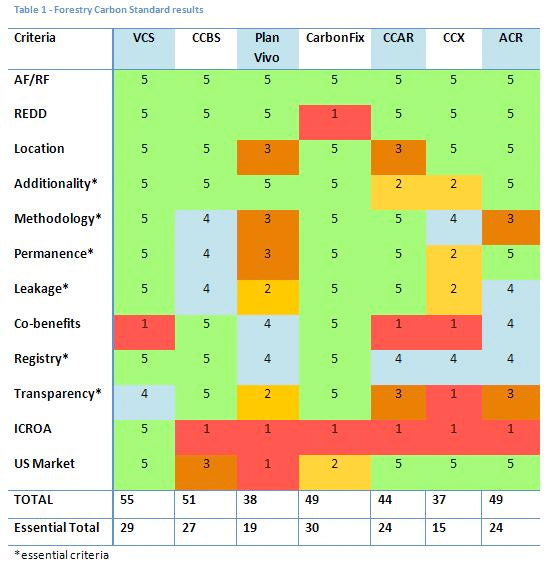 The Voluntary Carbon Standard (VCS) tops the rankings of a recent assessment gauging various standards for forestry carbon credits. The review, conducted by Paulo Lopes of Imperial College-London, found that VCS scores the best across a range of criteria to ensure that carbon credits are “real, verified, permanent, additional and unique”. Lopes also evaluated the […]
The Voluntary Carbon Standard (VCS) tops the rankings of a recent assessment gauging various standards for forestry carbon credits. The review, conducted by Paulo Lopes of Imperial College-London, found that VCS scores the best across a range of criteria to ensure that carbon credits are “real, verified, permanent, additional and unique”. Lopes also evaluated the […]
Innovative reforestation project threatened by ‘regime change’ in Madagascar, an interview with Rainer Dolch
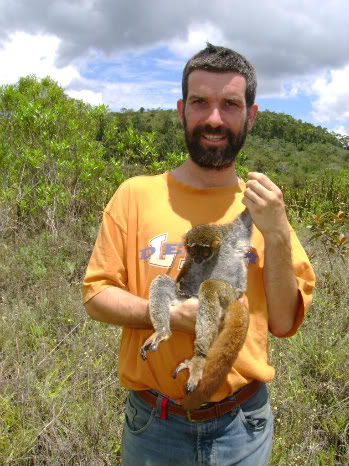 Third in a series of interviews with participants at the 2009 Association of Tropical Biology and Conservation (ATBC) conference. In Madagascar the TAMS Program (Tetik’asa Mampody Savoka, meaning “the project to bring back the forest”) is under threat due to the new government’s unwillingness to provide funding. The current government, after gaining power in a […]
Third in a series of interviews with participants at the 2009 Association of Tropical Biology and Conservation (ATBC) conference. In Madagascar the TAMS Program (Tetik’asa Mampody Savoka, meaning “the project to bring back the forest”) is under threat due to the new government’s unwillingness to provide funding. The current government, after gaining power in a […]
Concerns over deforestation may drive new approach to cattle ranching in the Amazon
 As the world’s biggest cattle producer, Brazil braces for change While you’re browsing the mall for running shoes, the Amazon rainforest is probably the farthest thing from your mind. Perhaps it shouldn’t be. The globalization of commodity supply chains has created links between consumer products and distant ecosystems like the Amazon. Shoes sold in downtown […]
As the world’s biggest cattle producer, Brazil braces for change While you’re browsing the mall for running shoes, the Amazon rainforest is probably the farthest thing from your mind. Perhaps it shouldn’t be. The globalization of commodity supply chains has created links between consumer products and distant ecosystems like the Amazon. Shoes sold in downtown […]
Germany to pay Ecuador $650 million to forgo oil drilling, protect rainforest reserve
Are we on the brink of saving rainforests?
 Until now saving rainforests seemed like an impossible mission. But the world is now warming to the idea that a proposed solution to help address climate change could offer a new way to unlock the value of forest without cutting it down. NOTE: See Bigg REDD for a condensed take on this concept. Deep in […]
Until now saving rainforests seemed like an impossible mission. But the world is now warming to the idea that a proposed solution to help address climate change could offer a new way to unlock the value of forest without cutting it down. NOTE: See Bigg REDD for a condensed take on this concept. Deep in […]
Indonesia releases revenue sharing rules for REDD forest carbon projects
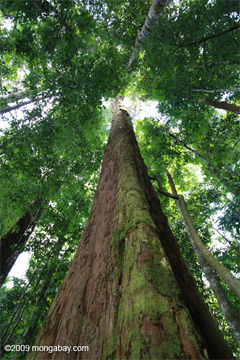 Indonesia has released revenue sharing rules for forest carbon projects, reports Reuters. According to a document released by the forestry ministry in Bahasa Indonesia (Indonesian) at dephut.go.id, the revenue-sharing depends on the type of forest ownership or permit, ranging from 10 to 50 percent for the government, 20 to 70 percent for local communities, and […]
Indonesia has released revenue sharing rules for forest carbon projects, reports Reuters. According to a document released by the forestry ministry in Bahasa Indonesia (Indonesian) at dephut.go.id, the revenue-sharing depends on the type of forest ownership or permit, ranging from 10 to 50 percent for the government, 20 to 70 percent for local communities, and […]
G8 leaders declare support for REDD forest conservation initiative
 A declaration issued by political leaders meeting at the G8 summit in L’Aquila, Italy, included a strong statement on the need to include forest conservation in a future climate agreement. Deforestation accounts for nearly 20 percent of global greenhouse gas emissions, a larger source of emissions than all the world’s cars, trucks, ships, and airplanes […]
A declaration issued by political leaders meeting at the G8 summit in L’Aquila, Italy, included a strong statement on the need to include forest conservation in a future climate agreement. Deforestation accounts for nearly 20 percent of global greenhouse gas emissions, a larger source of emissions than all the world’s cars, trucks, ships, and airplanes […]
A New Idea to Save Tropical Forests Takes Flight
 This is the first in a series of tropical forest policy commentaries John-O Niles will be writing for Mongabay.com leading up to the December U.N. climate meeting in Copenhagen. John-O is the Director of the Tropical Forest Group. In late 1991, I had just finished my undergraduate degree in forest economics at the University of […]
This is the first in a series of tropical forest policy commentaries John-O Niles will be writing for Mongabay.com leading up to the December U.N. climate meeting in Copenhagen. John-O is the Director of the Tropical Forest Group. In late 1991, I had just finished my undergraduate degree in forest economics at the University of […]
Fate of world’s rainforests likely to be determined in next 2 years
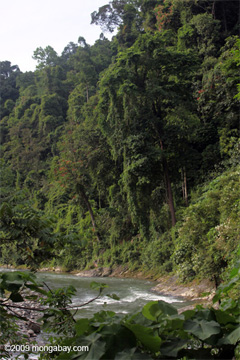 The fate of millions of hectares of tropical forests will probably be sealed this year and next year, reports a new set of policy papers detailing an emerging climate change mitigation mechanism known as Reducing Emissions from Deforestation and Degradation (REDD). REDD has been proposed by the U.N. and other entities as a form of […]
The fate of millions of hectares of tropical forests will probably be sealed this year and next year, reports a new set of policy papers detailing an emerging climate change mitigation mechanism known as Reducing Emissions from Deforestation and Degradation (REDD). REDD has been proposed by the U.N. and other entities as a form of […]
Commission on Climate and Tropical Forests forms to advise Congress, Obama on forest conservation
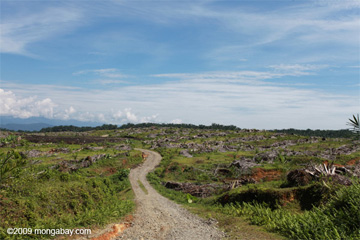 Leaders in business, government, advocacy, conservation, global development, science and national security have formed a commission to “provide bipartisan recommendations to Congress and the President about how to reduce tropical deforestation through U.S. climate change policies,” according to a statement released by the newly established group, named the Commission on Climate and Tropical Forests. Deforestation […]
Leaders in business, government, advocacy, conservation, global development, science and national security have formed a commission to “provide bipartisan recommendations to Congress and the President about how to reduce tropical deforestation through U.S. climate change policies,” according to a statement released by the newly established group, named the Commission on Climate and Tropical Forests. Deforestation […]
Climate pact must halt deforestation and industrial logging of old-growth forests, exclude carbon credits for forest conservation, say activists
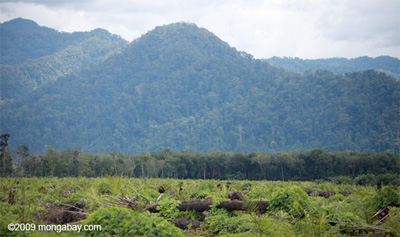 A global framework on climate change must immediately halt deforestation and industrial logging of the world’s old-growth forests, while protecting the rights of forest communities and indigenous groups, said a broad coalition of activist groups in a consensus statement issued today at U.N. climate talks in Bonn Germany. The statement said the successor treaty to […]
A global framework on climate change must immediately halt deforestation and industrial logging of the world’s old-growth forests, while protecting the rights of forest communities and indigenous groups, said a broad coalition of activist groups in a consensus statement issued today at U.N. climate talks in Bonn Germany. The statement said the successor treaty to […]
Brazil’s plan to save the Amazon rainforest
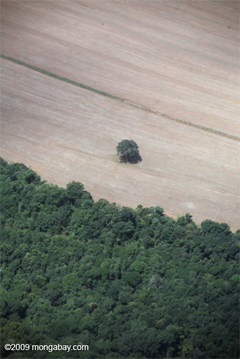 Brazil has its own designs for REDD Accounting for roughly half of tropical deforestation between 2000 and 2005, Brazil is the most important supply-side player when it comes to developing a climate framework that includes reducing emissions from deforestation and forest degradation (REDD). But Brazil’s position on REDD contrasts with proposals put forth by other […]
Brazil has its own designs for REDD Accounting for roughly half of tropical deforestation between 2000 and 2005, Brazil is the most important supply-side player when it comes to developing a climate framework that includes reducing emissions from deforestation and forest degradation (REDD). But Brazil’s position on REDD contrasts with proposals put forth by other […]
Excluding forest carbon from climate policy will spur massive deforestation
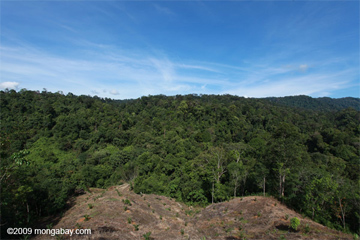 Failure to develop policies that account for emissions from land use change will lead to widespread deforestation and higher costs for addressing climate change, warn researchers writing in the journal Science. Using a computer model that incorporates economics, energy, agriculture, land-use changes, emissions and concentrations of greenhouse gases, a team of researchers from the Department […]
Failure to develop policies that account for emissions from land use change will lead to widespread deforestation and higher costs for addressing climate change, warn researchers writing in the journal Science. Using a computer model that incorporates economics, energy, agriculture, land-use changes, emissions and concentrations of greenhouse gases, a team of researchers from the Department […]
Green groups, corporations call for forest conservation to counter global warming
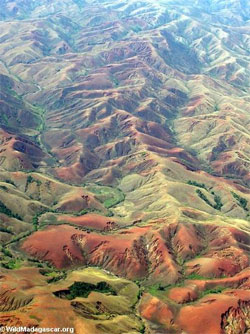 A group of leading U.S. businesses and environmental groups today formed a coalition calling for the inclusion of forest conservation in domestic cap-and-trade legislation. The pact — signed by American Electric Power, Conservation International, Duke Energy, Environmental Defense Fund, El Paso Corporation, National Wildlife Federation, Marriott International, Mercy Corps, Natural Resources Defense Council, PG&E Corporation, […]
A group of leading U.S. businesses and environmental groups today formed a coalition calling for the inclusion of forest conservation in domestic cap-and-trade legislation. The pact — signed by American Electric Power, Conservation International, Duke Energy, Environmental Defense Fund, El Paso Corporation, National Wildlife Federation, Marriott International, Mercy Corps, Natural Resources Defense Council, PG&E Corporation, […]
Voluntary carbon markets double in 2008
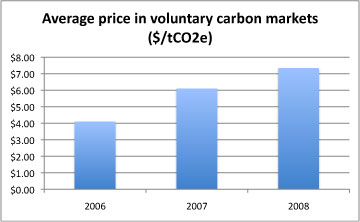 Voluntary carbon markets greatly expanded in both transaction volume and value in 2008, providing critical funds for projects aiming to reduce greenhouse gas emissions, according to a new report from Ecosystem Marketplace and New Carbon Finance. Fortifying the Foundation: State of the Voluntary Carbon Markets 2009 — a survey of over 190 voluntary carbon credit […]
Voluntary carbon markets greatly expanded in both transaction volume and value in 2008, providing critical funds for projects aiming to reduce greenhouse gas emissions, according to a new report from Ecosystem Marketplace and New Carbon Finance. Fortifying the Foundation: State of the Voluntary Carbon Markets 2009 — a survey of over 190 voluntary carbon credit […]
Bioelectricity bests ethanol on two fronts: land use and global warming
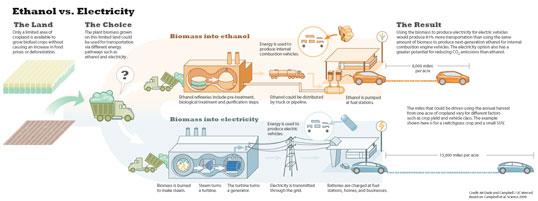 Yesterday the Obama Administration established a Biofuels Interagency Working Group to oversee implementation of new rules and research regarding biofuels. On the group’s first day they would do well to look at a new study in Science Magazine comparing the efficacy of ethanol versus bioelectricity. Researchers compared ethanol and bioelectricity in terms of miles per […]
Yesterday the Obama Administration established a Biofuels Interagency Working Group to oversee implementation of new rules and research regarding biofuels. On the group’s first day they would do well to look at a new study in Science Magazine comparing the efficacy of ethanol versus bioelectricity. Researchers compared ethanol and bioelectricity in terms of miles per […]
Indigenous people serve as guardians of forest carbon, must be involved in climate solutions
 Efforts to create an international climate framework — including a carbon financing mechanism for forest conservation — must involve forest people, said indigenous leaders attending the Indigenous Peoples Global Summit on Climate Change meeting this week in Anchorage, Alaska. Speaking at a press conference organized by The Nature Conservancy in connection with the Summit, Egberto […]
Efforts to create an international climate framework — including a carbon financing mechanism for forest conservation — must involve forest people, said indigenous leaders attending the Indigenous Peoples Global Summit on Climate Change meeting this week in Anchorage, Alaska. Speaking at a press conference organized by The Nature Conservancy in connection with the Summit, Egberto […]
Avoided deforestation projects highly desirable for carbon offsets finds survey
 91 percent of companies rated avoided deforestation as the most desirable forestry projects for carbon offsets, reports a survey by EcoSecurities, Conservation International, The Climate, Community & Biodiversity Alliance and ClimateBiz. The results suggest a healthy appetite for avoided deforestation credits among companies seeking to reduce their greenhouse gas emissions. “It’s tremendously encouraging to see […]
91 percent of companies rated avoided deforestation as the most desirable forestry projects for carbon offsets, reports a survey by EcoSecurities, Conservation International, The Climate, Community & Biodiversity Alliance and ClimateBiz. The results suggest a healthy appetite for avoided deforestation credits among companies seeking to reduce their greenhouse gas emissions. “It’s tremendously encouraging to see […]
Rainforest conservation can help U.S. businesses reduce costs
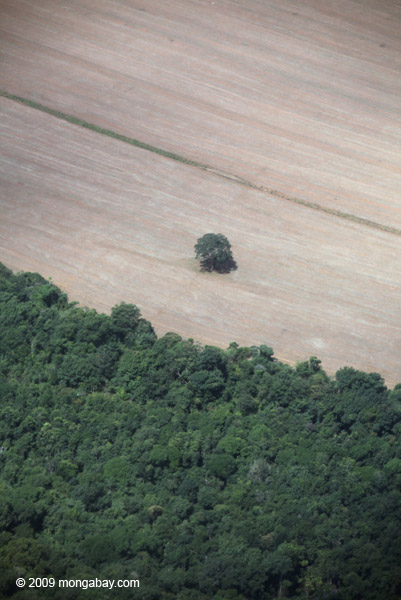 Carbon credits generated through forest conservation could provide a cost-effective way for U.S. companies to reduce their greenhouse gas emissions, business leaders were told at a meeting in Columbus, Ohio. The event, sponsored by The Nature Conservancy, is the first of several meetings to promote the potential benefits of forest conservation for U.S. business. “Forests […]
Carbon credits generated through forest conservation could provide a cost-effective way for U.S. companies to reduce their greenhouse gas emissions, business leaders were told at a meeting in Columbus, Ohio. The event, sponsored by The Nature Conservancy, is the first of several meetings to promote the potential benefits of forest conservation for U.S. business. “Forests […]
Kenya signs its first REDD deal to conserve forests
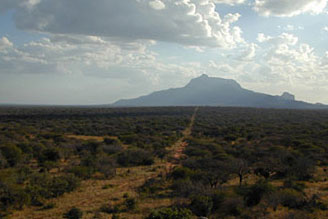 Kenya has signed its first carbon deal to reduce emissions from deforestation and degradation (REDD). Yesterday San Francisco-based Wildlife Works Carbon and Kenya Forest Service (KFS) announced a plan to protect the 80,000-acre Rukinga forest reserve in southeastern Kenya. The project will be funded by sales of carbon credits in the voluntary carbon market. The […]
Kenya has signed its first carbon deal to reduce emissions from deforestation and degradation (REDD). Yesterday San Francisco-based Wildlife Works Carbon and Kenya Forest Service (KFS) announced a plan to protect the 80,000-acre Rukinga forest reserve in southeastern Kenya. The project will be funded by sales of carbon credits in the voluntary carbon market. The […]
Rainforest conservation gains in U.S. and U.N. climate proposals
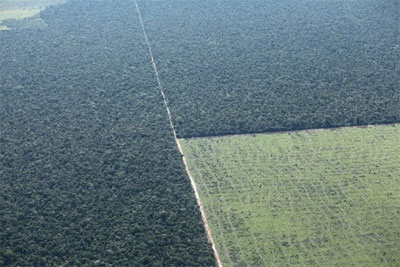 A proposed mechanism for reducing emissions from deforestation and degradation (REDD) figures prominently in the draft climate bill released last month by Congressmen Henry Waxman and Ed Markey as well as a U.N. document posted last week following a climate meeting in Bonn, Germany. Deforestation is the source of roughly 20 percent of greenhouse gas […]
A proposed mechanism for reducing emissions from deforestation and degradation (REDD) figures prominently in the draft climate bill released last month by Congressmen Henry Waxman and Ed Markey as well as a U.N. document posted last week following a climate meeting in Bonn, Germany. Deforestation is the source of roughly 20 percent of greenhouse gas […]
Carbon credits from forest conservation would crash carbon market, says Greenpeace
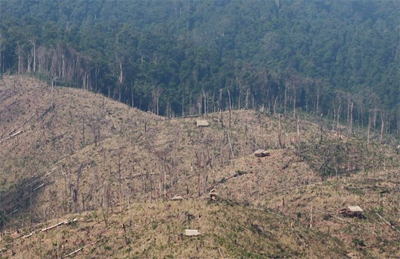 Inclusion of forest conservation in a market-based mechanism for reducing greenhouse gas emissions would crash carbon prices by swamping the market with cheap credits, claims a new report from Greenpeace. The environmental group said low carbon prices would “derail global efforts to tackle global warming” and cause “developing countries losing out on billions of dollars […]
Inclusion of forest conservation in a market-based mechanism for reducing greenhouse gas emissions would crash carbon prices by swamping the market with cheap credits, claims a new report from Greenpeace. The environmental group said low carbon prices would “derail global efforts to tackle global warming” and cause “developing countries losing out on billions of dollars […]
Can carbon credits from REDD compete with palm oil?
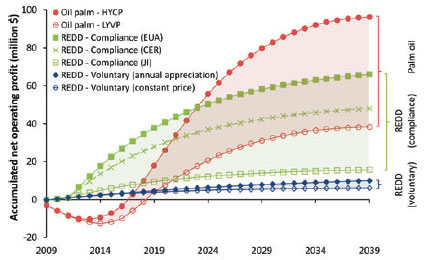 Reducing emissions from deforestation and degradation (REDD) is increasingly seen as a compelling way to conserve tropical forests while simultaneously helping mitigate climate change, preserving biodiversity, and providing sustainable livelihoods for rural people. But to become a reality REDD still faces a number of challenges, not least of which is economic competition from other forms […]
Reducing emissions from deforestation and degradation (REDD) is increasingly seen as a compelling way to conserve tropical forests while simultaneously helping mitigate climate change, preserving biodiversity, and providing sustainable livelihoods for rural people. But to become a reality REDD still faces a number of challenges, not least of which is economic competition from other forms […]
Rainforests absorb 20% of emissions annually
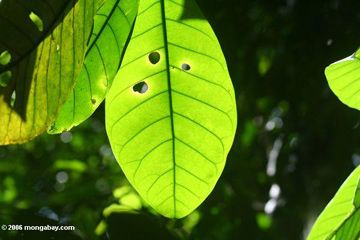
Payments for eco services could save the Amazon
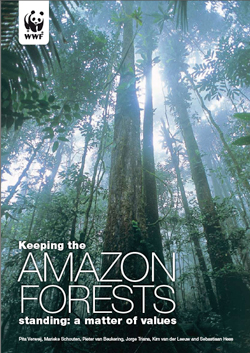
Carbon market surges 84% in 2008
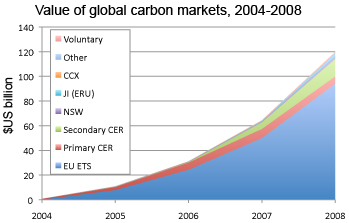
New model uses carbon credits, sustainable palm oil to save Indonesia’s rainforests
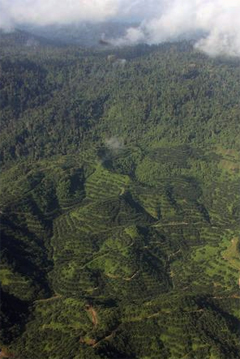
Norway to pay Guyana to save its rainforests
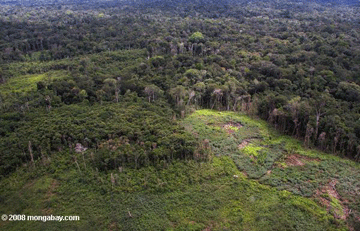
Iron fertilization of oceans may be ineffective in fighting global warming
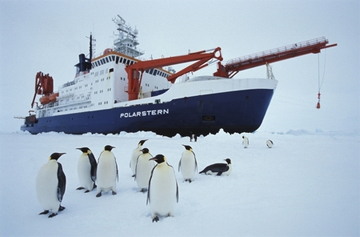 Iron fertilization of oceans less effective in sequestering carbon than previously estimated
Iron fertilization of oceans less effective in sequestering carbon than previously estimated
Guidelines on how to establish an avoided deforestation project
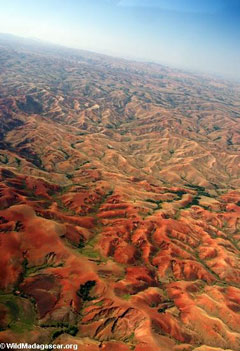 New guide offers insight on establishing projects for the emerging avoided deforestation or REDD market.
New guide offers insight on establishing projects for the emerging avoided deforestation or REDD market.
Carbon market collapse claims another casualty
Rainforests continue to fall but hope may rest in a market solution
Rainforests continue to fall but hope may rest in a market solution Rainforests continue to fall but hope may rest in a market solution Rhett A. Butler, mongabay.com December 11, 2008 This article appears at e360, the Yale School of Forestry’s online environmental magazine
Deal on forests falls short
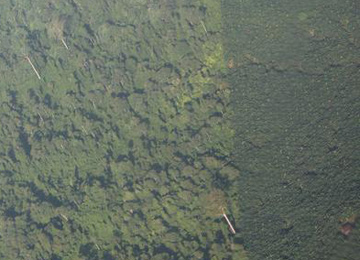 Deal on forests falls short Deal on forests falls short Rhett A. Butler, mongabay.com December 11, 2008
Deal on forests falls short Deal on forests falls short Rhett A. Butler, mongabay.com December 11, 2008
Africa calls for “full-range” of bio-carbon as climate solution
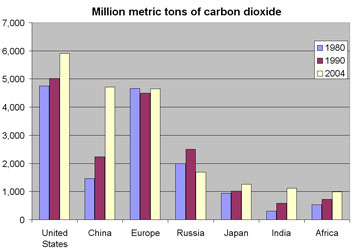 Africa proposes its own solution to global warming Africa proposes its own solution to global warming Rhett A. Butler, mongabay.com December 10, 2008 African coalition calls for “full-range” of biocarbon as climate solution
Africa proposes its own solution to global warming Africa proposes its own solution to global warming Rhett A. Butler, mongabay.com December 10, 2008 African coalition calls for “full-range” of biocarbon as climate solution
Indigenous people win voice in climate negotiations
 Indigenous people win voice in climate negotiations Indigenous people win voice in climate negotiations Rhett A. Butler, mongabay.com December 10, 2008
Indigenous people win voice in climate negotiations Indigenous people win voice in climate negotiations Rhett A. Butler, mongabay.com December 10, 2008
Finland, Sweden push for loophole that would drive destruction of peatlands around the world
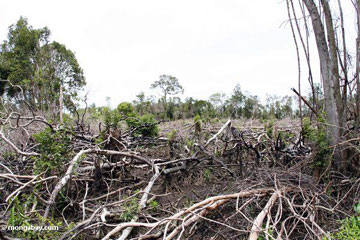 Finland, Sweden push for loophole that would drive destruction of peatlands around the world Finland, Sweden push for loophole that would drive destruction of peatlands around the world mongabay.com December 9, 2008
Finland, Sweden push for loophole that would drive destruction of peatlands around the world Finland, Sweden push for loophole that would drive destruction of peatlands around the world mongabay.com December 9, 2008
In Poznan, France pushes initiative to save rainforests
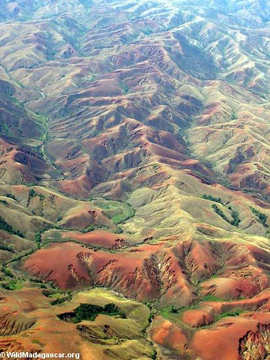 In Poznan, France pushes initiative to save rainforests In Poznan, France pushes initiative to save rainforests mongabay.com December 8, 2008
In Poznan, France pushes initiative to save rainforests In Poznan, France pushes initiative to save rainforests mongabay.com December 8, 2008
Peru seeks $200 million to save its rainforests
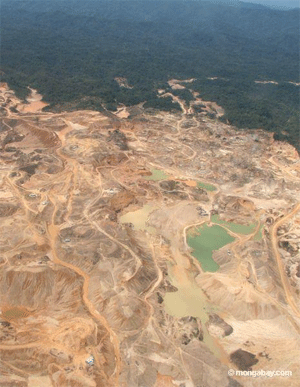 Peru seeks $200 million to cut deforestation to zero in 10 years Peru seeks $200 million to save its rainforests mongabay.com December 8, 2008
Peru seeks $200 million to cut deforestation to zero in 10 years Peru seeks $200 million to save its rainforests mongabay.com December 8, 2008
New standards ensure forest carbon projects protect indigenous people, biodiversity
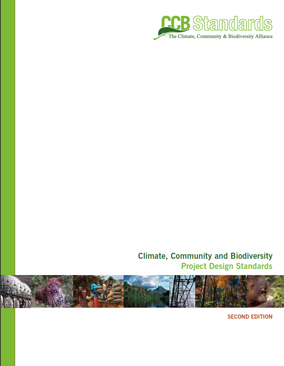 New standards ensure REDD projects protect forest people, biodiversity New standards ensure forest carbon projects protect indigenous people, biodiversity mongabay.com December 8, 2008
New standards ensure REDD projects protect forest people, biodiversity New standards ensure forest carbon projects protect indigenous people, biodiversity mongabay.com December 8, 2008
Little progress on avoided deforestation at climate meeting in Poland
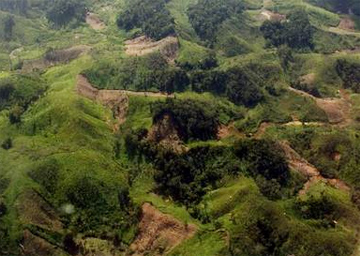 Little progress so far on avoided deforestation at climate meeting in Poland Little progress on avoided deforestation at climate meeting in Poland mongabay.com December 5, 2008
Little progress so far on avoided deforestation at climate meeting in Poland Little progress on avoided deforestation at climate meeting in Poland mongabay.com December 5, 2008
REDD faces challenges but can succeed, says report
REDD faces challenges but can succeed, says report REDD faces challenges but can succeed, says report mongabay.com December 5, 2008
Salvage logging offers hope for forests, communities devastated by industrial logging
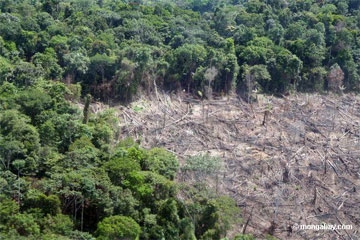 Salvage logging offers hope for forests, communities devastated by industrial logging An interview with Tropical Salvage’s Tim O’Brien Salvage logging offers hope for forests, communities devastated by industrial logging Rhett A. Butler, mongabay.com December 4, 2008
Salvage logging offers hope for forests, communities devastated by industrial logging An interview with Tropical Salvage’s Tim O’Brien Salvage logging offers hope for forests, communities devastated by industrial logging Rhett A. Butler, mongabay.com December 4, 2008
Rainforest canopy-penetrating technology gets boost for forest carbon monitoring
 Rainforest canopy-penetrating technology gets boost for forest carbon monitoring Rainforest canopy-penetrating technology gets boost for forest carbon monitoring mongabay.com December 4, 2008
Rainforest canopy-penetrating technology gets boost for forest carbon monitoring Rainforest canopy-penetrating technology gets boost for forest carbon monitoring mongabay.com December 4, 2008
WWF criticizes Brazil’s plan to cut Amazon deforestation
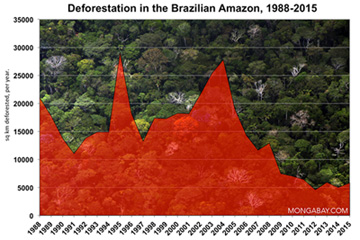 WWF criticizes Brazil’s plan to cut Amazon deforestation WWF knocks Brazil’s plan to cut Amazon deforestation mongabay.com December 4, 2008
WWF criticizes Brazil’s plan to cut Amazon deforestation WWF knocks Brazil’s plan to cut Amazon deforestation mongabay.com December 4, 2008
REDD may harm forest people, alleges report
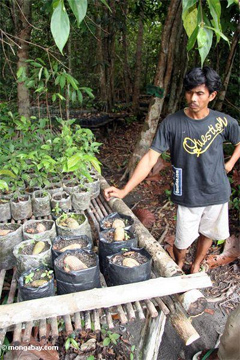 REDD is a threat to forest people, alleges report REDD may harm forest people, alleges report Rhett A. Butler, mongabay.com December 2, 2008
REDD is a threat to forest people, alleges report REDD may harm forest people, alleges report Rhett A. Butler, mongabay.com December 2, 2008
Guide to reducing emissions through forest conservation released
Guide to reducing emissions through forest conservation Guide to reducing emissions through forest conservation released mongabay.com November 26, 2008
Carbon market could pay poor farmers to adopt sustainable cultivation techniques
Carbon market could pay poor farmers to adopt sustainable cultivation techniques Carbon market could pay poor farmers to adopt sustainable cultivation techniques mongabay.com November 26, 2008
California joins effort to fight global warming by saving rainforests
 California joins effort to fight global warming by saving rainforests California joins effort to fight global warming by saving rainforests mongabay.com November 19, 2008
California joins effort to fight global warming by saving rainforests California joins effort to fight global warming by saving rainforests mongabay.com November 19, 2008
New rules establish market for saving rainforests through carbon trading
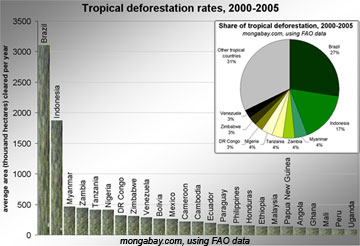 New rules establish market for saving rainforests through carbon trading New rules establish market for saving rainforests through carbon trading mongabay.com November 18, 2008
New rules establish market for saving rainforests through carbon trading New rules establish market for saving rainforests through carbon trading mongabay.com November 18, 2008
Coordinated effort needed to cut deforestation via carbon markets
Coordinated effort needed to cut deforestation via carbon markets Coordinated effort needed to cut deforestation via carbon markets mongabay.com November 18, 2008
Conflict in PNG between govt and landowners over REDD carbon trading
 Conflict in PNG between govt and landowners over REDD carbon trading Conflict in PNG between govt and landowners over REDD carbon trading mongabay.com November 17, 2008
Conflict in PNG between govt and landowners over REDD carbon trading Conflict in PNG between govt and landowners over REDD carbon trading mongabay.com November 17, 2008
Forests for Climate initiative launches in Indonesia
 Forests for Climate initiative launches in Indonesia Forests for Climate initiative launches in Indonesia mongabay.com November 5, 2008
Forests for Climate initiative launches in Indonesia Forests for Climate initiative launches in Indonesia mongabay.com November 5, 2008
Despite financial crunch, donors pledge $100M for rainforest conservation
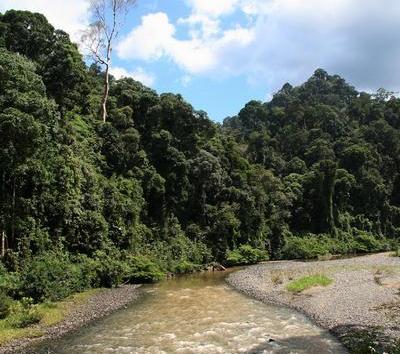 Despite financial chaos, donors pledge $100M for rainforest conservation Despite financial chaos, donors pledge $100M for rainforest conservation mongabay.com October 23, 2008
Despite financial chaos, donors pledge $100M for rainforest conservation Despite financial chaos, donors pledge $100M for rainforest conservation mongabay.com October 23, 2008
EU says emissions trading system may fund forest conservation
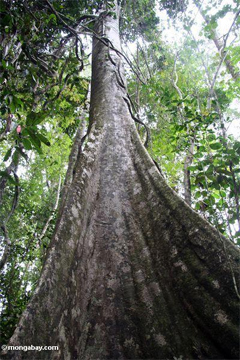 EU says emissions trading system may fund forest conservatio EU says emissions trading system may fund forest conservation mongabay.com October 17, 2008
EU says emissions trading system may fund forest conservatio EU says emissions trading system may fund forest conservation mongabay.com October 17, 2008
Carbon conservation schemes will fail without forest people
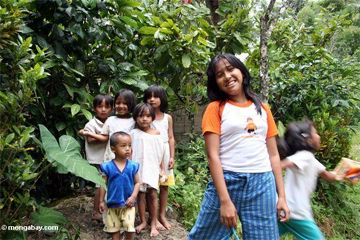 Mechanisms that use forest conservation to reduce greenhouse gas emissions are doomed to fail unless they are “based on respect for the rights of indigenous peoples and forest communities,” warn environmentalists and indigenous rights groups meeting in Oslo this week. Indigenous groups fear they are being excluded from discussions on Reduced Emissions from Deforestation and […]
Mechanisms that use forest conservation to reduce greenhouse gas emissions are doomed to fail unless they are “based on respect for the rights of indigenous peoples and forest communities,” warn environmentalists and indigenous rights groups meeting in Oslo this week. Indigenous groups fear they are being excluded from discussions on Reduced Emissions from Deforestation and […]
UK government: rainforests are weapon against global warming
 UK government: rainforests are weapon against global warming UK government: rainforests are weapon against global warming mongabay.com October 14, 2008 New report is avoided deforestation equivalent of the Stern Review on climate change
UK government: rainforests are weapon against global warming UK government: rainforests are weapon against global warming mongabay.com October 14, 2008 New report is avoided deforestation equivalent of the Stern Review on climate change
Exelon signs rainforest conservation deal to help reduce emissions
Exelon signs rainforest conservation deal to help reduce emissions Exelon signs rainforest conservation deal to help reduce emissions mongabay.com October 13, 2008
Indonesian governors agree to protect Sumatra’s endangered forests
 Indonesian governors agree to protect Sumatra’s endangered forests Indonesian governors agree to protect Sumatra’s endangered forests mongabay.com October 9, 2008
Indonesian governors agree to protect Sumatra’s endangered forests Indonesian governors agree to protect Sumatra’s endangered forests mongabay.com October 9, 2008
Indigenous people demand greater say in using forests to fight global warming
 Indigenous people demand greater say in using forests to fight global warming Indigenous people demand greater say in using forests to fight global warming mongabay.com October 8, 2008
Indigenous people demand greater say in using forests to fight global warming Indigenous people demand greater say in using forests to fight global warming mongabay.com October 8, 2008
Feeds: news | india | latam | brasil | indonesia
 This is the wrap-up article for our five-part series on forest carbon credits and the voluntary market. Read Part One, Part Two, Part Three, Part Four and Part Five. Mongabay recently published a five-part series on the carbon trade and its use as a tool to address climate change. The exchange of carbon credits, typically […]
This is the wrap-up article for our five-part series on forest carbon credits and the voluntary market. Read Part One, Part Two, Part Three, Part Four and Part Five. Mongabay recently published a five-part series on the carbon trade and its use as a tool to address climate change. The exchange of carbon credits, typically […] This is the wrap-up article for our four-part series “The Congo Basin peatlands.” Read Part One, Part Two, Part Three and Part Four. In the first half of December, Mongabay published a four-part series on the peatlands of the Congo Basin. Only in 2017 did a team of Congolese and British scientists discover that a […]
This is the wrap-up article for our four-part series “The Congo Basin peatlands.” Read Part One, Part Two, Part Three and Part Four. In the first half of December, Mongabay published a four-part series on the peatlands of the Congo Basin. Only in 2017 did a team of Congolese and British scientists discover that a […] Mayan women protest hydroelectric dam projects in Santa Cruz Barillas in western Guatemala on March 16, 2014. Local opposition to the construction of dams and other natural resource projects in the area has resulted in a government crackdown on activists. Photo credit: Luis Miranda Brugos / Alba Sud Fotografia. Thursdays are one of two visiting […]
Mayan women protest hydroelectric dam projects in Santa Cruz Barillas in western Guatemala on March 16, 2014. Local opposition to the construction of dams and other natural resource projects in the area has resulted in a government crackdown on activists. Photo credit: Luis Miranda Brugos / Alba Sud Fotografia. Thursdays are one of two visiting […] The Te Apiti wind farm in New Zealand was granted tradeable carbon offset credits when it was built in 2003/2004. Wind energy projects were popular in voluntary carbon markets in 2014. Photo credit: Jondaar_1. Nearly one billion carbon offset credits were voluntarily purchased over the past decade, which netted conservation and clean energy projects almost […]
The Te Apiti wind farm in New Zealand was granted tradeable carbon offset credits when it was built in 2003/2004. Wind energy projects were popular in voluntary carbon markets in 2014. Photo credit: Jondaar_1. Nearly one billion carbon offset credits were voluntarily purchased over the past decade, which netted conservation and clean energy projects almost […] Often misunderstood, REDD+ forest carbon offsets are a “must have” for any realistic climate-change mitigation strategy. Californians are known as innovation leaders, and once again, we are on the verge of demonstrating critical leadership. Only this time it isn’t about the Internet, social networking, reality television, venture capital or electric cars. It is about stopping […]
Often misunderstood, REDD+ forest carbon offsets are a “must have” for any realistic climate-change mitigation strategy. Californians are known as innovation leaders, and once again, we are on the verge of demonstrating critical leadership. Only this time it isn’t about the Internet, social networking, reality television, venture capital or electric cars. It is about stopping […] A panel of scientific experts has released a final report outlining how carbon credits generated from tropical forest conservation could be used under California’s cap-and-trade system while minimizing risks to forest-dependent communities and wildlife. The report comes after the working group spent three years gathering data and comments at public hearings and workshops in the […]
A panel of scientific experts has released a final report outlining how carbon credits generated from tropical forest conservation could be used under California’s cap-and-trade system while minimizing risks to forest-dependent communities and wildlife. The report comes after the working group spent three years gathering data and comments at public hearings and workshops in the […] The market for carbon credits generated from projects that reduce deforestation and forest degradation — a climate change mitigation approach known as REDD+ — dipped eight percent in 2012 according to an annual assessment of the global voluntary carbon market. The report, published by Ecosystem Marketplace and Bloomberg New Energy Finance and slated to be […]
The market for carbon credits generated from projects that reduce deforestation and forest degradation — a climate change mitigation approach known as REDD+ — dipped eight percent in 2012 according to an annual assessment of the global voluntary carbon market. The report, published by Ecosystem Marketplace and Bloomberg New Energy Finance and slated to be […] This is a response from Greenpeace to Dr. Daniel Nepstad’s critique of Greenpeace’s recent report on a carbon finance program being advanced by California and other subnational entities. His op-ed can be found at Commentary: Greenpeace report threatens climate change mitigation and tropical forests. Greenpeace is dedicated to ending deforestation and preventing catastrophic climate change. […]
This is a response from Greenpeace to Dr. Daniel Nepstad’s critique of Greenpeace’s recent report on a carbon finance program being advanced by California and other subnational entities. His op-ed can be found at Commentary: Greenpeace report threatens climate change mitigation and tropical forests. Greenpeace is dedicated to ending deforestation and preventing catastrophic climate change. […] California’s forest conservation-based carbon offsets in its climate change legislation may not lead to net reductions in greenhouse gas emissions and could exacerbate social conflict in places like southern Mexico, argues a report released Monday by Greenpeace. But the activist group faced sharp criticism from backers of California’s initiative. The report, titled Outsourcing Hot Air, […]
California’s forest conservation-based carbon offsets in its climate change legislation may not lead to net reductions in greenhouse gas emissions and could exacerbate social conflict in places like southern Mexico, argues a report released Monday by Greenpeace. But the activist group faced sharp criticism from backers of California’s initiative. The report, titled Outsourcing Hot Air, […] Leaf-tailed gecko in Madagascar. Photo by Rhett A. Butler Madagascar officially designated its largest protected area in a region renowned for its tropical rainforests and rich diversity of wildlife, including 20 species of lemurs, reports the Wildlife Conservation Society (WCS), a group that was instrumental in establishing the park. Makira Natural Park covers some 372,470 […]
Leaf-tailed gecko in Madagascar. Photo by Rhett A. Butler Madagascar officially designated its largest protected area in a region renowned for its tropical rainforests and rich diversity of wildlife, including 20 species of lemurs, reports the Wildlife Conservation Society (WCS), a group that was instrumental in establishing the park. Makira Natural Park covers some 372,470 […] Sumatran elephant in South Sumatra, Indonesia. Photo by Rhett A. Butler The voluntary carbon offset market reached a three-year high in 2011, according to the State of the Voluntary Carbon Markets report released this week. Volume hit $576 million in 2011, trailing only 2008 when $776 million in voluntary carbon credits where traded. Two-thirds of […]
Sumatran elephant in South Sumatra, Indonesia. Photo by Rhett A. Butler The voluntary carbon offset market reached a three-year high in 2011, according to the State of the Voluntary Carbon Markets report released this week. Volume hit $576 million in 2011, trailing only 2008 when $776 million in voluntary carbon credits where traded. Two-thirds of […] Observations of planet Earth from the Moderate Resolution Imaging Spectroradiometer (MODIS) on July 11, 2005. Photo by: NASA. Seventeen top scientists and four acclaimed conservation organizations have called for radical action to create a better world for this and future generations. Compiled by 21 past winners of the prestigious Blue Planet Prize, a new paper […]
Observations of planet Earth from the Moderate Resolution Imaging Spectroradiometer (MODIS) on July 11, 2005. Photo by: NASA. Seventeen top scientists and four acclaimed conservation organizations have called for radical action to create a better world for this and future generations. Compiled by 21 past winners of the prestigious Blue Planet Prize, a new paper […] Male lion in the Okavango Delta. © National Geographic Entertainment. Photo by: Rhett A. Butler. Now that California’s carbon market has arrived, an Australian-based company that specializes in forest carbon offsets has jump started two forest projects with private landowners in the western U.S. The new company, Forest Carbon Partners, will make the projects available […]
Male lion in the Okavango Delta. © National Geographic Entertainment. Photo by: Rhett A. Butler. Now that California’s carbon market has arrived, an Australian-based company that specializes in forest carbon offsets has jump started two forest projects with private landowners in the western U.S. The new company, Forest Carbon Partners, will make the projects available […] Deforested peatlands in Indonesian Borneo. Indonesia has one of the world’s highest rates of deforestation currently. Photo by: Rhett A. Butler . If governments commit to an international program to save forests known as REDD+, deforestation could be nearly zero in less than a decade, argues the Living Forests Report from the World Wide Fund […]
Deforested peatlands in Indonesian Borneo. Indonesia has one of the world’s highest rates of deforestation currently. Photo by: Rhett A. Butler . If governments commit to an international program to save forests known as REDD+, deforestation could be nearly zero in less than a decade, argues the Living Forests Report from the World Wide Fund […] The forest organization, FERN, has pulled its support from the Forest Stewardship Council (FSC), reports FSC-Watch. FERN has quit the increasingly troubled organization due to FSC pursuing carbon credits through forestry. The FSC loses FERN just weeks before its 6th General Assembly, in which FSC partners—including private corporations and some environmental groups—will meet to debate […]
The forest organization, FERN, has pulled its support from the Forest Stewardship Council (FSC), reports FSC-Watch. FERN has quit the increasingly troubled organization due to FSC pursuing carbon credits through forestry. The FSC loses FERN just weeks before its 6th General Assembly, in which FSC partners—including private corporations and some environmental groups—will meet to debate […] Africa’s forests are fast diminishing to the detriment of climate, biodiversity, and millions of people of dependent on forest resources for their well-being. But is the full conservation of Africa’s forests necessary to mitigate global climate change and ensure environmental stability in Africa? A new report by The Forest Philanthropy Action Network (FPAN), a non-profit […]
Africa’s forests are fast diminishing to the detriment of climate, biodiversity, and millions of people of dependent on forest resources for their well-being. But is the full conservation of Africa’s forests necessary to mitigate global climate change and ensure environmental stability in Africa? A new report by The Forest Philanthropy Action Network (FPAN), a non-profit […] Forest temple in protected area in Thailand. Photo by: Katharine Sims. While few would question that conserving a certain percentage of land or water is good for society overall, it has long been believed that protected areas economically impoverish, rather than enrich, communities living adjacent to them. Many communities worldwide have protested against the establishment […]
Forest temple in protected area in Thailand. Photo by: Katharine Sims. While few would question that conserving a certain percentage of land or water is good for society overall, it has long been believed that protected areas economically impoverish, rather than enrich, communities living adjacent to them. Many communities worldwide have protested against the establishment […] Rainforest in West Kalimantan, Indonesia Avoided Deforestation Partners, a forest conservation group, has coordinated the development of an “open source” forest carbon accounting methodology that could help speed projects aiming to reduce greenhouse gas emissions from deforestation and degradation. The group says the new protocols could substantially reduce the cost of establishing forest carbon conservation […]
Rainforest in West Kalimantan, Indonesia Avoided Deforestation Partners, a forest conservation group, has coordinated the development of an “open source” forest carbon accounting methodology that could help speed projects aiming to reduce greenhouse gas emissions from deforestation and degradation. The group says the new protocols could substantially reduce the cost of establishing forest carbon conservation […] The European Union temporarily shut down its carbon market after a security breach, reports Point Carbon. The European Commission suspended most of its Emissions Trading Scheme following the disclosure of a theft of 475,000 E.U. carbon dioxide emissions allowances (EUAs) from the Czech Republic’s carbon registry. The EUAs, worth around 7 million euros, were transferred […]
The European Union temporarily shut down its carbon market after a security breach, reports Point Carbon. The European Commission suspended most of its Emissions Trading Scheme following the disclosure of a theft of 475,000 E.U. carbon dioxide emissions allowances (EUAs) from the Czech Republic’s carbon registry. The EUAs, worth around 7 million euros, were transferred […] A shorter version of this article appears on Yale e360 as Indonesia’s Corruption Legacy Clouds a Forest Protection Plan. The version that appears below was last revised on October 31, 2010. Flying in a plane over the Indonesian half of the island of New Guinea, rainforest stretches like a sea of green, broken only by […]
A shorter version of this article appears on Yale e360 as Indonesia’s Corruption Legacy Clouds a Forest Protection Plan. The version that appears below was last revised on October 31, 2010. Flying in a plane over the Indonesian half of the island of New Guinea, rainforest stretches like a sea of green, broken only by […] The California Air Resources Board voted 9-1 to adopt cap and trade regulations for AB32, California’s 2006 climate law. The move, which establishes the first compliance carbon trading system in the United States, opens the door for carbon offsets generated via forest conservation projects. The new rules will allow polluting industries to buy and sell […]
The California Air Resources Board voted 9-1 to adopt cap and trade regulations for AB32, California’s 2006 climate law. The move, which establishes the first compliance carbon trading system in the United States, opens the door for carbon offsets generated via forest conservation projects. The new rules will allow polluting industries to buy and sell […] Funds ostensibly set aside to reward tropical countries for protecting their rainforests are being held up, threatening to exhaust the political capital needed to advance the proposed reducing emissions from deforestation and degradation (REDD) mechanism before it even gets off the ground, warned the president of Guyana during a lively panel organized by Avoided Deforestation […]
Funds ostensibly set aside to reward tropical countries for protecting their rainforests are being held up, threatening to exhaust the political capital needed to advance the proposed reducing emissions from deforestation and degradation (REDD) mechanism before it even gets off the ground, warned the president of Guyana during a lively panel organized by Avoided Deforestation […] In his concession speech after the 2010 mid-term elections, President Obama said that prospects for meaningful U.S. climate change legislation are doubtful and will be for years. With the US and the international community unable to take even modest steps to combat global warming, the State of California has stepped up in a big, big […]
In his concession speech after the 2010 mid-term elections, President Obama said that prospects for meaningful U.S. climate change legislation are doubtful and will be for years. With the US and the international community unable to take even modest steps to combat global warming, the State of California has stepped up in a big, big […] California and other states launched an international initiative that will work toward reducing greenhouse gas emissions and transitioning toward a low carbon economy in the absence of a global climate deal. Meeting at the University of California, Davis, near Sacramento, leaders of states across several countries agreed to fast-track “the development of clean technologies, climate […]
California and other states launched an international initiative that will work toward reducing greenhouse gas emissions and transitioning toward a low carbon economy in the absence of a global climate deal. Meeting at the University of California, Davis, near Sacramento, leaders of states across several countries agreed to fast-track “the development of clean technologies, climate […] Plantations on peatlands will no longer be supported by the Clean Development Mechanism (CDM), a framework for industrialized countries to reduce their emissions via projects in developing countries, reports Wetlands International. The decision, which came last Friday during the executive board meeting, will bar biofuel plantations established on peatlands from earning carbon credits that could […]
Plantations on peatlands will no longer be supported by the Clean Development Mechanism (CDM), a framework for industrialized countries to reduce their emissions via projects in developing countries, reports Wetlands International. The decision, which came last Friday during the executive board meeting, will bar biofuel plantations established on peatlands from earning carbon credits that could […] Proyek konservasi hutan yang didukung oleh Shell, Gazprom Market and Trading dan Clinton Foundation di Pulau Borneo telah memenangkan persetujuan di bawah standar perhitungan karbon, menurut laporan Reuters. Proyek Rimba Raya, yang mencakup hampir 100.000 ha (250.000 akre) hutan gambut di propinsi Kalimantan Tengah Indonesia, dapat mengurangi emisi yang diperkirakan hingga 75 juta ton metrik […]
Proyek konservasi hutan yang didukung oleh Shell, Gazprom Market and Trading dan Clinton Foundation di Pulau Borneo telah memenangkan persetujuan di bawah standar perhitungan karbon, menurut laporan Reuters. Proyek Rimba Raya, yang mencakup hampir 100.000 ha (250.000 akre) hutan gambut di propinsi Kalimantan Tengah Indonesia, dapat mengurangi emisi yang diperkirakan hingga 75 juta ton metrik […] A forest conservation project backed by Shell, Gazprom Market and Trading and the Clinton Foundation on the island of Borneo has won approval under a carbon accounting standard, reports Reuters. The Rimba Raya project, which covers nearly 100,000 ha (250,000 acres) of peat forest in Indonesia’s Central Kalimantan province, could reduce projected emissions by 75 […]
A forest conservation project backed by Shell, Gazprom Market and Trading and the Clinton Foundation on the island of Borneo has won approval under a carbon accounting standard, reports Reuters. The Rimba Raya project, which covers nearly 100,000 ha (250,000 acres) of peat forest in Indonesia’s Central Kalimantan province, could reduce projected emissions by 75 […] A new study in Ecological Management & Restoration has found that reforesting rainforest captures more carbon than monoculture plantation and even mixed species plantations. The research tested three projects in north-eastern Australia: a rainforest reforesting project using a variety of native trees, a mixed species plantation, and a monoculture plantation of conifers. “Compared to the […]
A new study in Ecological Management & Restoration has found that reforesting rainforest captures more carbon than monoculture plantation and even mixed species plantations. The research tested three projects in north-eastern Australia: a rainforest reforesting project using a variety of native trees, a mixed species plantation, and a monoculture plantation of conifers. “Compared to the […] Scientists convening in Bali expressed a range of concerns over a proposed mechanism for mitigating climate change through forest conservation, but some remained hopeful the idea could deliver long-term protection to forests, ease the transition to a low-carbon economy, and generate benefits to forest-dependent people. Presenting at the annual Association for Tropical Biology and Conservation, […]
Scientists convening in Bali expressed a range of concerns over a proposed mechanism for mitigating climate change through forest conservation, but some remained hopeful the idea could deliver long-term protection to forests, ease the transition to a low-carbon economy, and generate benefits to forest-dependent people. Presenting at the annual Association for Tropical Biology and Conservation, […] Not surprisingly, a US report released last week which argued that saving forests abroad will help US agricultural producers by reducing international competition has raised hackles in tropical forest counties. The report, commissioned by Avoided Deforestation Partners, a US group pushing for including tropical forest conservation in US climate policy, and the National Farmers Union, […]
Not surprisingly, a US report released last week which argued that saving forests abroad will help US agricultural producers by reducing international competition has raised hackles in tropical forest counties. The report, commissioned by Avoided Deforestation Partners, a US group pushing for including tropical forest conservation in US climate policy, and the National Farmers Union, […] Wawancara dengan Agus Purnomo dan Yani Saloh, Asisten Khusus Presiden Republik Indonesia untuk Perubahan Iklim. Akhir tahun lalu, Indonesia membuat berita di dunia dengan janji yang berani untuk mengurangi penggundulan hutan, yang menghabiskan hampir 28 juta hektar (108 mil persegi) hutan antara tahun 1990 dan 2005 dan merupakan sumber sekitar 80 persen dari emisi gas […]
Wawancara dengan Agus Purnomo dan Yani Saloh, Asisten Khusus Presiden Republik Indonesia untuk Perubahan Iklim. Akhir tahun lalu, Indonesia membuat berita di dunia dengan janji yang berani untuk mengurangi penggundulan hutan, yang menghabiskan hampir 28 juta hektar (108 mil persegi) hutan antara tahun 1990 dan 2005 dan merupakan sumber sekitar 80 persen dari emisi gas […] Battered by a faltering world economy and lack of progress on U.S. climate legislation, voluntary carbon markets declined by nearly every measure in 2009, according to the fourth annual State of the Voluntary Carbon Market Report issued today by Ecosystem Marketplace and Bloomberg New Energy Finance. The report recorded a 26 percent drop in transactions […]
Battered by a faltering world economy and lack of progress on U.S. climate legislation, voluntary carbon markets declined by nearly every measure in 2009, according to the fourth annual State of the Voluntary Carbon Market Report issued today by Ecosystem Marketplace and Bloomberg New Energy Finance. The report recorded a 26 percent drop in transactions […] An interview with Agus Purnomo and Yani Saloh, Special Assistants to the President of the Republic of Indonesia for Climate Change. Late last year Indonesia made global headlines with a bold pledge to reduce deforestation, which claimed nearly 28 million hectares (108,000 square miles) of forest between 1990 and 2005 and is the source of […]
An interview with Agus Purnomo and Yani Saloh, Special Assistants to the President of the Republic of Indonesia for Climate Change. Late last year Indonesia made global headlines with a bold pledge to reduce deforestation, which claimed nearly 28 million hectares (108,000 square miles) of forest between 1990 and 2005 and is the source of […] Liberian President Ellen Johnson Sirleaf established a commission investigate a proposed forest carbon credit deal between the West African nation’s Forest Development Authority (FDA) and UK-based Carbon Harvesting Corporation, reports Global Witness, an NGO that originally raised concerns about the scheme, which aimed to secure around a fifth of Liberia’s total forest area — 400,000 […]
Liberian President Ellen Johnson Sirleaf established a commission investigate a proposed forest carbon credit deal between the West African nation’s Forest Development Authority (FDA) and UK-based Carbon Harvesting Corporation, reports Global Witness, an NGO that originally raised concerns about the scheme, which aimed to secure around a fifth of Liberia’s total forest area — 400,000 […] The government of Indonesia has named four forests which could serve as pilot projects for its conservation deal with Norway, according to the Jakarta Post. The deal, including a billion US dollar donation from Norway, is meant to help Indonesia stem rampant deforestation throughout the nation, which has pushed Indonesia to become the world’s third […]
The government of Indonesia has named four forests which could serve as pilot projects for its conservation deal with Norway, according to the Jakarta Post. The deal, including a billion US dollar donation from Norway, is meant to help Indonesia stem rampant deforestation throughout the nation, which has pushed Indonesia to become the world’s third […] Sebagai pemilik salah satu tingkat tertinggi penggundulan hutan di dunia, emisi ketiga terbesar di dunia sebagian besar karena hilangnya hutan, dan kekayaan keragaman hayati yang berjuang untuk bertahan hidup di tengah-tengah hilangnya habitat skala besar, Indonesia hari ini mengumumkan perjanjian yang mungkin saja menjadi awal dari penghentian hilangnya hutan di negata Asia Tenggara. Indonesia mengumumkan […]
Sebagai pemilik salah satu tingkat tertinggi penggundulan hutan di dunia, emisi ketiga terbesar di dunia sebagian besar karena hilangnya hutan, dan kekayaan keragaman hayati yang berjuang untuk bertahan hidup di tengah-tengah hilangnya habitat skala besar, Indonesia hari ini mengumumkan perjanjian yang mungkin saja menjadi awal dari penghentian hilangnya hutan di negata Asia Tenggara. Indonesia mengumumkan […] Radical, controversial, ahead-of-his-time, brilliant, or extremist: call Dr. Glen Barry, the head of Ecological Internet, what you will, but there is no question that his environmental advocacy group has achieved major successes in the past years, even if many of these are below the radar of big conservation groups and mainstream media. “We tend to […]
Radical, controversial, ahead-of-his-time, brilliant, or extremist: call Dr. Glen Barry, the head of Ecological Internet, what you will, but there is no question that his environmental advocacy group has achieved major successes in the past years, even if many of these are below the radar of big conservation groups and mainstream media. “We tend to […] Hingga saat ini, menyelamatkan hutan hujan seperti sebuah misi yang mustahil. Namun saat ini dunia telah mulai menerima ide bahwa solusi yang ditawarkan untuk membantu menghadapi perubahan iklim dapat memberikan tawaran cara baru dengan memunculkan nilai hutan tanpa menebanginya. CATATAN: Lihat Bigg REDDuntuk membaca konsep dengan lebih ringkas. Jauh di dalam Amazon Brazil, anggota suku […]
Hingga saat ini, menyelamatkan hutan hujan seperti sebuah misi yang mustahil. Namun saat ini dunia telah mulai menerima ide bahwa solusi yang ditawarkan untuk membantu menghadapi perubahan iklim dapat memberikan tawaran cara baru dengan memunculkan nilai hutan tanpa menebanginya. CATATAN: Lihat Bigg REDDuntuk membaca konsep dengan lebih ringkas. Jauh di dalam Amazon Brazil, anggota suku […] With one of the highest rates of deforestation in the world, the world’s third largest greenhouse gas emissions due mostly to forest loss, and with a rich biodiversity that is fighting to survive amid large-scale habitat loss, Indonesia today announced a deal that may be the beginning of stopping forest loss in the Southeast Asian […]
With one of the highest rates of deforestation in the world, the world’s third largest greenhouse gas emissions due mostly to forest loss, and with a rich biodiversity that is fighting to survive amid large-scale habitat loss, Indonesia today announced a deal that may be the beginning of stopping forest loss in the Southeast Asian […] An interview with Michael Jenkins, President and CEO of Forest Trends Over the past 30 years billions of dollars has been committed to global conservation efforts, yet forests continue to fall, largely a consequence of economic drivers, including surging global demand for food and fuel. With consumption expected to far outstrip population growth due to […]
An interview with Michael Jenkins, President and CEO of Forest Trends Over the past 30 years billions of dollars has been committed to global conservation efforts, yet forests continue to fall, largely a consequence of economic drivers, including surging global demand for food and fuel. With consumption expected to far outstrip population growth due to […] Guyana has banned gold dredging in the Rewa Head region of the South American country after pressure from Amerindian communities. A recent expedition to Rewa Head turned up unspoiled wilderness and mind-boggling biodiversity. The researchers, in just six weeks, stumbled on the world’s largest snake (anaconda), spider (the aptly named goliath bird-eating spider), armadillo (the […]
Guyana has banned gold dredging in the Rewa Head region of the South American country after pressure from Amerindian communities. A recent expedition to Rewa Head turned up unspoiled wilderness and mind-boggling biodiversity. The researchers, in just six weeks, stumbled on the world’s largest snake (anaconda), spider (the aptly named goliath bird-eating spider), armadillo (the […] James Hansen, one of the world’s foremost climatologists, told the Guardian today that he believes the Copenhagen talks are flawed to the point where failure of the talks may be the best way forward. “The approach that is being talked about is so fundamentally wrong that it would be better to reassess,” Hansen said. Hansen […]
James Hansen, one of the world’s foremost climatologists, told the Guardian today that he believes the Copenhagen talks are flawed to the point where failure of the talks may be the best way forward. “The approach that is being talked about is so fundamentally wrong that it would be better to reassess,” Hansen said. Hansen […] Study focuses on beef and soybean production at the expense of the Amazon rainforest. Under the Kyoto Protocol the nation that produces carbon emission takes responsibility for them, but what about when the country is producing carbon-intensive goods for consumer demand beyond its borders? For example while China is now the world’s highest carbon emitter, […]
Study focuses on beef and soybean production at the expense of the Amazon rainforest. Under the Kyoto Protocol the nation that produces carbon emission takes responsibility for them, but what about when the country is producing carbon-intensive goods for consumer demand beyond its borders? For example while China is now the world’s highest carbon emitter, […] A new report states that boreal forests store nearly twice as much carbon as tropical forests per hectare: a fact which researchers say should make the conservation of boreal forests as important as tropical in climate change negotiations. The report from the Canadian Boreal Initiative and the Boreal Songbird Initiative, entitled “The Carbon the World […]
A new report states that boreal forests store nearly twice as much carbon as tropical forests per hectare: a fact which researchers say should make the conservation of boreal forests as important as tropical in climate change negotiations. The report from the Canadian Boreal Initiative and the Boreal Songbird Initiative, entitled “The Carbon the World […] Ecuador’s Yasuni National Park is full of wealth: it is one of the richest places on earth in terms of biodiversity; it is home to the indigenous Waorani people, as well as several uncontacted tribes; and the park’s forest and soil provides a massive carbon sink. However, Yasuni National Park also sits on wealth of […]
Ecuador’s Yasuni National Park is full of wealth: it is one of the richest places on earth in terms of biodiversity; it is home to the indigenous Waorani people, as well as several uncontacted tribes; and the park’s forest and soil provides a massive carbon sink. However, Yasuni National Park also sits on wealth of […] With the world facing global warming and a biodiversity crisis, a new study in Conservation Biology shows that within 15 years logged forests—considered by many to be ‘degraded’—can be managed in order to successfully fight both climate change and extinction. Studying regenerating forests in northeast Borneo, Dr. David Edwards from the University of Leeds, surveyed […]
With the world facing global warming and a biodiversity crisis, a new study in Conservation Biology shows that within 15 years logged forests—considered by many to be ‘degraded’—can be managed in order to successfully fight both climate change and extinction. Studying regenerating forests in northeast Borneo, Dr. David Edwards from the University of Leeds, surveyed […] Curtailing tropical deforestation is vital to U.S. national interests as a cost-effective means to slow climate change, argues a new report issued by the bipartisan Commission on Climate and Tropical Forests. Deforestation accounts for more than a sixth of global carbon dioxide emissions, more than the entire transportation sector. The report, titled “Protecting the Climate […]
Curtailing tropical deforestation is vital to U.S. national interests as a cost-effective means to slow climate change, argues a new report issued by the bipartisan Commission on Climate and Tropical Forests. Deforestation accounts for more than a sixth of global carbon dioxide emissions, more than the entire transportation sector. The report, titled “Protecting the Climate […] U.S. Starts Small in Developing Domestic Forestry Have you ever found yourself wondering what your backyard is worth in carbon? It may seem like a silly question – especially when deforestation in rainforest nations with millions of acres of tropical forest are spewing more CO2 into the atmosphere than any single industry – but small-scale […]
U.S. Starts Small in Developing Domestic Forestry Have you ever found yourself wondering what your backyard is worth in carbon? It may seem like a silly question – especially when deforestation in rainforest nations with millions of acres of tropical forest are spewing more CO2 into the atmosphere than any single industry – but small-scale […] The Voluntary Carbon Standard (VCS) tops the rankings of a recent assessment gauging various standards for forestry carbon credits. The review, conducted by Paulo Lopes of Imperial College-London, found that VCS scores the best across a range of criteria to ensure that carbon credits are “real, verified, permanent, additional and unique”. Lopes also evaluated the […]
The Voluntary Carbon Standard (VCS) tops the rankings of a recent assessment gauging various standards for forestry carbon credits. The review, conducted by Paulo Lopes of Imperial College-London, found that VCS scores the best across a range of criteria to ensure that carbon credits are “real, verified, permanent, additional and unique”. Lopes also evaluated the […] Third in a series of interviews with participants at the 2009 Association of Tropical Biology and Conservation (ATBC) conference. In Madagascar the TAMS Program (Tetik’asa Mampody Savoka, meaning “the project to bring back the forest”) is under threat due to the new government’s unwillingness to provide funding. The current government, after gaining power in a […]
Third in a series of interviews with participants at the 2009 Association of Tropical Biology and Conservation (ATBC) conference. In Madagascar the TAMS Program (Tetik’asa Mampody Savoka, meaning “the project to bring back the forest”) is under threat due to the new government’s unwillingness to provide funding. The current government, after gaining power in a […] As the world’s biggest cattle producer, Brazil braces for change While you’re browsing the mall for running shoes, the Amazon rainforest is probably the farthest thing from your mind. Perhaps it shouldn’t be. The globalization of commodity supply chains has created links between consumer products and distant ecosystems like the Amazon. Shoes sold in downtown […]
As the world’s biggest cattle producer, Brazil braces for change While you’re browsing the mall for running shoes, the Amazon rainforest is probably the farthest thing from your mind. Perhaps it shouldn’t be. The globalization of commodity supply chains has created links between consumer products and distant ecosystems like the Amazon. Shoes sold in downtown […] Until now saving rainforests seemed like an impossible mission. But the world is now warming to the idea that a proposed solution to help address climate change could offer a new way to unlock the value of forest without cutting it down. NOTE: See Bigg REDD for a condensed take on this concept. Deep in […]
Until now saving rainforests seemed like an impossible mission. But the world is now warming to the idea that a proposed solution to help address climate change could offer a new way to unlock the value of forest without cutting it down. NOTE: See Bigg REDD for a condensed take on this concept. Deep in […] Indonesia has released revenue sharing rules for forest carbon projects, reports Reuters. According to a document released by the forestry ministry in Bahasa Indonesia (Indonesian) at dephut.go.id, the revenue-sharing depends on the type of forest ownership or permit, ranging from 10 to 50 percent for the government, 20 to 70 percent for local communities, and […]
Indonesia has released revenue sharing rules for forest carbon projects, reports Reuters. According to a document released by the forestry ministry in Bahasa Indonesia (Indonesian) at dephut.go.id, the revenue-sharing depends on the type of forest ownership or permit, ranging from 10 to 50 percent for the government, 20 to 70 percent for local communities, and […] A declaration issued by political leaders meeting at the G8 summit in L’Aquila, Italy, included a strong statement on the need to include forest conservation in a future climate agreement. Deforestation accounts for nearly 20 percent of global greenhouse gas emissions, a larger source of emissions than all the world’s cars, trucks, ships, and airplanes […]
A declaration issued by political leaders meeting at the G8 summit in L’Aquila, Italy, included a strong statement on the need to include forest conservation in a future climate agreement. Deforestation accounts for nearly 20 percent of global greenhouse gas emissions, a larger source of emissions than all the world’s cars, trucks, ships, and airplanes […] This is the first in a series of tropical forest policy commentaries John-O Niles will be writing for Mongabay.com leading up to the December U.N. climate meeting in Copenhagen. John-O is the Director of the Tropical Forest Group. In late 1991, I had just finished my undergraduate degree in forest economics at the University of […]
This is the first in a series of tropical forest policy commentaries John-O Niles will be writing for Mongabay.com leading up to the December U.N. climate meeting in Copenhagen. John-O is the Director of the Tropical Forest Group. In late 1991, I had just finished my undergraduate degree in forest economics at the University of […] The fate of millions of hectares of tropical forests will probably be sealed this year and next year, reports a new set of policy papers detailing an emerging climate change mitigation mechanism known as Reducing Emissions from Deforestation and Degradation (REDD). REDD has been proposed by the U.N. and other entities as a form of […]
The fate of millions of hectares of tropical forests will probably be sealed this year and next year, reports a new set of policy papers detailing an emerging climate change mitigation mechanism known as Reducing Emissions from Deforestation and Degradation (REDD). REDD has been proposed by the U.N. and other entities as a form of […] Leaders in business, government, advocacy, conservation, global development, science and national security have formed a commission to “provide bipartisan recommendations to Congress and the President about how to reduce tropical deforestation through U.S. climate change policies,” according to a statement released by the newly established group, named the Commission on Climate and Tropical Forests. Deforestation […]
Leaders in business, government, advocacy, conservation, global development, science and national security have formed a commission to “provide bipartisan recommendations to Congress and the President about how to reduce tropical deforestation through U.S. climate change policies,” according to a statement released by the newly established group, named the Commission on Climate and Tropical Forests. Deforestation […] A global framework on climate change must immediately halt deforestation and industrial logging of the world’s old-growth forests, while protecting the rights of forest communities and indigenous groups, said a broad coalition of activist groups in a consensus statement issued today at U.N. climate talks in Bonn Germany. The statement said the successor treaty to […]
A global framework on climate change must immediately halt deforestation and industrial logging of the world’s old-growth forests, while protecting the rights of forest communities and indigenous groups, said a broad coalition of activist groups in a consensus statement issued today at U.N. climate talks in Bonn Germany. The statement said the successor treaty to […] Brazil has its own designs for REDD Accounting for roughly half of tropical deforestation between 2000 and 2005, Brazil is the most important supply-side player when it comes to developing a climate framework that includes reducing emissions from deforestation and forest degradation (REDD). But Brazil’s position on REDD contrasts with proposals put forth by other […]
Brazil has its own designs for REDD Accounting for roughly half of tropical deforestation between 2000 and 2005, Brazil is the most important supply-side player when it comes to developing a climate framework that includes reducing emissions from deforestation and forest degradation (REDD). But Brazil’s position on REDD contrasts with proposals put forth by other […] Failure to develop policies that account for emissions from land use change will lead to widespread deforestation and higher costs for addressing climate change, warn researchers writing in the journal Science. Using a computer model that incorporates economics, energy, agriculture, land-use changes, emissions and concentrations of greenhouse gases, a team of researchers from the Department […]
Failure to develop policies that account for emissions from land use change will lead to widespread deforestation and higher costs for addressing climate change, warn researchers writing in the journal Science. Using a computer model that incorporates economics, energy, agriculture, land-use changes, emissions and concentrations of greenhouse gases, a team of researchers from the Department […] A group of leading U.S. businesses and environmental groups today formed a coalition calling for the inclusion of forest conservation in domestic cap-and-trade legislation. The pact — signed by American Electric Power, Conservation International, Duke Energy, Environmental Defense Fund, El Paso Corporation, National Wildlife Federation, Marriott International, Mercy Corps, Natural Resources Defense Council, PG&E Corporation, […]
A group of leading U.S. businesses and environmental groups today formed a coalition calling for the inclusion of forest conservation in domestic cap-and-trade legislation. The pact — signed by American Electric Power, Conservation International, Duke Energy, Environmental Defense Fund, El Paso Corporation, National Wildlife Federation, Marriott International, Mercy Corps, Natural Resources Defense Council, PG&E Corporation, […] Voluntary carbon markets greatly expanded in both transaction volume and value in 2008, providing critical funds for projects aiming to reduce greenhouse gas emissions, according to a new report from Ecosystem Marketplace and New Carbon Finance. Fortifying the Foundation: State of the Voluntary Carbon Markets 2009 — a survey of over 190 voluntary carbon credit […]
Voluntary carbon markets greatly expanded in both transaction volume and value in 2008, providing critical funds for projects aiming to reduce greenhouse gas emissions, according to a new report from Ecosystem Marketplace and New Carbon Finance. Fortifying the Foundation: State of the Voluntary Carbon Markets 2009 — a survey of over 190 voluntary carbon credit […] Yesterday the Obama Administration established a Biofuels Interagency Working Group to oversee implementation of new rules and research regarding biofuels. On the group’s first day they would do well to look at a new study in Science Magazine comparing the efficacy of ethanol versus bioelectricity. Researchers compared ethanol and bioelectricity in terms of miles per […]
Yesterday the Obama Administration established a Biofuels Interagency Working Group to oversee implementation of new rules and research regarding biofuels. On the group’s first day they would do well to look at a new study in Science Magazine comparing the efficacy of ethanol versus bioelectricity. Researchers compared ethanol and bioelectricity in terms of miles per […] Efforts to create an international climate framework — including a carbon financing mechanism for forest conservation — must involve forest people, said indigenous leaders attending the Indigenous Peoples Global Summit on Climate Change meeting this week in Anchorage, Alaska. Speaking at a press conference organized by The Nature Conservancy in connection with the Summit, Egberto […]
Efforts to create an international climate framework — including a carbon financing mechanism for forest conservation — must involve forest people, said indigenous leaders attending the Indigenous Peoples Global Summit on Climate Change meeting this week in Anchorage, Alaska. Speaking at a press conference organized by The Nature Conservancy in connection with the Summit, Egberto […] 91 percent of companies rated avoided deforestation as the most desirable forestry projects for carbon offsets, reports a survey by EcoSecurities, Conservation International, The Climate, Community & Biodiversity Alliance and ClimateBiz. The results suggest a healthy appetite for avoided deforestation credits among companies seeking to reduce their greenhouse gas emissions. “It’s tremendously encouraging to see […]
91 percent of companies rated avoided deforestation as the most desirable forestry projects for carbon offsets, reports a survey by EcoSecurities, Conservation International, The Climate, Community & Biodiversity Alliance and ClimateBiz. The results suggest a healthy appetite for avoided deforestation credits among companies seeking to reduce their greenhouse gas emissions. “It’s tremendously encouraging to see […] Carbon credits generated through forest conservation could provide a cost-effective way for U.S. companies to reduce their greenhouse gas emissions, business leaders were told at a meeting in Columbus, Ohio. The event, sponsored by The Nature Conservancy, is the first of several meetings to promote the potential benefits of forest conservation for U.S. business. “Forests […]
Carbon credits generated through forest conservation could provide a cost-effective way for U.S. companies to reduce their greenhouse gas emissions, business leaders were told at a meeting in Columbus, Ohio. The event, sponsored by The Nature Conservancy, is the first of several meetings to promote the potential benefits of forest conservation for U.S. business. “Forests […] Kenya has signed its first carbon deal to reduce emissions from deforestation and degradation (REDD). Yesterday San Francisco-based Wildlife Works Carbon and Kenya Forest Service (KFS) announced a plan to protect the 80,000-acre Rukinga forest reserve in southeastern Kenya. The project will be funded by sales of carbon credits in the voluntary carbon market. The […]
Kenya has signed its first carbon deal to reduce emissions from deforestation and degradation (REDD). Yesterday San Francisco-based Wildlife Works Carbon and Kenya Forest Service (KFS) announced a plan to protect the 80,000-acre Rukinga forest reserve in southeastern Kenya. The project will be funded by sales of carbon credits in the voluntary carbon market. The […] A proposed mechanism for reducing emissions from deforestation and degradation (REDD) figures prominently in the draft climate bill released last month by Congressmen Henry Waxman and Ed Markey as well as a U.N. document posted last week following a climate meeting in Bonn, Germany. Deforestation is the source of roughly 20 percent of greenhouse gas […]
A proposed mechanism for reducing emissions from deforestation and degradation (REDD) figures prominently in the draft climate bill released last month by Congressmen Henry Waxman and Ed Markey as well as a U.N. document posted last week following a climate meeting in Bonn, Germany. Deforestation is the source of roughly 20 percent of greenhouse gas […] Inclusion of forest conservation in a market-based mechanism for reducing greenhouse gas emissions would crash carbon prices by swamping the market with cheap credits, claims a new report from Greenpeace. The environmental group said low carbon prices would “derail global efforts to tackle global warming” and cause “developing countries losing out on billions of dollars […]
Inclusion of forest conservation in a market-based mechanism for reducing greenhouse gas emissions would crash carbon prices by swamping the market with cheap credits, claims a new report from Greenpeace. The environmental group said low carbon prices would “derail global efforts to tackle global warming” and cause “developing countries losing out on billions of dollars […] Reducing emissions from deforestation and degradation (REDD) is increasingly seen as a compelling way to conserve tropical forests while simultaneously helping mitigate climate change, preserving biodiversity, and providing sustainable livelihoods for rural people. But to become a reality REDD still faces a number of challenges, not least of which is economic competition from other forms […]
Reducing emissions from deforestation and degradation (REDD) is increasingly seen as a compelling way to conserve tropical forests while simultaneously helping mitigate climate change, preserving biodiversity, and providing sustainable livelihoods for rural people. But to become a reality REDD still faces a number of challenges, not least of which is economic competition from other forms […]




 Iron fertilization of oceans less effective in sequestering carbon than previously estimated
Iron fertilization of oceans less effective in sequestering carbon than previously estimated New guide offers insight on establishing projects for the emerging avoided deforestation or REDD market.
New guide offers insight on establishing projects for the emerging avoided deforestation or REDD market. Deal on forests falls short Deal on forests falls short Rhett A. Butler, mongabay.com December 11, 2008
Deal on forests falls short Deal on forests falls short Rhett A. Butler, mongabay.com December 11, 2008 Africa proposes its own solution to global warming Africa proposes its own solution to global warming Rhett A. Butler, mongabay.com December 10, 2008 African coalition calls for “full-range” of biocarbon as climate solution
Africa proposes its own solution to global warming Africa proposes its own solution to global warming Rhett A. Butler, mongabay.com December 10, 2008 African coalition calls for “full-range” of biocarbon as climate solution Indigenous people win voice in climate negotiations Indigenous people win voice in climate negotiations Rhett A. Butler, mongabay.com December 10, 2008
Indigenous people win voice in climate negotiations Indigenous people win voice in climate negotiations Rhett A. Butler, mongabay.com December 10, 2008 Finland, Sweden push for loophole that would drive destruction of peatlands around the world Finland, Sweden push for loophole that would drive destruction of peatlands around the world mongabay.com December 9, 2008
Finland, Sweden push for loophole that would drive destruction of peatlands around the world Finland, Sweden push for loophole that would drive destruction of peatlands around the world mongabay.com December 9, 2008 In Poznan, France pushes initiative to save rainforests In Poznan, France pushes initiative to save rainforests mongabay.com December 8, 2008
In Poznan, France pushes initiative to save rainforests In Poznan, France pushes initiative to save rainforests mongabay.com December 8, 2008 Peru seeks $200 million to cut deforestation to zero in 10 years Peru seeks $200 million to save its rainforests mongabay.com December 8, 2008
Peru seeks $200 million to cut deforestation to zero in 10 years Peru seeks $200 million to save its rainforests mongabay.com December 8, 2008 New standards ensure REDD projects protect forest people, biodiversity New standards ensure forest carbon projects protect indigenous people, biodiversity mongabay.com December 8, 2008
New standards ensure REDD projects protect forest people, biodiversity New standards ensure forest carbon projects protect indigenous people, biodiversity mongabay.com December 8, 2008 Little progress so far on avoided deforestation at climate meeting in Poland Little progress on avoided deforestation at climate meeting in Poland mongabay.com December 5, 2008
Little progress so far on avoided deforestation at climate meeting in Poland Little progress on avoided deforestation at climate meeting in Poland mongabay.com December 5, 2008 Salvage logging offers hope for forests, communities devastated by industrial logging An interview with Tropical Salvage’s Tim O’Brien Salvage logging offers hope for forests, communities devastated by industrial logging Rhett A. Butler, mongabay.com December 4, 2008
Salvage logging offers hope for forests, communities devastated by industrial logging An interview with Tropical Salvage’s Tim O’Brien Salvage logging offers hope for forests, communities devastated by industrial logging Rhett A. Butler, mongabay.com December 4, 2008 Rainforest canopy-penetrating technology gets boost for forest carbon monitoring Rainforest canopy-penetrating technology gets boost for forest carbon monitoring mongabay.com December 4, 2008
Rainforest canopy-penetrating technology gets boost for forest carbon monitoring Rainforest canopy-penetrating technology gets boost for forest carbon monitoring mongabay.com December 4, 2008 WWF criticizes Brazil’s plan to cut Amazon deforestation WWF knocks Brazil’s plan to cut Amazon deforestation mongabay.com December 4, 2008
WWF criticizes Brazil’s plan to cut Amazon deforestation WWF knocks Brazil’s plan to cut Amazon deforestation mongabay.com December 4, 2008 REDD is a threat to forest people, alleges report REDD may harm forest people, alleges report Rhett A. Butler, mongabay.com December 2, 2008
REDD is a threat to forest people, alleges report REDD may harm forest people, alleges report Rhett A. Butler, mongabay.com December 2, 2008 California joins effort to fight global warming by saving rainforests California joins effort to fight global warming by saving rainforests mongabay.com November 19, 2008
California joins effort to fight global warming by saving rainforests California joins effort to fight global warming by saving rainforests mongabay.com November 19, 2008 New rules establish market for saving rainforests through carbon trading New rules establish market for saving rainforests through carbon trading mongabay.com November 18, 2008
New rules establish market for saving rainforests through carbon trading New rules establish market for saving rainforests through carbon trading mongabay.com November 18, 2008 Conflict in PNG between govt and landowners over REDD carbon trading Conflict in PNG between govt and landowners over REDD carbon trading mongabay.com November 17, 2008
Conflict in PNG between govt and landowners over REDD carbon trading Conflict in PNG between govt and landowners over REDD carbon trading mongabay.com November 17, 2008 Forests for Climate initiative launches in Indonesia Forests for Climate initiative launches in Indonesia mongabay.com November 5, 2008
Forests for Climate initiative launches in Indonesia Forests for Climate initiative launches in Indonesia mongabay.com November 5, 2008 Despite financial chaos, donors pledge $100M for rainforest conservation Despite financial chaos, donors pledge $100M for rainforest conservation mongabay.com October 23, 2008
Despite financial chaos, donors pledge $100M for rainforest conservation Despite financial chaos, donors pledge $100M for rainforest conservation mongabay.com October 23, 2008 EU says emissions trading system may fund forest conservatio EU says emissions trading system may fund forest conservation mongabay.com October 17, 2008
EU says emissions trading system may fund forest conservatio EU says emissions trading system may fund forest conservation mongabay.com October 17, 2008 Mechanisms that use forest conservation to reduce greenhouse gas emissions are doomed to fail unless they are “based on respect for the rights of indigenous peoples and forest communities,” warn environmentalists and indigenous rights groups meeting in Oslo this week. Indigenous groups fear they are being excluded from discussions on Reduced Emissions from Deforestation and […]
Mechanisms that use forest conservation to reduce greenhouse gas emissions are doomed to fail unless they are “based on respect for the rights of indigenous peoples and forest communities,” warn environmentalists and indigenous rights groups meeting in Oslo this week. Indigenous groups fear they are being excluded from discussions on Reduced Emissions from Deforestation and […] UK government: rainforests are weapon against global warming UK government: rainforests are weapon against global warming mongabay.com October 14, 2008 New report is avoided deforestation equivalent of the Stern Review on climate change
UK government: rainforests are weapon against global warming UK government: rainforests are weapon against global warming mongabay.com October 14, 2008 New report is avoided deforestation equivalent of the Stern Review on climate change Indonesian governors agree to protect Sumatra’s endangered forests Indonesian governors agree to protect Sumatra’s endangered forests mongabay.com October 9, 2008
Indonesian governors agree to protect Sumatra’s endangered forests Indonesian governors agree to protect Sumatra’s endangered forests mongabay.com October 9, 2008 Indigenous people demand greater say in using forests to fight global warming Indigenous people demand greater say in using forests to fight global warming mongabay.com October 8, 2008
Indigenous people demand greater say in using forests to fight global warming Indigenous people demand greater say in using forests to fight global warming mongabay.com October 8, 2008